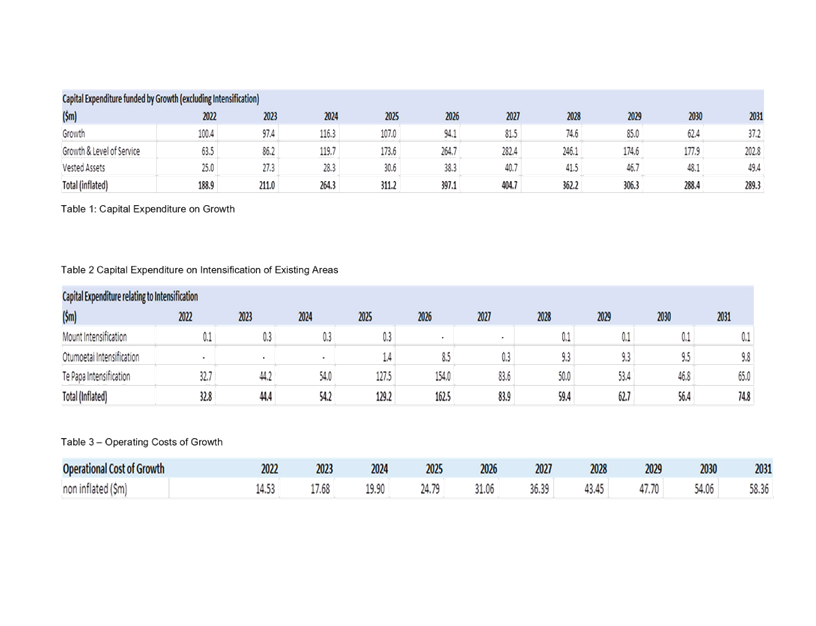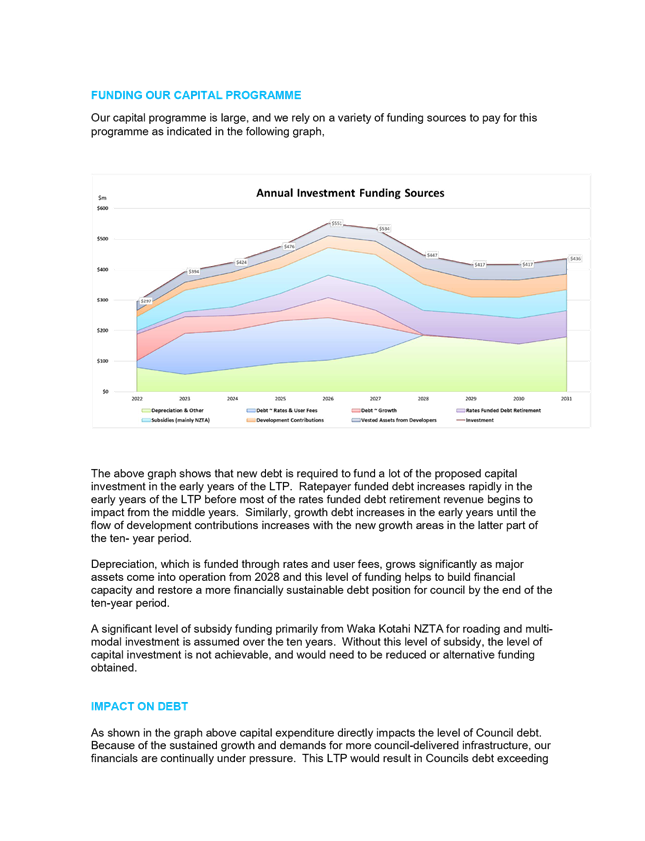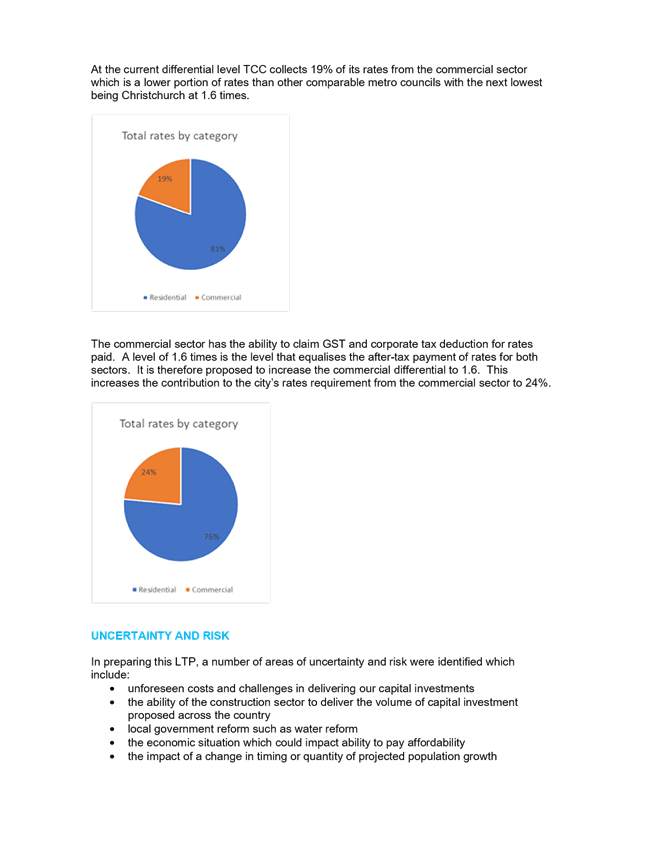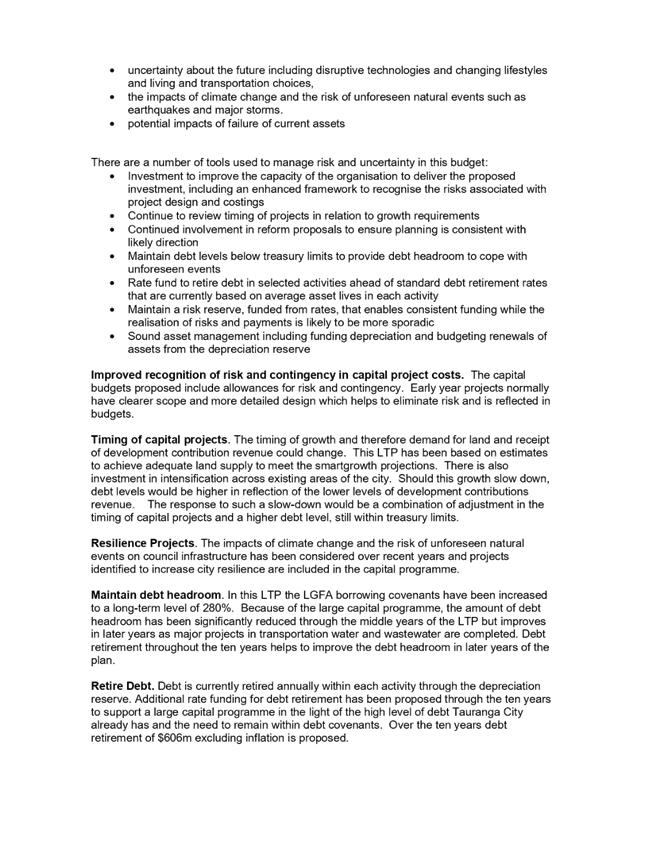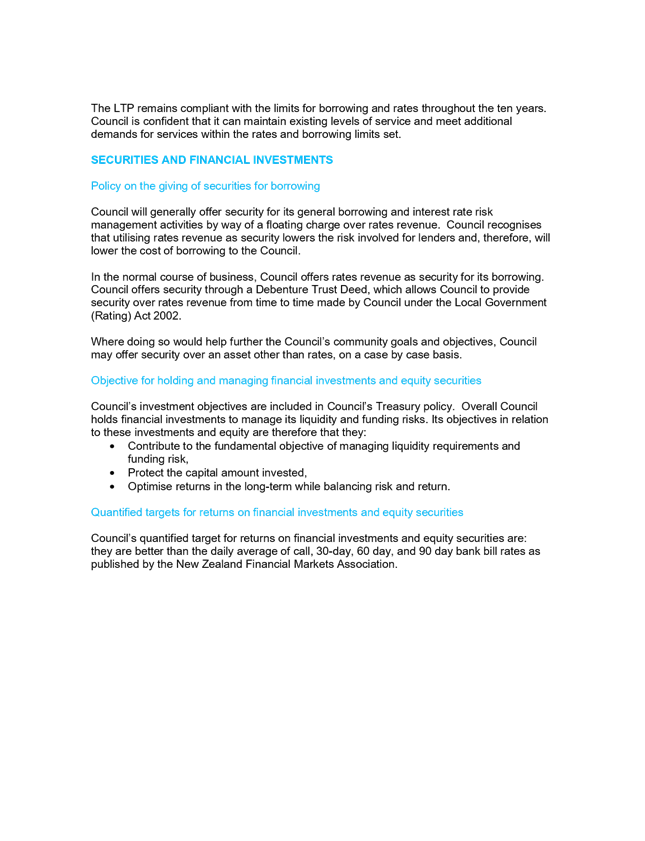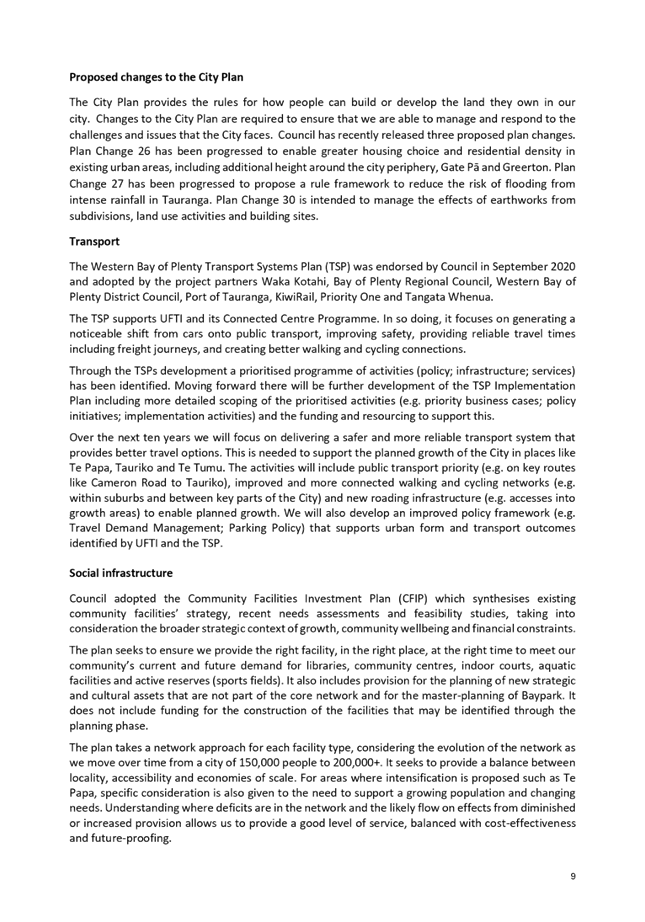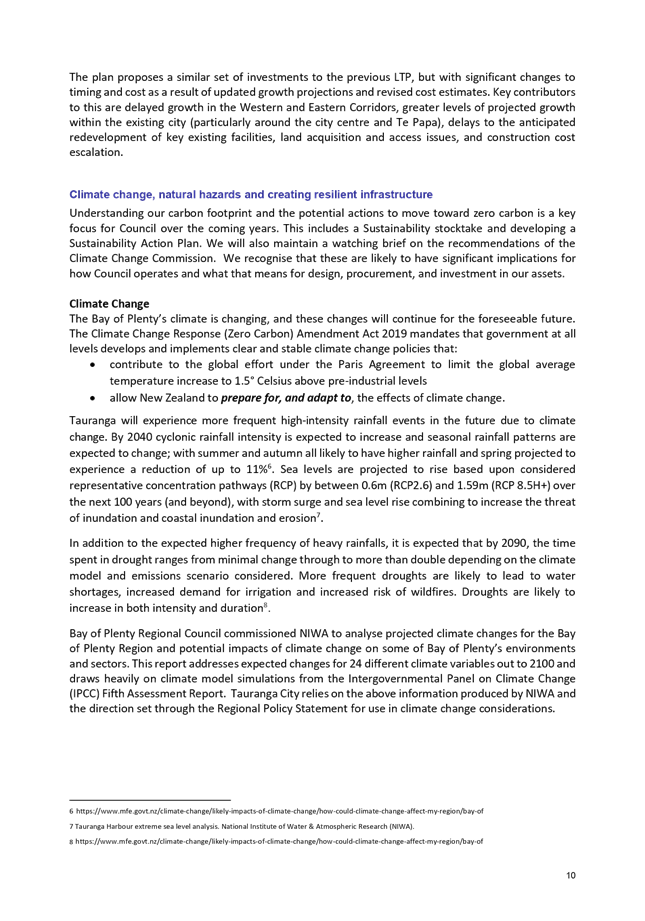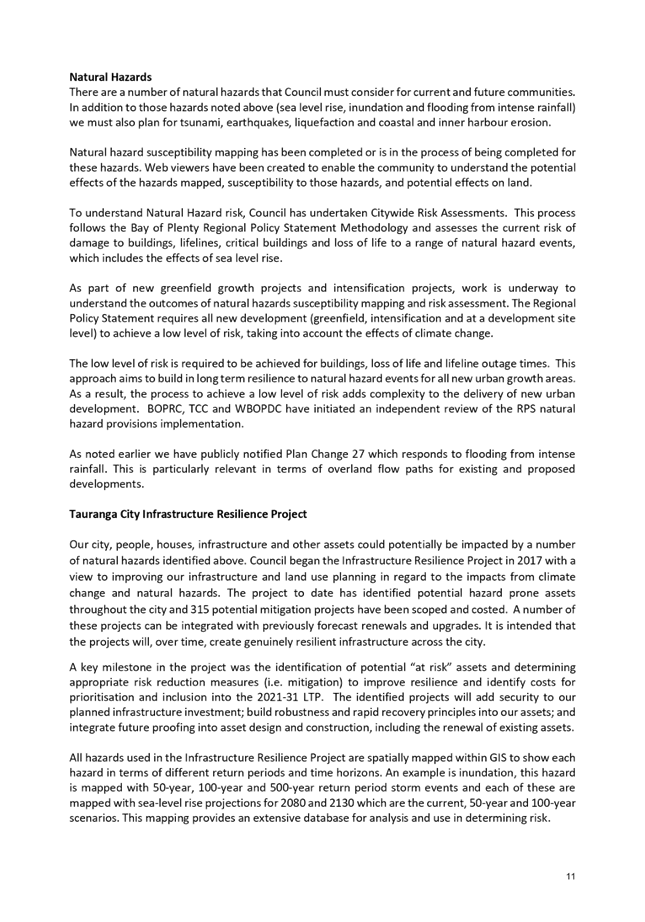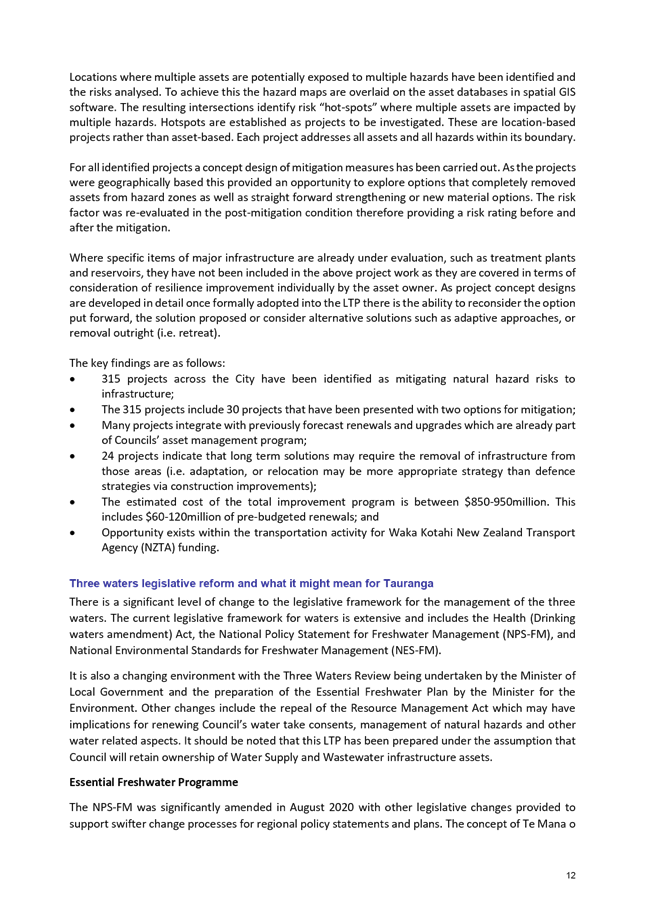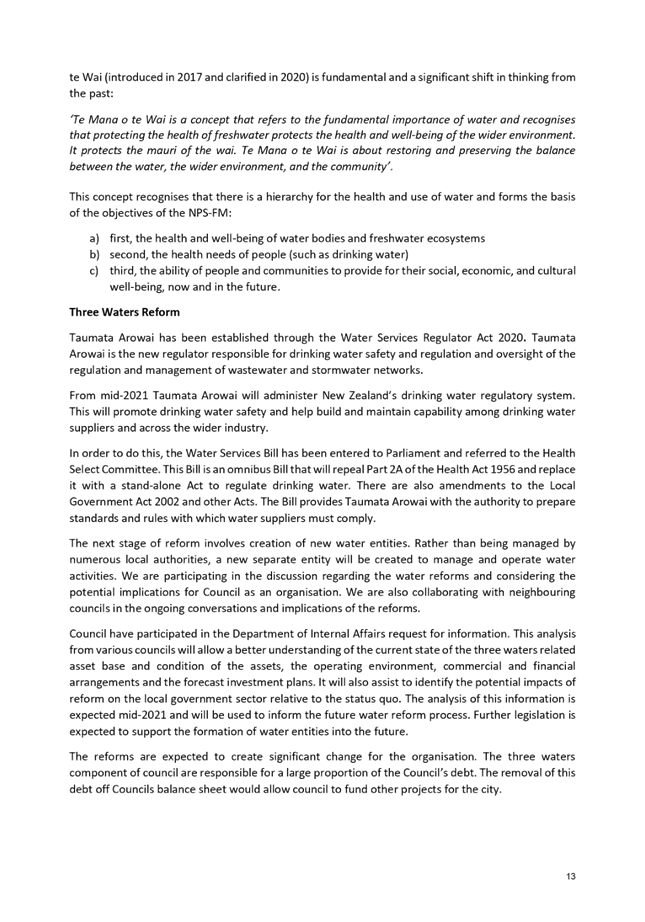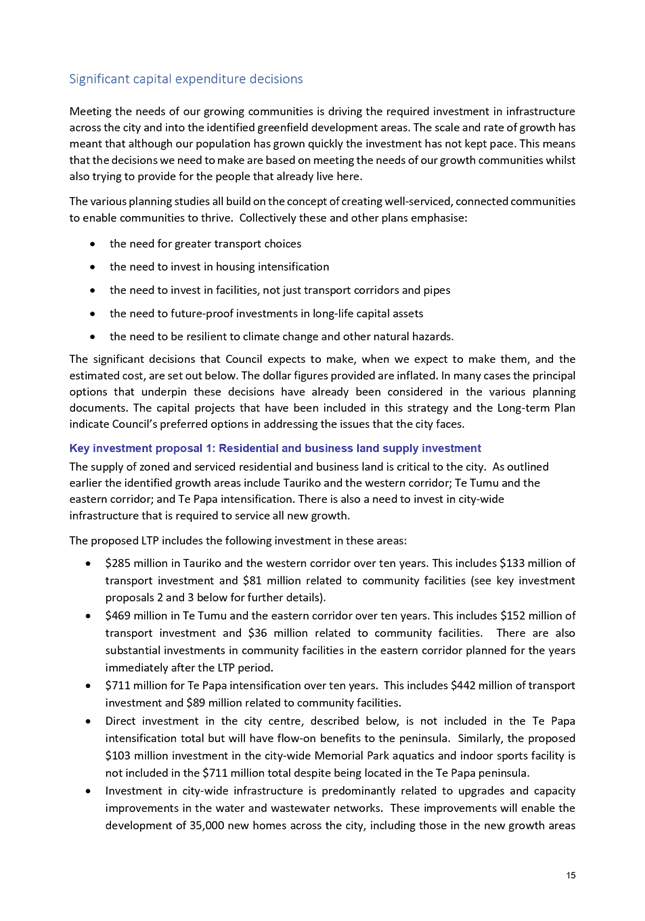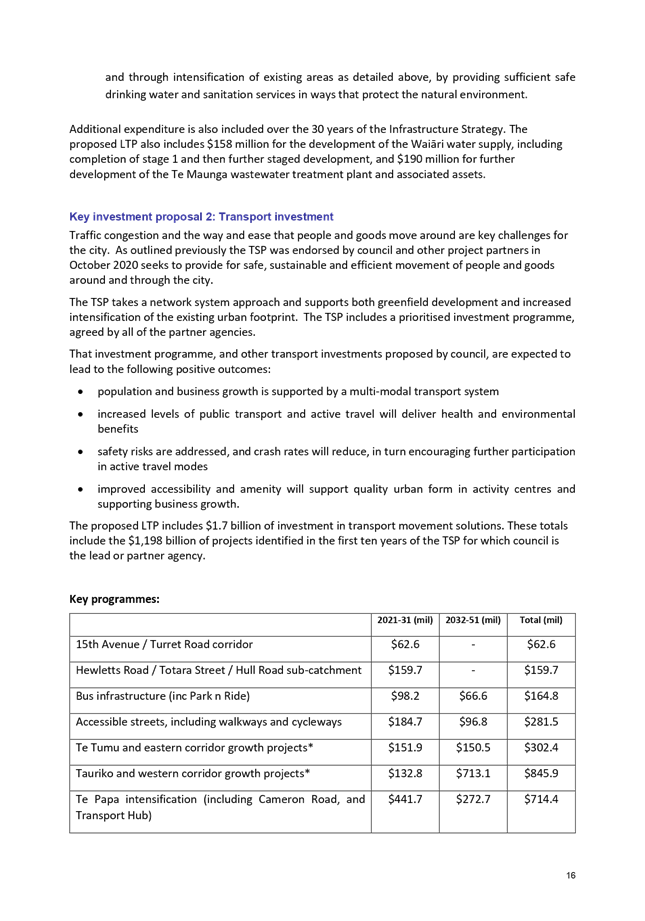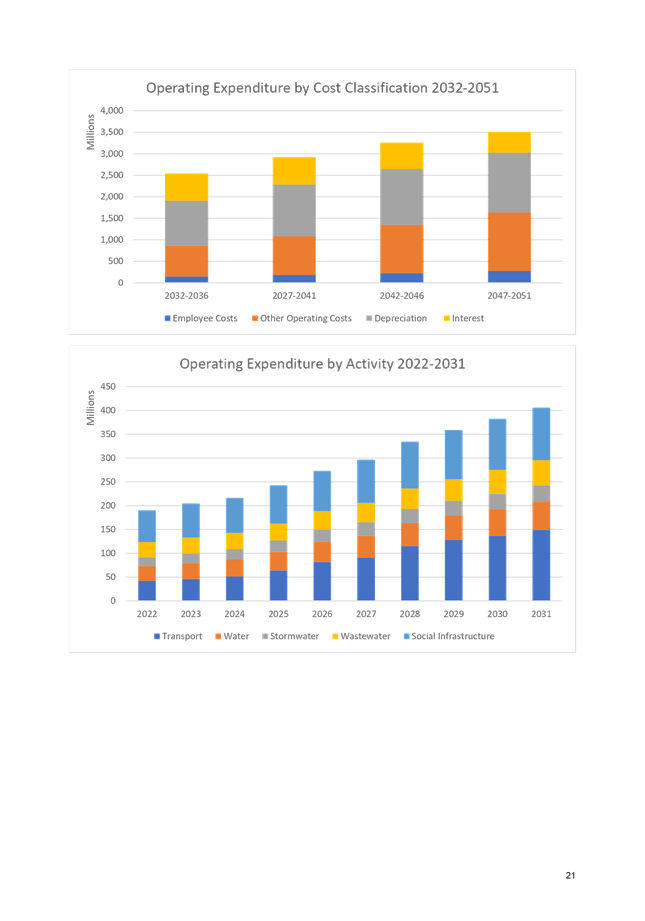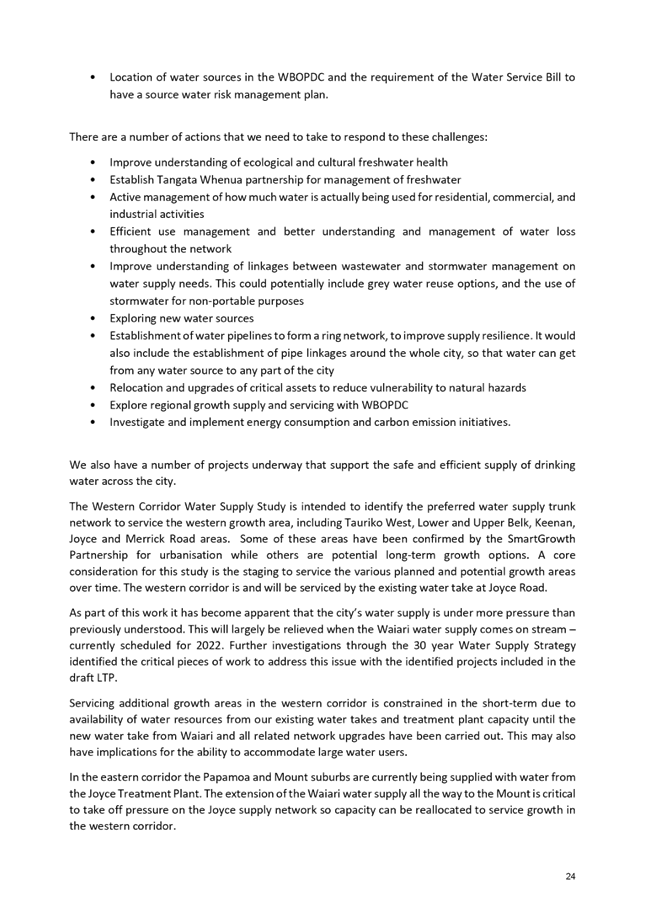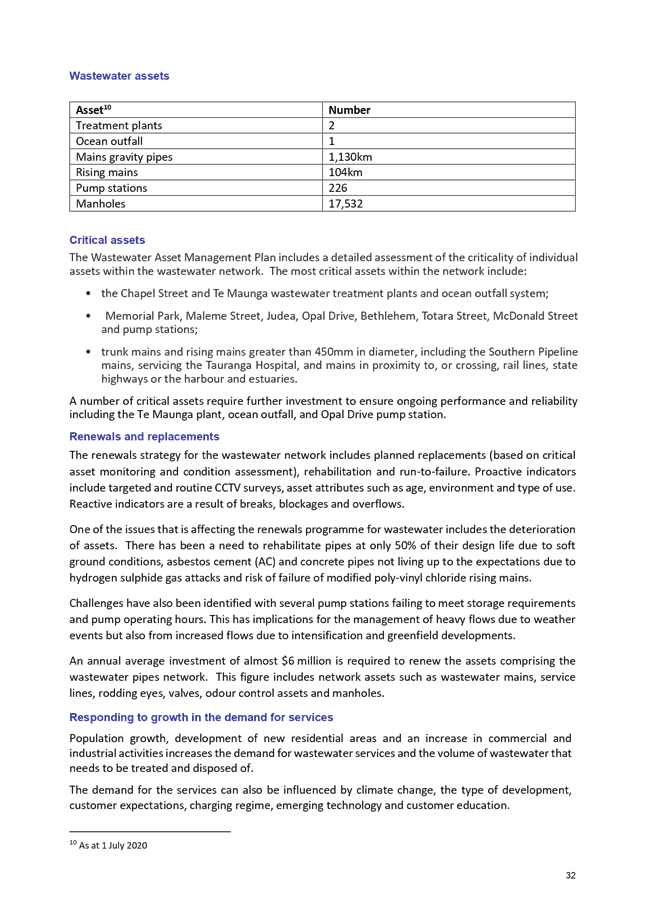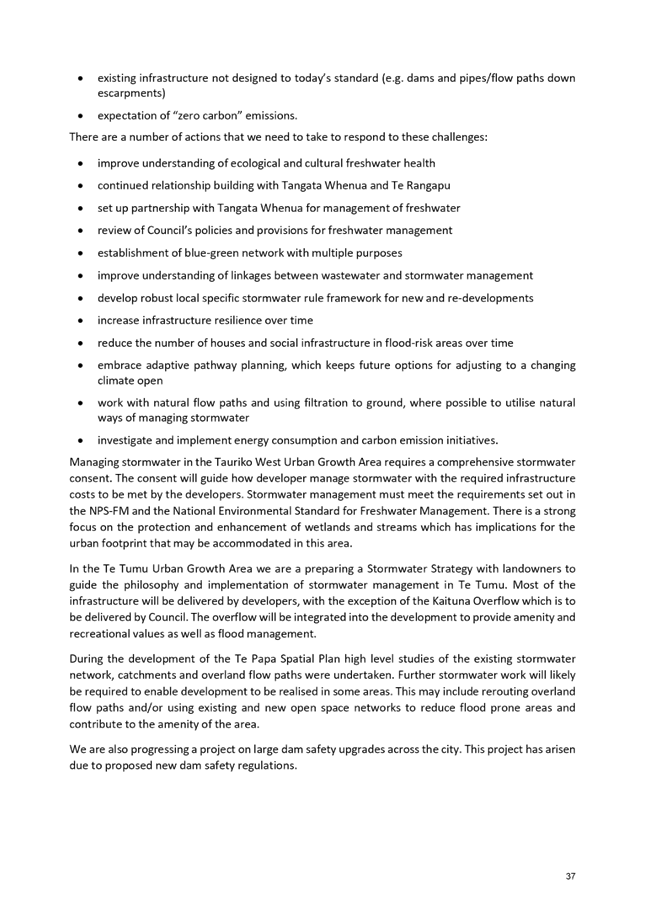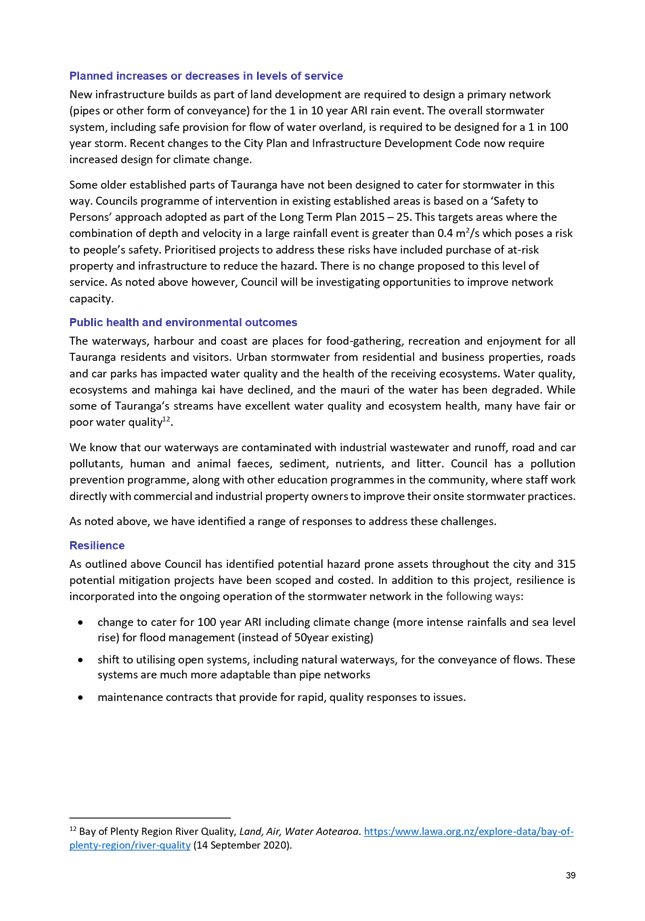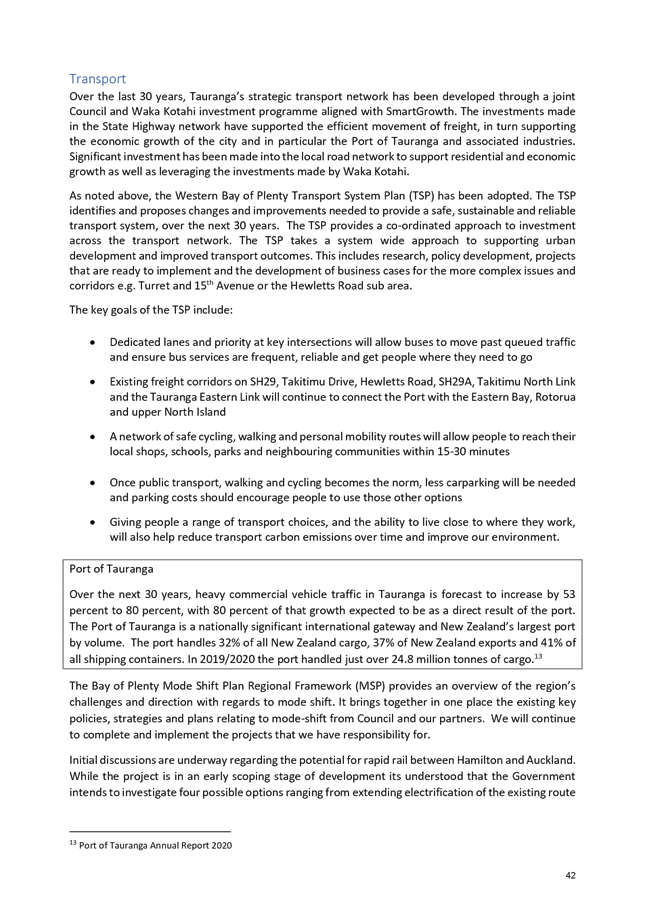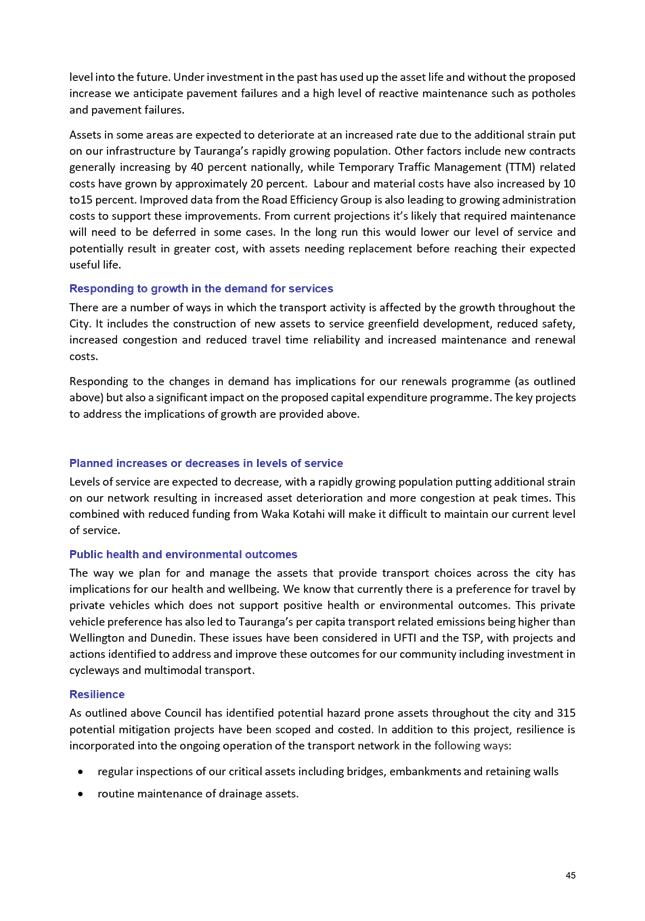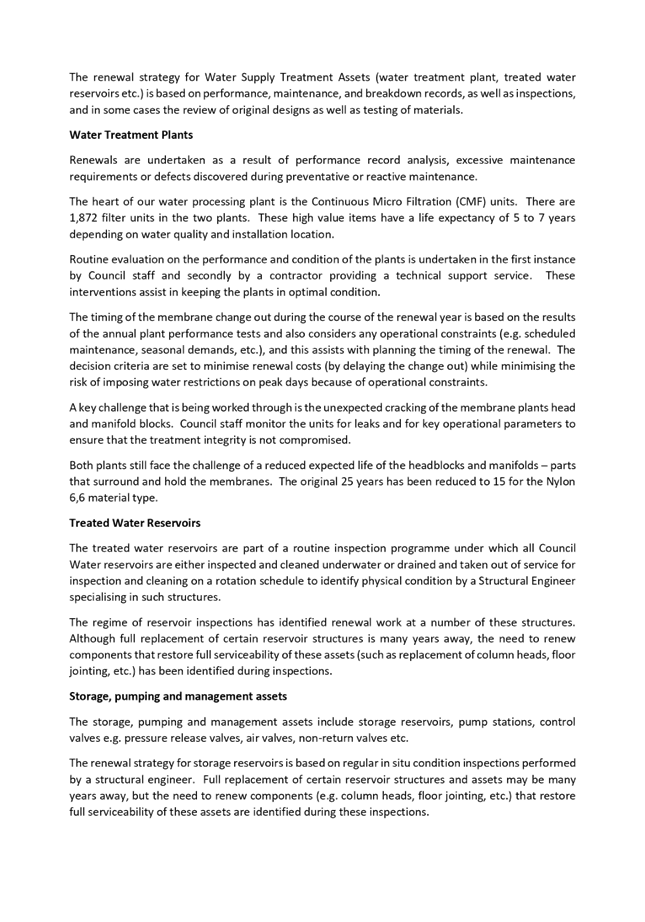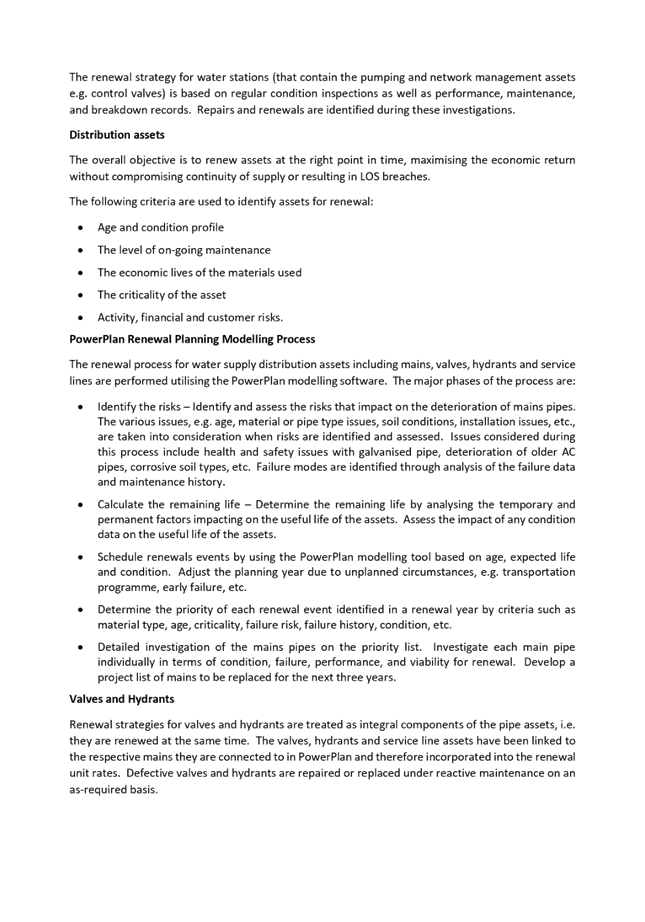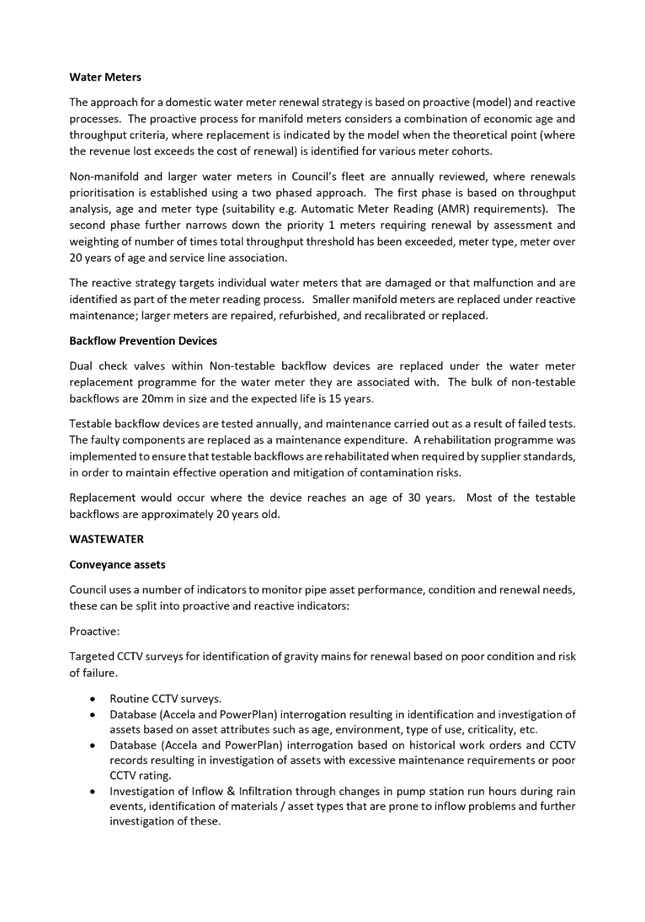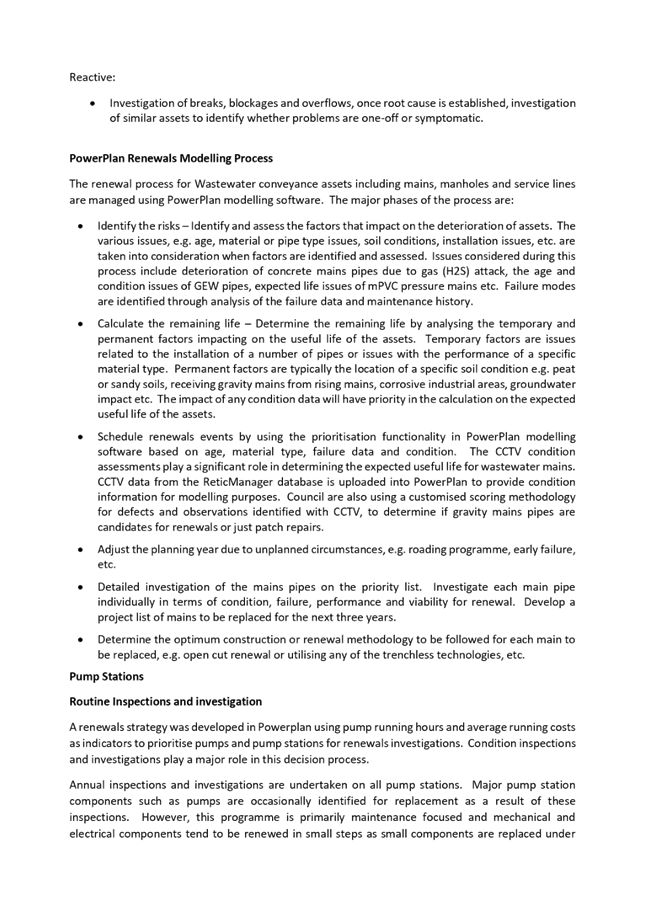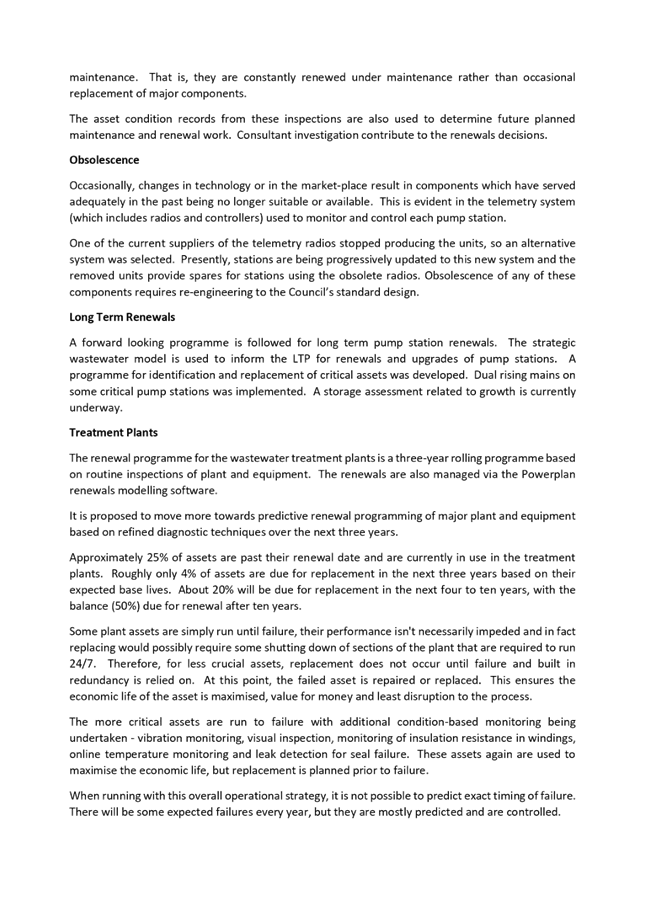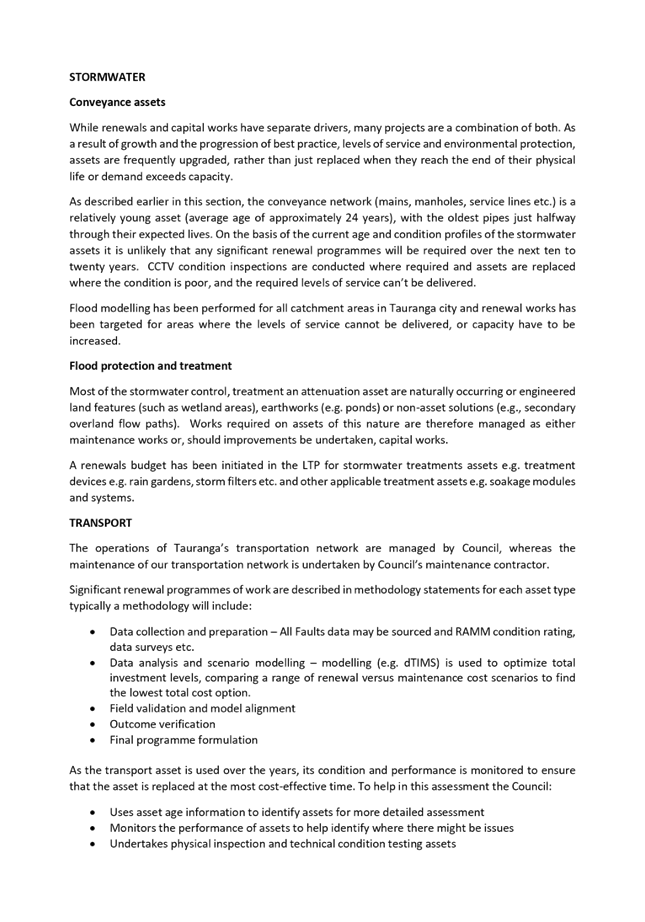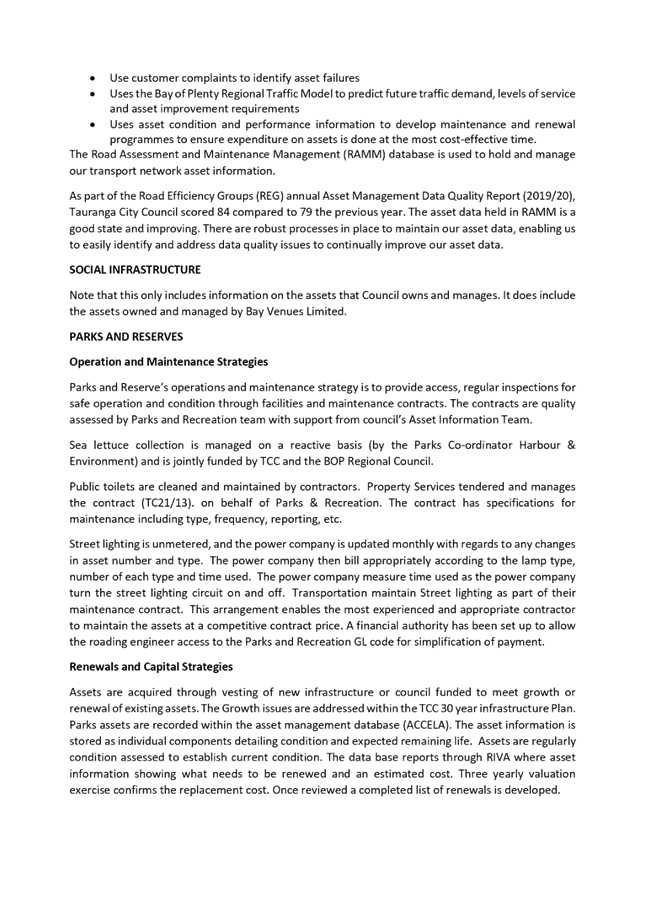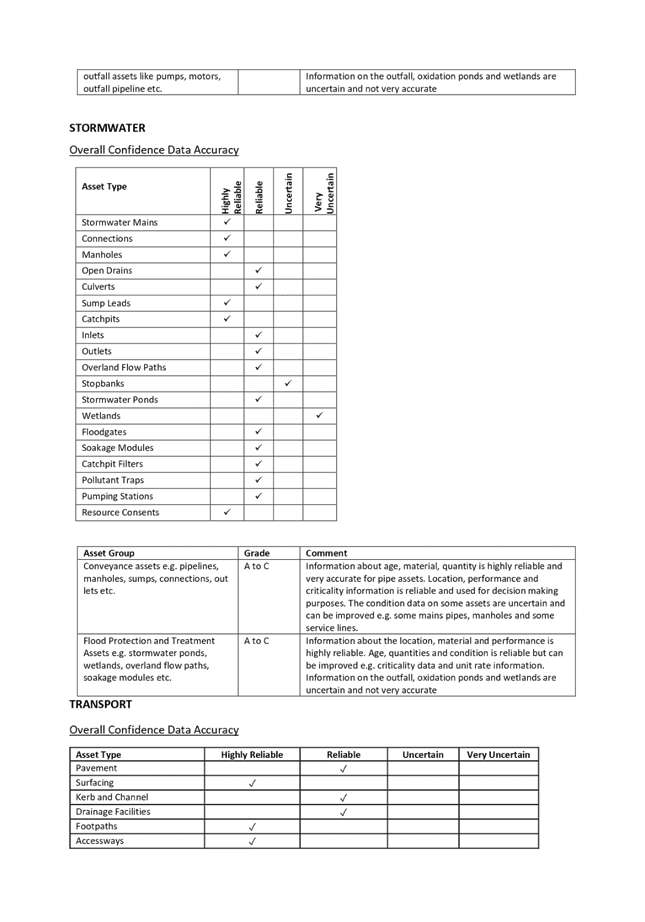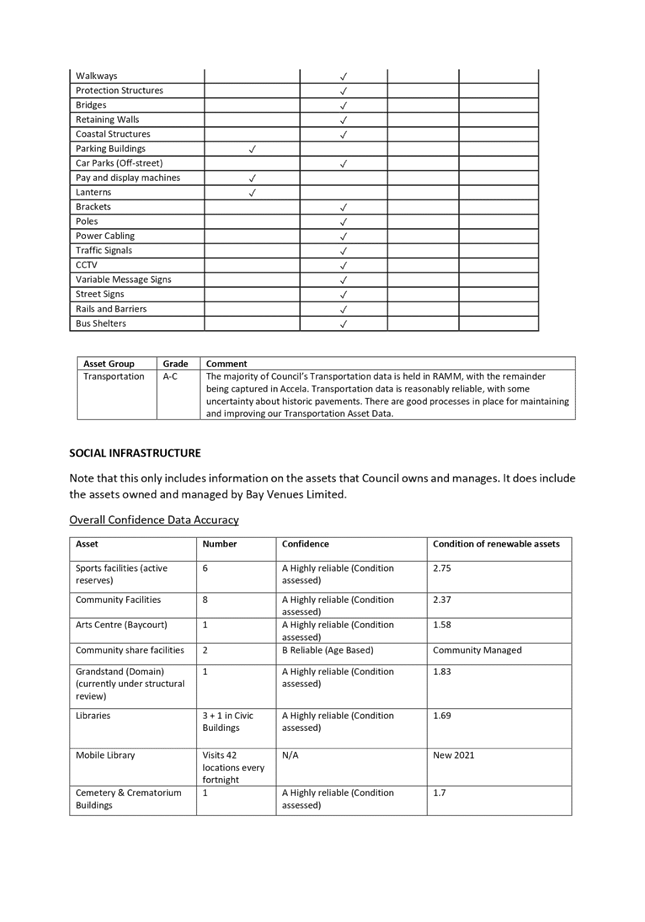|

|
|
AGENDA
Ordinary Council Meeting
Monday, 29 March 2021
|
|
I hereby give notice that an Ordinary Meeting of
Council will be held on:
|
|
Date:
|
Monday, 29 March 2021
|
|
Time:
|
to start at the conclusion of the Tangata Whenua
Committee meeting (but no earlier than 1pm)
|
|
Location:
|
Tauranga City Council
Council Chambers
91 Willow Street
Tauranga
|
|
Please
note that this meeting will be livestreamed and the recording will be
publicly available on Tauranga City Council's website: www.tauranga.govt.nz.
|
|
Marty Grenfell
Chief Executive
|
Membership
|
Chairperson
|
Commission Chair Anne Tolley
|
|
Members
|
|
|
Quorum
|
Half of the members physically present, where the
number of members (including vacancies) is even; and a majority
of the members physically present, where the number of members (including
vacancies) is odd.
|
|
Meeting
frequency
|
As required
|
Role
·
To ensure the effective and
efficient governance of the City
·
To enable leadership of the City
including advocacy and facilitation on behalf of the community.
Scope
·
Oversee the work of all
committees and subcommittees.
·
Exercise all non-delegable and
non-delegated functions and powers of the Council.
·
The powers Council is legally prohibited from delegating include:
o Power to make a
rate.
o Power to make a
bylaw.
o Power to borrow
money, or purchase or dispose of assets, other than in accordance with the
long-term plan.
o Power to adopt
a long-term plan, annual plan, or annual report
o Power to
appoint a chief executive.
o Power to adopt
policies required to be adopted and consulted on under the Local Government Act
2002 in association with the long-term plan or developed for the purpose of the
local governance statement.
o All final
decisions required to be made by resolution of the territorial
authority/Council pursuant to relevant legislation (for example: the approval
of the City Plan or City Plan changes as per section 34A Resource Management
Act 1991).
·
Council has chosen not to delegate the following:
o Power to
compulsorily acquire land under the Public Works Act 1981.
·
Make those decisions which are required by legislation to be made
by resolution of the local authority.
·
Authorise all expenditure not delegated to officers, Committees
or other subordinate decision-making bodies of Council.
·
Make appointments of members to the CCO Boards of Directors/Trustees
and representatives of Council to external organisations.
·
Consider any matters referred from any of the Standing or Special
Committees, Joint Committees, Chief Executive or General Managers.
Procedural matters
·
Delegation of Council powers to Council’s committees and
other subordinate decision-making bodies.
·
Adoption of Standing Orders.
·
Receipt of Joint Committee minutes.
·
Approval of Special Orders.
·
Employment of Chief Executive.
·
Other Delegations of Council’s powers, duties and
responsibilities.
Regulatory matters
Administration,
monitoring and enforcement of all regulatory matters that have not otherwise
been delegated or that are referred to Council for determination (by a
committee, subordinate decision-making body, Chief Executive or relevant
General Manager).
7 Confirmation
of Minutes
7.1 Minutes
of the Council Meeting held on 8 March 2021
File
Number: A12374749
Author: Robyn
Garrett, Team Leader: Committee Support
Authoriser: Robyn
Garrett, Team Leader: Committee Support
|
Recommendations
That the Minutes of the Council Meeting held on 8 March 2021
be confirmed as a true and correct record.
|
Attachments
1. Minutes
of the Council Meeting held on 8 March 2021
|

|
|
MINUTES
Ordinary Council Meeting
Monday, 8 March 2021
|
Order of Business
1 Apologies. 4
2 Public
Forum.. 4
2.1 Michael
Dance, James Petterson, Karen Laidlaw and Friederike Haffelder - Links Ave
traffic and pedestrian safety. 4
2.2 Keith
Ellery – Farm Street residents. 5
2.3 Tauranga
Community Housing Trust – Jacqui Ferrel, General Manager and Jo Gravit,
Chairperson – development contributions. 5
3 Acceptance
of Late Items. 6
3.1 Delegation
relating to Civil Defence Emergency Declarations. 6
4 Confidential
Business to be Transferred into the Open. 6
5 Change to
the Order of Business. 6
6 Confirmation
of Minutes. 6
6.1 Minutes
of the Council meeting held on 22 February 2021. 6
7 Declaration
of Conflicts of Interest 7
8 Deputations,
Presentations, Petitions. 7
Nil
9 Recommendations
from Other Committees. 7
Nil
10 Business. 7
10.1 2021-2031
Long-term Plan - update and revised working draft 7
10.2 2021-2031
Long-term Plan - Significant Forecasting Assumptions. 8
10.3 2021-2031
Long-term Plan - Draft Groups of Activities (including performance measures) 9
10.4 Approval
of the draft Revenue and Financing Policy Framework. 10
10.6 Development
Contributions - Papakainga housing. 10
10.5 Development
Contributions - Community Housing Providers. 11
10.7 Civic
Rebuild - Priority Decisions. 11
10.8 Financial
and Non-Financial Monitoring Report: Period ended 31 December 2020. 13
11 Discussion of Late Items. 13
12 Public Excluded Session. 13
12.1 Tauranga
Northern Link Future Proofing Opportunity. 13
12.2 Elder
Housing. 14
12.3 Civic
Rebuild - Consolidated Civic Administration Premises. 14
12.4 Seismic
status and upgrade of the Spring Street and Elizabeth Street carpark buildings 14
12.5 Request
approval for Exemption to Open Competition for IC23. 14
MINUTES OF Tauranga City Council
Ordinary Council Meeting
HELD AT THE Tauranga City Council,
Council Chambers, 91 Willow Street, Tauranga
ON Monday, 8 March 2021 AT 9am
PRESENT: Commission
Chair Anne Tolley, Commissioner Shadrach Rolleston, Commissioner Stephen
Selwood, Commissioner Bill Wasley
IN
ATTENDANCE: Marty Grenfell (Chief Executive), Paul Davidson
(General Manager: Corporate Services), Barbara Dempsey (General Manager:
Regulatory & Compliance), Susan Jamieson (General Manager: People &
Engagement), Nic Johansson (General Manager: Infrastructure), Christine Jones
(General Manager: Strategy & Growth), Gareth Wallis (General Manager:
Community Services), Carlo Ellis (Manager: Strategic Maori Engagement), Jeremy
Boase (Manager: Strategy & Corporate Planning), Kathryn Sharplin (Manager:
Finance), Nick Swallow (Manager, Legal & Commercial), Brigid McDonald
(Manager: Strategic Investment & Commercial Facilitation), Josh Logan (Team
Leader: Corporate Planning), Ben Corbett (Corporate Planner), Jim Taylor
(Transactional Services Manager), Coral Hair (Manager: Democracy Services),
Ariell King (Team Leader: Policy), Jo Stone (Senior Strategic Advisor), Cindy
Gillman-Bate (Corporate Solicitor), Rhea Brooks (Corporate Planner), Robyn
Garrett (Team Leader: Committee Support), Raj Naidu (Committee Advisor).
KARAKIA
Carlo Ellis, Manager:
Strategic Maori Engagement, opened the meeting
with a Karakia.
1 Apologies
Nil
2 Public
Forum
|
2.1 Michael
Dance, James Petterson, Karen Laidlaw and Friederike Haffelder - Links
Ave traffic and pedestrian safety
|
|
A copy of the presentation for
this item can be viewed on Tauranga City Council’s website in the
Minutes Attachments document for this meeting.
Key points
·
Three schools were within one km of the area of concern; 500
schoolchildren used the pathway an hour during peak times. There was no
safe separation between the children and buses and cars.
·
Requested the road be reinstated to its previous design; a bus
lane had been included as part of the B2B project management. Use of
the bus lane was a concern particularly in the morning.
·
The unsafe situation on Links Ave had been raised previously
with council. The presenters considered nothing tangible had happened;
no recommendations from the residents and family groups had been
actioned. Noted similar issues with safety of school children in
Matapihi and Papamoa.
·
Local schools should have been included in the recent speed
limit review.
·
Links Ave was not intended as a major arterial road and was
never designed for the traffic load being experienced.
·
The majority of the risk of the shared pathway was borne by
children.
|
|
2.2 Keith
Ellery – Farm Street residents
|
|
Key points
·
Mr Ellery had personally attended three accidents in the last
three years; but was Aware of more accidents that had occurred.
·
Farm St was a narrow suburban street that could not handle the
pressure of competing uses.
·
Buses posed a risk to school children and pedestrians.
·
Recommended relocation of the temporary bus interchange away
from Farm St.
·
Suggested the option of a bus interchange on Girven Rd and
understood that Council owned land there, the old St Johns site.
Considered that site provided ample room for an interchange and to park
non-operative buses and should be considered as the site for the permanent
bus interchange.
|
|
2.3 Tauranga
Community Housing Trust – Jacqui Ferrel, General Manager and Jo Gravit,
Chairperson – development contributions
|
|
A copy of the supporting
information tabled for this item can be viewed on Tauranga City
Council’s website in the Minutes Attachments document for this meeting.
Key points
·
The Tauranga Community Housing Trust (TCHT), a charitable
trust, worked locally to find land and facilitate provision of affordable
housing. TCHT was established as a community housing provider (CHP)
about 20 years ago.
·
Held a property portfolio across Tauranga and Whakatane of
about 200 houses. 120 houses were being built and would come online in
the next two years.
·
TCHT tenants would struggle to meet market rentals and
generally needed to be close to health care and social facilities.
·
Noted that the development contributions agenda report had not
been consulted with TCHT or any other social housing provider.
Considered the report recommendation to maintain the status quo unacceptable.
·
Housing developments were funded through mortgages and grants;
the financial certainty of subsidised development contributions would make a
significant difference to TCHT financial planning and project financing.
·
Social housing providers were not competitive and shared the
same goal of provision of more social and affordable housing.
·
Suggested that council could have a capped annual budget for
subsided development contributions for community housing providers.
In
response to questions
·
Community housing providers could provide an indication to
Council of the number of houses being planned over a certain period but were
not developers so could not comment on viability of planned projects.
·
Noted that many papakainga housing providers were also CHPs,
and nationally monitored and audited. Submitted that any CHP should
come under the same policy and funding umbrella.
|
|
At 9.39am the meeting adjourned to
allow a Long-Term Plan workshop to be held.
At 3.20pm the meeting reconvened.
|
3 Acceptance
of Late Items
|
3.1 Delegation
relating to Civil Defence Emergency Declarations
|
|
Resolution CO2/21/1
Moved: Commissioner Bill
Wasley
Seconded: Commissioner
Stephen Selwood
That the Council:
Includes the item Report:
Delegation relating to civil defence emergency declarations in the
agenda. The above item was not included in the original agenda because
it was not available at the time the agenda was issued, and discussion and
decision cannot be delayed until the next scheduled meeting of the Council
because of the unpredictable and urgent nature of civil defence emergencies
Carried
|
|
Resolution CO2/21/2
Moved: Commissioner
Stephen Selwood
Seconded: Commissioner
Shadrach Rolleston
That the Council:
(a)
Pursuant to its powers under clause 32(1) of Schedule 7 of the Local
Government Act 2002, delegates to Commission Chair Anne Tolley, and in her
absence Commissioner Bill Wasley, the powers conferred under section 25(5) of
the Civil Defence Emergency Management Act 2002 to declare a state of local
emergency, or give notice of a local transition period, that covers the
district of Tauranga City Council.
Carried
|
4 Confidential
Business to be Transferred into the Open
Nil
5 Change
to the Order of Business
The Chairperson noted that
Agenda item 10.6 would be considered before Agenda item 10.5.
6 Confirmation
of Minutes
7 Declaration
of Conflicts of Interest
Nil
8 Deputations,
Presentations, Petitions
Nil
9 Recommendations
from Other Committees
Nil
10 Business
|
10.1 2021-2031
Long-term Plan - update and revised working draft
|
|
Staff Paul
Davidson, General Manager: Corporate Services
Christine
Jones, General Manager: Strategy & Growth
In
response to questions
·
Community outcomes would be included for re-adoption in the 15
March 2021 Council report.
·
Noted the ongoing involvement of Ngāti Hangarau in the
Omanawa Falls project; they were partners in the governance group and sat at
the table for all decisions made by that group.
·
All possible options for funding for the Papamoa East
Interchange, including tolling, would be included for consideration.
Discussion
points raised
·
Noted that the level of service proposed for road surfacing was
the result of a balancing exercise, with consideration of the costs of the
options – asphalt was very expensive to provide. Given the size
of funding commitments required through rates, every dollar counted; and it
was possible to make savings in this area.
|
|
Resolution CO2/21/4
Moved: Commissioner
Stephen Selwood
Seconded: Commissioner
Bill Wasley
That
the Council:
(a) Receives the report ‘2021-2031
Long-Term Plan – Update and revised working draft’.
(b) Notes that to address the
transportation, housing and community infrastructure needs of the city the
revised working draft Long-Term Plan is based on ‘Scenario C
Plus’ and includes further amendments and additions as detailed in this
report.
Issue 1: Road resealing
(c) Rescinds the decision of the Policy
Committee on 20 October on to ‘Approve option 2 into the LTP
prioritisation process and request further advice on funding this through a
city-wide or a local targeted rate or combination of both.
(d) Retains the existing ‘fit for
purpose’ level of service for road resealing and incorporate this
decision into the draft Long-Term Plan process.
(e) Highlights the proposed approach to
road resealing in the LTP consultation document and actively seeks community
input on it.
Issue 2: City centre stocktake
(f) Supports a stocktake of strategic
documents relating to the city centre and allocates $50,000 in the 2021/22
draft budget to complete this work.
(g) Notes that a further report-back on
this work will occur before the final Long-Term Plan is adopted.
Issue 3: Tropical display house in Robbins Park
(h) Defers consideration of the future of
the tropical display house in Robbins Park until after the completion of the
stocktake of city centre strategy.
Issue 4: Omanawa Falls
(i) Amends the budget allocation for
the Omanawa Falls project to include a Council contribution of $3.5 million.
Issue 5: Sustainability
(j) Confirms the continuation of the
$400,000 annual budget for the development and implementation of a
sustainability framework and action plans.
(k) Ceases the process to establish an
independent sustainability advisory board.
Issue
6: Rating options
(l) Staff
to include the following options in the report to the 15 March 2021 Council
meeting:
(i) A commercial differential of 1.6
in 2021/22 (preferred option); and
(ii) A commercial
differential of 1.6 phased in over first two financial years as 1.4 in year
one and 1.6 in year two (alternative option).
(iii) A fixed charge to include a 10% cap
on the UAGC including kerbside waste collection; and
(iv) A fixed charge to include a 10% cap on the
UAGC excluding kerbside waste collection thereby increasing the fixed charge.
(v) Introduction of targeted rates for
specific areas of expenditure.
(vi) In
respect if resilience investment over the 10-year period:
·
Increasing
the existing targeted rate; and
·
Option
and implication of including a further $100 million.
Carried
|
|
10.2 2021-2031
Long-term Plan - Significant Forecasting Assumptions
|
|
Staff Josh
Logan, Team Leader: Corporate Planning
Jeremy
Boase, Manager, Strategy & Corporate Planning
In
response to questions
·
Noted the high level of uncertainty associated with Assumption
10 that the business and structure of local government would not alter within
the lifetime of the LTP. This assumption was drafted based on advice
provided by Audit New Zealand.
·
Clarification was provided on Assumption 18 and the inclusion
of funding for the development of Te Tumu. Commencement of development
was considered unlikely to occur within the current LTP, and if it were to
occur it would be in the outer years of the LTP lifetime. Staff had chosen to
be conservative and not show a revenue stream that was not certain.
·
Assumptions 19 and 21 – commentary would be provided in
the LTP document regarding possible changes to the ownership of water
infrastructure assets.
|
|
Resolution CO2/21/5
Moved: Commissioner Bill
Wasley
Seconded: Commissioner
Stephen Selwood
That the Council:
(a) Receives
the report;
(b) Approves
the draft Significant Forecasting Assumptions, with an amendment in
respect of the timing of the Te Tumu purchase, as set out in Attachment
1;
(c) Agrees
the assumption regarding demographics may be updated as necessary to reflect
data due to be released by Tatauranga Aotearoa Stats NZ on 31 March 2021;
and
(d) Agrees
the actions detailed as mitigations to address risk may be updated to reflect
the outcomes of developing the LTP.
Carried
|
|
10.3 2021-2031
Long-term Plan - Draft Groups of Activities (including performance measures)
|
|
Staff Josh
Logan, Team Leader: Corporate Planning
Jeremy
Boase, Manager, Strategy & Corporate Planning
Key
points
·
The Groups of Activities document would be included as
supporting information on the website for the draft LTP; for the final LTP
the document was included in the actual LTP document.
·
Inclusion of actual performance measures was tricky in terms of
timing; as current actuals would not have been audited in time for inclusion.
The preceding year’s audited actuals (2019/20) could be included to
provide a comparison and as an indication of trend movement.
|
|
Resolution CO2/21/6
Moved: Commissioner
Stephen Selwood
Seconded: Commissioner
Shadrach Rolleston
That the Council:
(a) Receives the report.
(b) Approves
the draft Groups of Activities plans as set out in Attachment 1, in
order to form part of the supporting information for consultation on the
2021-2031 Long-term Plan.
(c) That Council notes amendments will be made to the Groups
of Activities plans to enable inclusion of key projects by activity (once the
draft financials are completed in March 2021), and to outline the funding
sources following completion of the revenue and financing policy process.
Carried
|
|
10.4 Approval
of the draft Revenue and Financing Policy Framework
|
|
Staff Kathryn
Sharplin, Manager: Finance
In
response to questions
·
Noted that libraries were multi-purpose facilities used for
more that providing library materials and resources. The description of
the benefits of libraries was not broad enough and could be better defined to
capture all uses/benefits.
·
A rationale for funding for regulation monitoring and a
description of the benefits to the community of providing that funding should
be included.
·
Tolling was not included in the discussion of transport
charging options. Noted that for tolling to be a viable option for
council, an order-in-council was required to be in place. If the
charges related to a part of the state highway network, that would be captured
under NZTA funding mechanisms. Tolling as a charging option could be
included but with the limitation that any tolling scheme was subject to an
appropriate order-in-council.
|
|
Resolution CO2/21/7
Moved: Commissioner Bill
Wasley
Seconded: Commissioner
Shadrach Rolleston
That the Council:
(a) Approves
the draft Funding Needs Analysis (Attachment 1) with amendments as agreed at
the meeting and the preliminary draft Revenue and Funding Policy (Attachment
2) subject to decisions on the overall impact of the allocation of liability
for revenue.
Carried
|
|
10.6 Development
Contributions - Papakainga housing
|
|
Staff Jeremy
Boase, Manager: Strategy & Corporate Planning
Carlo Ellis, Manager: Strategic
Maori Engagement
Key
points
·
No staff recommendation was included in the report as this was
a political decision. Development contributions were a cost recovery
mechanism; if not received from the developer then generally the cost would
be recovered from the ratepayer. It was a decision for the
commissioners where recovery of those costs should lie.
·
Noted impact of development contributions on the development of
Māori land and the constraints imposed; a distinguishing factor with Māori
land was multiple ownership.
In
response to questions
·
The Western Bay of Plenty District Council (WBOPDC) policy was
considered to see if its principles could be applied to Tauranga City Council
(TCC); there was not significant evidence that the subsidy was removing the
barriers to development as expected. There was no explanation of the
rationale for adopting the 50% reduction figure.
·
A 50% reduction may not necessarily provide enough of an
incentive for a family to be able to fund deferred development contributions.
·
A solution was needed that enabled housing to be developed, as
well as being fair, equitable and transparent.
·
There was no existing fund available to be used to offset
deferred or subsidised development contributions; any offset would need to be
included in rates.
·
The establishment of a grant fund to support the development of
social housing was possible; a “subsidy fund” was outlined in the
report.
·
Noted that development contributions might not apply to the iwi
or community housing provider (CHP) involved but to the developer of the
housing site.
·
Considered important to align policies as much as possible with
WBOPDC for papakainga and community housing.
|
|
Resolution CO2/21/8
Moved: Commission Chair
Anne Tolley
Seconded: Commissioner
Stephen Selwood
That the Council:
Leaves the agenda item 10.6 – Development
Contributions - Papakainga housing - to lie on the table until the subsequent
Council meeting on 15 March 2021.
Carried
|
|
10.5 Development
Contributions - Community Housing Providers
|
|
Staff Jeremy
Boase, Manager: Strategy & Corporate Planning
|
|
Resolution CO2/21/9
Moved: Commission Chair
Anne Tolley
Seconded: Commissioner
Stephen Selwood
That the Council:
Leaves the agenda item 10.5 – Development
Contributions – Community Housing Providers - to lie on the table until
the subsequent Council meeting on 15 March 2021.
Carried
|
|
10.7 Civic
Rebuild - Priority Decisions
|
|
Staff Brigid
McDonald, Manager: Strategic Investment & Commercial Facilitation
Jo Stone, Senior Strategic Advisor
A copy of
the staff presentation for this item can be viewed on Tauranga City
Council’s website in the Minutes Attachments document for this meeting.
Key
points
·
Outlined previous Council decisions and noted the key decision
sought today.
·
The report requested that a specific budget for civic rebuild
projects be included in the LTP.
·
Noted the recommendation to meet with Ngai Tamarawaho to
discuss future development of the Civic Precinct.
In
response to questions
·
Areas 21 and 41 (the TV3 site) were currently used for
carparking. Use of that land was to be looked at during the Civic Precinct
Master Plan refresh and challenge process.
·
The Master Plan refresh process would start in April/May; there
would be a report back to Council to determine what further aspects should be
consulted with the community.
Discussion
points raised
·
Certainty of development was fundamental to the revitalisation
of the CBD.
|
|
Resolution CO2/21/10
Moved: Commission Chair
Anne Tolley
Seconded: Commissioner
Stephen Selwood
That the Council
advances the Civic Rebuild programme as follows:
a) Notes
the Council has a key role in supporting City Centre revitalisation
through investment in Civic Facilities and amenity and
contributing to a City Centre environment which incentivises activity, future
private investment, and increased mixed-use development;
b) Confirms
the September 2020 decision of Council to refresh and revise the Civic
Precinct Master Plan. Approves a revised streamlined challenge process to the
existing Master Plan and a subsequent report back to Council;
c) Includes
in the draft Long-Term Plan the proposed programme and projected capital
expenditure of:
· $45
million to provide the new Community space and Library facility,
(commencement August 2021, expected completion December 2023); and
· $11
million to provide enhanced public spaces in the Civic Plaza and surrounding
area (including Masonic Park);
· $2
million for temporary relocation and associated fitout costs
· $3
million for demolition of existing buildings on Civic site.
d) Confirms
the intent of the Commissioners to meet with Ngai Tamarawaho representatives
to discuss arrangements for meaningful engagement regarding the future
development of the Civic Precinct
· It
is envisaged that Ngai Tamarawaho will be a key partner for the community
space and central library facility build programme.
e) Confirms
the March 2020 in-principle decision of Council to secure leased interim
office accommodation for the purpose of consolidation of Council’s
administration staff in a single location and approves negotiations being
entered into with third parties to this effect;
f) Approves
the demolition of Willow Street Buildings A, B and C (refer Attachment 1)
as soon as possible following existing Council services relocating to other
temporary premises; and
g) Notes
that the capital and operating expenditure forecast in this report includes
projected costs relating to the demolition of the Willow Street buildings and
temporary premises (relocation, rent, outgoings) whilst the new facilities
are built.
Carried
|
|
10.8 Financial
and Non-Financial Monitoring Report: Period ended 31 December 2020
|
|
Staff Kathryn
Sharplin, Manager: Finance
Ben
Corbett, Corporate Planner
Rhea
Brooks, Corporate Planner
In
response to questions
·
Currently were tracking favourably to budget; this was affected
by revenue being less impacted by COVID-19 than expected.
·
There had been a downturn in visitor numbers to The Elms due to
COVID-19; other opportunities to assist with moving visitors to key CBD
attractions were being investigated.
·
The Historic Village strategy recently developed would help
drive occupancy and tenancy.
·
Bus usage figures were down; a strategic conversation with Bay
of Plenty Regional Council was needed to help understand how usage was
tracking and what the trends indicated.
·
Noted that more commentary on the trends in the
“reds” would be useful in ongoing reports, including any
indication of corrective actions planned. An overall sense of trend
would be useful for the organisation as well as individual activities
|
|
Resolution CO2/21/11
Moved: Commissioner
Bill Wasley
Seconded: Commissioner
Shadrach Rolleston
That
the Finance, Audit and Risk Committee:
(a) Receives
Report Financial and Non-Financial Monitoring Report: Period ended 31 December
2020.
Carried
|
11 Discussion
of Late Items
The late item Report: Delegation relating to Civi Defence
Emergency Declarations was dealt with earlier in the meeting.
12 Public
Excluded Session
RESOLUTION TO EXCLUDE
THE PUBLIC
|
Resolution CO2/21/12
Moved: Commissioner Bill
Wasley
Seconded: Commissioner
Shadrach Rolleston
That the public be
excluded from the following parts of the proceedings of this meeting.
The general subject
matter of each matter to be considered while the public is excluded, the
reason for passing this resolution in relation to each matter, and the
specific grounds under section 48 of the Local Government Official
Information and Meetings Act 1987 for the passing of this resolution are as
follows:
|
General subject of each matter to be
considered
|
Reason for passing this resolution in
relation to each matter
|
Ground(s) under section 48 for the
passing of this resolution
|
|
12.1 - Tauranga Northern Link Future
Proofing Opportunity
|
s7(2)(i) - the withholding of the information is
necessary to enable Council to carry on, without prejudice or disadvantage,
negotiations (including commercial and industrial negotiations)
|
s48(1)(a) - the public conduct of the relevant
part of the proceedings of the meeting would be likely to result in the
disclosure of information for which good reason for withholding would exist
under section 6 or section 7
|
|
12.2 - Elder Housing
|
s7(2)(a) - the withholding of the information is
necessary to protect the privacy of natural persons, including that of
deceased natural persons
s7(2)(i) - the withholding of the information is
necessary to enable Council to carry on, without prejudice or disadvantage,
negotiations (including commercial and industrial negotiations)
s7(2)(j) - the withholding of the information is
necessary to prevent the disclosure or use of official information for
improper gain or improper advantage
|
s48(1)(a) - the public conduct of the relevant
part of the proceedings of the meeting would be likely to result in the
disclosure of information for which good reason for withholding would exist
under section 6 or section 7
|
|
12.3 - Civic Rebuild - Consolidated
Civic Administration Premises
|
s7(2)(g) - the withholding of the information is
necessary to maintain legal professional privilege
s7(2)(i) - the withholding of the information is
necessary to enable Council to carry on, without prejudice or disadvantage,
negotiations (including commercial and industrial negotiations)
|
s48(1)(a) - the public conduct of the relevant
part of the proceedings of the meeting would be likely to result in the
disclosure of information for which good reason for withholding would exist
under section 6 or section 7
|
|
12.4 - Seismic status and upgrade of
the Spring Street and Elizabeth Street carpark buildings
|
s7(2)(h) - the withholding of the information is
necessary to enable Council to carry out, without prejudice or
disadvantage, commercial activities
s7(2)(i) - the withholding of the information is
necessary to enable Council to carry on, without prejudice or disadvantage,
negotiations (including commercial and industrial negotiations)
|
s48(1)(a) - the public conduct of the relevant
part of the proceedings of the meeting would be likely to result in the
disclosure of information for which good reason for withholding would exist
under section 6 or section 7
|
|
12.5 - Request approval for Exemption
to Open Competition for IC23
|
s7(2)(i) - the withholding of the information is
necessary to enable Council to carry on, without prejudice or disadvantage,
negotiations (including commercial and industrial negotiations)
|
s48(1)(a) - the public conduct of the relevant
part of the proceedings of the meeting would be likely to result in the
disclosure of information for which good reason for withholding would exist
under section 6 or section 7
|
Carried
|
KARAKIA
Commissioner Rolleston closed
the meeting with a Karakia.
The meeting closed at 5.30pm.
The minutes of this
meeting were confirmed at the Ordinary Council meeting held on 29 March 2021.
...................................................
CHAIRPERSON
7.2 Minutes
of the Council Meeting held on 15 March 2021
File
Number: A12372845
Author: Jenny
Teeuwen, Committee Advisor
Authoriser: Robyn
Garrett, Team Leader: Committee Support
|
Recommendations
That the Minutes of the Council Meeting held on 15 March
2021 be confirmed as a true and correct record.
|
Attachments
1. Minutes
of the Council Meeting held on 15 March 2021
|
Ordinary Council
Meeting Minutes
|
15 March 2021
|
|

|
|
MINUTES
Ordinary Council Meeting
Monday, 15 March 2021
|
Order Of Business
1 Opening
Karakia. 3
2 Apologies. 3
3 Public
forum.. 3
3.1 Mr
Michael O’Neill – Innovating Streets project 3
3.2 Bay
of Plenty Regional Council – Chair Doug Leeder, Crs Paula Thompson,
Matemoana McDonald and Andrew von Dadelszen – Long Term Plan presentation. 3
4 Acceptance
of late items. 5
5 Confidential
business to be transferred into the open. 5
6 Change to
the order of business. 5
7 Confirmation
of minutes. 5
Nil
8 Declaration
of conflicts of interest 5
9 Deputations,
presentations, petitions. 5
Nil
10 Recommendations from other
committees. 5
Nil
11 Business. 5
11.1 Development
Contributions - Papakainga housing. 5
11.2 Development
Contributions - Community Housing Providers. 6
11.3 2021-31
Long-Term Plan - Outcomes proposal 6
11.4 Innovating
Streets at the Mount 8
11.5 2021-2031
Long-term Plan - Draft User Fees and Charges. 9
11.6 2021-31
Long Term Plan Financial Options. 9
12 Public excluded session. 11
13.1 Consolidated
Civic Administration Premises. 11
11 Business (Continued) 12
11.7 Submission
to Bay of Plenty Regional Council Long Term Plan 2021-2031. 12
13 Discussion of late items. 12
14 Closing Karakia. 13
MINUTES OF Tauranga
City Council
Ordinary Council
Meeting
HELD AT THE Tauranga
City Council, Council Chambers, 91 Willow Street, Tauranga
ON Monday, 15
March 2021 AT 10.30am
PRESENT: Commission
Chair Anne Tolley, Commissioner Shadrach Rolleston, Commissioner Stephen
Selwood and Commissioner Bill Wasley
IN ATTENDANCE: Marty Grenfell (Chief
Executive), Paul Davidson (General Manager: Corporate Services), Barbara
Dempsey (General Manager: Regulatory & Compliance), Susan Jamieson (General
Manager: People & Engagement), Nic Johansson (General Manager:
Infrastructure), Christine Jones (General Manager: Strategy & Growth),
Gareth Wallis (General Manager: Community Services), Carlo Ellis (Manager:
Strategic Maori Engagement), Ross Boreham (Communications Specialist), Jeremy
Boase (Manager: Strategy & Corporate Planning), Kathryn Sharplin (Manager:
Finance), Paul Dunphy (Director of Places & Spaces), Jim Taylor
(Transactional Services Manager), Josh Logan (Team Leader: Corporate Planning),
Tracey Hughes (Financial Insights & Reporting Manager), Guy Protheroe
(Urban Designer), Robyn Garrett (Team Leader: Committee Support), Raj Naidu
(Committee Advisor) and Jenny Teeuwen (Committee Advisor)
1 Opening
Karakia
Carlo Ellis, Manager:
Strategic Maori Engagement, opened the meeting
with a Karakia.
2 Apologies
Nil
3 Public
forum
|
3.1 Mr
Michael O’Neill – Innovating Streets project
|
|
Key points
·
On behalf of the Mount community and residents involved in the
Innovating Streets consultation workshops, offered to Tauranga City Council
(TCC) recognition of a job well done. It had been a positive local
experience.
·
Offered a vote of thanks for the consultation model that
captured local interests and enabled real and meaningful engagement with
community representatives. Hoped to see the model adopted by other
council projects going forward.
·
The representation group covered all demographics with wide and
varying perspectives.
·
Requested that the design be better modified to avoid the loss
of vital carparking spaces between the main beach and Tay Street.
The Commission Chair thanked Mr
O’Neill for his presentation.
|
|
3.2 Bay
of Plenty Regional Council – Chair Doug Leeder, Crs Paula Thompson,
Matemoana McDonald and Andrew von Dadelszen – Long Term Plan
presentation
|
|
A
copy of the Bay of Plenty Regional Council (BOPRC) presentation for this item
can be viewed on Tauranga City Council’s website in the Minutes
Attachments document for this council meeting.
Key
points
·
Tauranga was pivotal to the success of the region. Conversely,
Tauranga was dependent on the success of the region.
·
It was important to work collectively and collegially together
for the betterment of the region.
·
BOPRC was essentially about the environment.
·
Currently responding to central government regulatory reform
with a focus on the National Environment Standards for fresh water and air
quality.
·
Focussed on regional recovery post Covid-19.
·
The region would be challenged to meet nation climate change
targets, particularly for emissions reduction.
·
Absolutely focussed on easing the congestion in the city.
The priority was to find mode shift change. Believed the public
transport “spoke and hub” model was the right model for the city
but the model required the right infrastructure to be successful.
·
Committed to working with TCC to get good outcomes for the Regional
Land Transport Plan (RLTP).
·
Looked to ensure that the Māori view became more
recognised and acknowledged. The provisions for Māori coming from
central government would be better addressed and supported if councils worked
collaboratively together.
·
Fortunate to have a range of funding sources. 29% of
income came from investment income. This income currently offset
general rates by $310 per property.
·
Committed to community participation and engagement.
·
Acknowledged it was time for transformational shifts to occur,
particularly in regards to emissions reductions.
·
Proposed spending over the next 10 years was $1.6 billion;
three quarters dedicated to transport and urban planning.
·
BOPRC’s Financial Strategy aimed to improve resilience to
internal and external influences and challenges.
·
For the first three years of the Long-Term Plan (LTP), BOPRC
will fund the proposed public transport targeted rate increase from general
reserves.
·
LTP consultation would be around climate change sustainability
initiatives, public transport bus fares, and a regional safety and rescue
services fund.
In
response to questions
·
The free school
bus trial would continue through to December. The trail had been
disrupted last year by the Covid-19 level 4 lockdown.
·
The implementation
of the National Policy Statement standards for fresh water would be a work in
process. The new standards would prevail when current territorial
authorities wastewater and stormwater discharge resource consents expired.
·
BOPRC was looking
at better ways for shared decision making with Māori and providing the space
for Tangata Whenua to sit at the decision-making table. More
conversations were required inside and outside of council to enable real
change in this space. Wider application of matauranga Māori was
being considered within BOPRC activities.
·
Strategic and
spatial planning would provide opportunities for climate change going
forward. An integrated way of working was required to meet the aspirations
of the current government, particularly in the Western Bay of Plenty’s urban
and transport space.
·
Infrastructure
that supported public transport e.g. hubs and clearways, was key to increasing
service development and patronage of public transport.
The Commission
Chair thanked Chair Doug Leeder, Crs Paula Thompson, Matemoana McDonald and
Andrew von Dadelszen for their presentation.
|
|
Attachment
1 Presentation
- BOPRC LTP
|
4 Acceptance
of late items
Nil
5 Confidential
business to be transferred into the open
Nil
6 Change
to the order of business
Nil
7 Confirmation
of minutes
Nil
8 Declaration
of conflicts of interest
Nil
9 Deputations,
presentations, petitions
Nil
10 Recommendations
from other committees
Nil
11 Business
|
11.1 Development
Contributions - Papakainga housing
|
|
This
item had been left to lie on the table at the 8 March Council meeting as
further information had been requested.
A
copy of the tabled document for this item and Item 11.2 – Development
Contributions (DCs) on papakainga and community housing provider (CHP)
developments - can be viewed on Tauranga City Council’s website in the
Minutes Attachments document for this committee meeting.
|
|
Resolution
CO3/21/1
Moved: Commission Chair
Anne Tolley
Seconded: Commissioner
Stephen Selwood
That the Council:
a)
Provides $250,000
per year for each of the next three financial years to be applied to a
Papakainga Development Contributions Grant Fund, with the funding source to
be the proceeds of the Elder Housing Portfolio.
b)
Notes that the
intention is for the Grant Fund to be available to fully subsidise
development contributions on Papakainga housing and that a policy will be
developed which defines eligibility, application, assessment and approval
processes.
c)
Incorporates the
above decisions into the draft development contributions policy and the draft
long term plan for the purposes of consultation.
d)
Provides for long
term deferral of development contributions of up to 10 years in the event
that those contributions are still payable.
Carried
|
|
Attachment
1 Tabled
document - Development contributions (DCs) on papakainga and community
housing provider (CHP) developments
|
|
11.2 Development
Contributions - Community Housing Providers
|
|
This
item had been left to lie on the table at the 8 March Council meeting as
further information had been requested.
|
|
Resolution
CO3/21/2
Moved: Commission Chair
Anne Tolley
Seconded: Commissioner
Bill Wasley
That the Council:
a)
Provides $250,000
per year for each of the next three financial years to be applied to a Community
Housing Development Contributions Grant Fund, with the funding source to be
the proceeds of the Elder Housing Portfolio.
b)
Notes that the
intention is for the Grant Fund to be available to fully subsidise
development contributions on community housing and that a policy will be
developed which defines eligibility, application, assessment and approval
processes.
c)
Incorporates the
above decisions into the draft development contributions policy and the draft
long term plan for the purposes of consultation.
d)
Provides for long
term deferral of development contributions of up to 10 years in the event
that those contributions are still payable.
Carried
|
|
11.3 2021-31 Long-Term Plan
- Outcomes proposal
|
|
Staff Marty
Grenfell, Chief Executive
Christine Jones, General Manger: Strategy and Growth
Nic Johansson, General Manager:
Infrastructure Services
Paul Davidson, General Manager:
Corporate Services
Gareth Wallis, General Manager:
Community
In
response to questions
·
The benchmarking exercise with other councils requested by the
Commissioners would be undertaken utilising existing budgets.
·
Information in the consultation documentation on the level of
investment in renewals and services would clearly show that investment was
not only going to growth, but also to improvements to current levels of
service and renewals of existing assets.
·
Information in the consultation documentation would clearly
show how the Development Contributions (DCs) policy worked and how the load
was shared fairly between existing ratepayers, new ratepayers, the business
community, and developers. It was also important that the gap between
what was estimated to be funded by DCs and what was actually funded, and how
to close the gap, was clearly understood.
·
What was proposed to be delivered in the next financial year in
terms of service delivery through activities would be delivered. In
terms of the capital programme, renewals generally sat at around 95%
delivery, and historically, the capital programme outside of renewals, sat at
around 60-70% delivery.
·
Crown Infrastructure Partners (CIP) funding for the Cameron
Road project covered stage one, from Harington Street to 17th
Ave. Stage two, 17th Ave to Barkes Corner was part of the
Transport System Plan (TSP) and was a separate deliverable.
·
The Strategic Acquisition Fund enabled TCC to acquire land that
was related to a strategic direction that had been approved by council, when
it became available on the market.
·
Any additional infrastructure investment that took TCC over the
allowed debt limits would incur a debt retirement levy and this would have a
rating impact.
·
It was acknowledged that TCC was behind with community
facilities in existing areas. Investment in major community amenity
facilities e.g. library, aquatic centre was often prioritised over smaller
local neighbourhood amenities.
·
All projects that had been excluded from funding in the LTP
would be included in the public consultation documentation. Residents
would be able to make submissions requesting that excluded projects be
included, with the knowledge that their inclusion may increase rating levels.
The
recommendations for this item were taken in parts.
|
|
Resolution CO3/21/3
Moved: Commission Chair
Anne Tolley
Seconded: Commissioner
Bill Wasley
That the Council:
Community outcomes
(a) Amends
the community outcome “We have a well-planned city” to read:
We
have a well-planned city – Tauranga is a city that is
well-planned with a variety of successful and thriving compact centres,
resilient infrastructure, and community amenities.
(b) Amends
community outcome “We are Inclusive” to read:
We
are inclusive – Tauranga is a city that recognises and
promotes partnership with Tangata Whenua, and values culture and diversity,
and where people of all ages and backgrounds are included, feel safe,
connected and healthy.
(c) Adds
a new community outcome as follows:
We
recognise we are an integral part of the wider Bay of Plenty region and upper
North Island – Tauranga is a well-connected city having a
key role in making a significant contribution to the social, economic,
cultural and environmental well-being of the region.
(d) Reconfirms the remaining
community outcomes.
Carried
|
|
Resolution CO3/21/4
Moved: Commission Chair
Anne Tolley
Seconded: Commissioner
Stephen Selwood
Proposed long-term plan key investment proposals
(e) Notes
that the proposed long-term plan focuses on key investment proposals relating
to:
(i) residential
and business land supply investment
(ii) transport
investment
(iii) community
facilities investment
(iv) city
centre investment
(v) resilience
investment
(vi) enabling
delivery
Resilience capital investment programme
(f) Supports a capital
investment programme of $200 million over 10 years for resilience (requiring
a $100 million increase to Attachment 1)
Carried
|
|
Resolution CO3/21/5
Moved: Commission Chair
Anne Tolley
Seconded: Commissioner
Stephen Selwood
Capital investment programme
(g) Confirms
the proposed capital investment programme of $3.476 billion over ten years
(in 2021 dollars) as included at Attachment 1, with the following amendments,
and any other amendments resulting from resolutions adopted after this
report:
(i)
Additional
accessible recreation projects:
-
Blake Park shared
sports facility
-
Te Tumu
destination playground development
-
Greerton Park
development
-
Memorial Park to
City Centre pathway
-
Shared club
facility on Gordan Spratt Reserve
-
Marine Parade
boardwalk
-
Accessibility
hotspots
-
Wairoa River
Esplanade improvements
-
Gordon Spratt
Reserve development
-
Ferguson Park
Beach Road end public toilet
-
Gordon Spratt
multi-sport and cricket pavilion
-
Welcome Bay Road
esplanade development
-
Playground shade
-
Western Corridor
destination playground development
Carried
|
|
11.4 Innovating Streets at
the Mount
|
|
Staff Gareth
Wallis, General Manager: Community Services
Guy Protheroe, Urban Designer
On
behalf of the organisation, Gareth Wallis acknowledged and thanked the 28
members of the Community Co-design Group for their involvement and
participation in the project over the past few months.
In
response to questions
·
Inclusion of a cycleway in the boardwalk extension proposal was
unlikely to be achievable; accommodating both road and cycleway
elements would be difficult.
·
The Innovating Streets project would probably not have gone
ahead if Waka Kotahi (New Zealand Transport Agency - NZTA) had not provided
funding.
|
|
Resolution
CO3/21/6
Moved: Commissioner Bill
Wasley
Seconded: Commissioner
Shadrach Rolleston
That the Council:
(a) Receives
the Innovating Streets at the Mount report.
(b) Approves
undertaking work to investigate feasibility and cost estimates for an
extension to the Marine Parade boardwalk, from the Cenotaph to Oceanbeach
Road roundabout, for potential inclusion in the Long-term Plan 2021-31.
Carried
|
|
11.5 2021-2031 Long-term
Plan - Draft User Fees and Charges
|
|
Staff Paul
Davidson, General Manager Corporate Services
Christine Jones, General Manger:
Strategy and Growth
In
response to questions
·
The technical part of the Parking Strategy had been
completed. Work was now underway to ensure there was alignment with the
BOPRC’s public transport infrastructure and services.
·
There was a need to demonstrate that TCC was operating as
effectively and efficiently as it could. It was important that the
message was clearly communicated in the consultation documentation that TCC
was focussed on driving efficiencies across the organisation.
·
It was recognised that user fees did not cover all of the
Environmental Health and Licencing and Building Services activities.
The deficits represented a public good element for the activity that was not
charged and were offset by rates.
|
|
Resolution
CO3/21/7
Moved: Commissioner
Shadrach Rolleston
Seconded: Commissioner
Bill Wasley
That the Council:
(a) Receives
the 2021-2031 Long-term Plan – Draft User and Charges report.
(b) That Council approve the draft User
Fees and Charges as set out in Attachment 1, in order to form part of
the supporting information for consultation on the 2021-2031 Long-term Plan.
Carried
|
|
11.6 2021-31 Long Term Plan
Financial Options
|
|
Staff Paul
Davidson, General Manager Corporate Services
Jeremy Boase, Manager: Strategy & Corporate Planning
Kathryn Sharplin, Manager: Finance
Jim Taylor, Transactional Services Manager
In
response to questions
·
There would always be some level of risk in DC
estimations. Timing, in particular, was difficult to estimate.
Risk was being better managed in new greenfield areas through the change from
a ‘per lot’ charge to a ‘per hectare’ charge.
TCC was one of the most transparent councils in terms of DCs and tried to
maximise recovery within the legislative framework but there were limitations
and difficulties with the legislation.
·
Targeted rates:
-
Deletion of a
targeted rate would need to go through a consultation process with a council
decision, and be based on analysis that showed that the specific purpose of
the targeted rate was no longer relevant.
-
Changes to
proposed targeted rates out for consultation could be made if there was
significant feedback through the submission process for a change. It
would be difficult to initiate a new targeted rate during LTP deliberations,
and the recommendation would be to signal the rate as a possible targeted
rate for the future. The differential rate was slightly different in
that this could be made higher or lower during deliberations.
-
The targeted rate
for wastewater was based on the number of toilets (pans), not a volume based
charge. It was recognised that the commercial/industrial sector used 30
percent of the water but paid about 20 percent of wastewater charges. A
commercial/industrial differential rate was possible but more investigation
and evidence would be required before one could be considered.
-
It was possible to
have a targeted rate for the district plan costs. This was already happening
in other areas of the country.
·
District Plan review:
-
It was recommended
that the budget for the District Plan review remain as was to stay within the
current legislative framework. This would continue to be monitored, and
modified to new/amended legislative requirements as needed.
-
TCC worked as much
as possible with the Western Bay of Plenty District Council (WBOPDC) on the
District Plan review to achieve as much alignment as possible. The
opportunity for a joint District Plan review would be explored and the
outcome reported back to a future meeting.
The
recommendations for this item were taken in parts.
|
|
Resolution CO3/21/8
Moved: Commission Chair
Anne Tolley
Seconded: Commissioner
Shadrach Rolleston
That the Council:
(a) Notes
the budgets and rating impacts in this report are based on the level of
capital investment proposed for the LTP as included in the proposed capital
investment programme in the previous report “2021-31 Long-term Plan
– Outcomes Proposal”. Any changes to the capital programme made
prior to and after the adoption of this
report will need to be reflected in updated budgets and rating impacts to
those noted in this report.
(b) Confirms
that work should continue to explore alternative funding and financing
options.
(c) Notes that debt retirement is
required to maintain financial sustainability at the capital investment
levels proposed and that it should be included in the activities where large
infrastructure investment is proposed.
Carried
|
|
Resolution CO3/21/9
Moved: Commissioner Bill
Wasley
Seconded: Commissioner
Stephen Selwood
(d) Agrees
to the debt retirement proposed in Attachment 1 option A and option B to this report subject to any changes
to capital budgets.
(e) Agrees
that the operating budgets in Attachment 2 form the basis for the setting of
rates for the preferred options for the draft LTP adjusted for any
resolutions prior to and after the adoption
of the report.
Carried
|
|
Resolution CO3/21/10
Moved: Commissioner Bill
Wasley
Seconded: Commissioner
Shadrach Rolleston
(f) Agrees
to loan funded operating expenditure as set out in Table 1.
Carried
|
|
Resolution CO3/21/11
Moved: Commissioner Bill
Wasley
Seconded: Commissioner
Stephen Selwood
(g) Agrees to new targeted rates as
set out in Attachment 4 option A and option B to this report subject to any
changes to capital budgets.
Carried
|
|
Resolution CO3/21/12
Moved: Commission Chair
Anne Tolley
Seconded: Commissioner
Stephen Selwood
(h) Notes
the principles for rating structure in the draft revenue and financing policy
approved by Council on 8 March.
(i) Agrees to increase the
commercial differential to 1.6 in 2021-2022, to apply to the general rate,
resilience rate and proposed new targeted rates in community, transportation
and stormwater.
Carried
|
|
Resolution CO3/21/13
Moved: Commission Chair
Anne Tolley
Seconded: Commissioner
Bill Wasley
(j) Agrees
the Uniform Annual General Rate and other rates set on a uniform basis,
excluding wastewater, should remain at 10% of total rates after the
introduction of the full kerbside waste collection service.
Carried
|
At 12.42pm,
the meeting adjourned.
It was agreed that the meeting would resume at 1.30pm and
would immediately move into the Public Excluded session. Item 11.7 - Submission to Bay of Plenty Regional Council Long Term Plan
2021-2031, would then be taken at the conclusion of the Public Excluded
session.
At 1.30pm,
the meeting resumed.
12 Public
excluded session
RESOLUTION TO EXCLUDE THE PUBLIC
|
Resolution
CO3/21/14
Moved: Commissioner Bill
Wasley
Seconded: Commissioner
Stephen Selwood
That:
(a) the public be excluded from
the following parts of the proceedings of this meeting.
(b) David
Lambie, TwentyTwo Property Consultants, be permitted to remain at this
meeting after the public has been excluded, because of his knowledge of the
item to be discussed.
The general subject matter of each matter to be considered
while the public is excluded, the reason for passing this resolution in
relation to each matter, and the specific grounds under section 48 of the
Local Government Official Information and Meetings Act 1987 for the passing
of this resolution are as follows:
|
General subject of each matter to be
considered
|
Reason for passing this resolution in
relation to each matter
|
Ground(s) under section 48 for the
passing of this resolution
|
|
13.1 - Consolidated Civic
Administration Premises
|
s7(2)(i) - the withholding of the information is
necessary to enable Council to carry on, without prejudice or disadvantage,
negotiations (including commercial and industrial negotiations)
|
s48(1)(a) - the public conduct of the relevant
part of the proceedings of the meeting would be likely to result in the
disclosure of information for which good reason for withholding would exist
under section 6 or section 7
|
Carried
|
At 1.43pm,
the meeting resumed in the Open session.
11 Business
(Continued)
|
11.7 Submission
to Bay of Plenty Regional Council Long Term Plan 2021-2031
|
|
Staff Christine
Jones, General Manager: Strategy & Growth
A copy of the tabled document for this item –
Submission to the Bay of Plenty Regional Council Long term Plan 2021-2031 -
can be viewed on Tauranga City Council’s website in the Minutes
Attachments document for this council meeting.
Amendments
requested
·
Add front-end paragraph regarding working collaboratively at a
governance to governance level.
·
Remove:
-
Paragraph 7
-
Paragraph 8
-
Paragraph 9
-
Paragraph 29
– bullet point A
·
Paragraph 16
– add preference to work collaboratively to achieve mode shift.
|
|
Resolution
CO3/21/15
Moved: Commissioner Bill
Wasley
Seconded: Commissioner
Stephen Selwood
That the Council:
(a) Approves the submission to
the Bay of Plenty Regional Council Draft Long Term Plan with the following
amendments / additions:
(i)
Add front-end
paragraph regarding working collaboratively at a governance to governance
level.
(ii)
Remove:
-
Paragraph 7
-
Paragraph 8
-
Paragraph 9
-
Paragraph 29
– bullet point A
(iii) Paragraph 16 – add preference to
work collaboratively to achieve mode shift.
Carried
|
|
Attachment
1 Tabled
document - Submission to the Bay of Plenty Regional Council Long Term Plan
2021-2031
|
13 Discussion
of late items
Nil
14 Closing
Karakia
Carlo Ellis, Manager: Strategic Maori
Engagement, closed the meeting with a Karakia.
The meeting closed at 1.50pm.
The minutes of this
meeting were confirmed at the Ordinary Council meeting held on 29 March
2021.
...................................................
CHAIRPERSON
11 Business
11.1 2021-2031
Long-term Plan - Adoption for Audit of draft Long-term Plan Consultation
Document
File
Number: A12349560
Author: Josh
Logan, Team Leader: Corporate Planning
Authoriser: Christine
Jones, General Manager: Strategy & Growth
Purpose of the Report
1. To gain approval to
provide the draft 2021-31 Long-term Plan Consultation Document to Audit NZ.
|
Recommendations
That the Council:
(a) Receives the report.
(b) Approves the draft 2021-31
Long-term Plan Consultation Document (Attachment 1) for the purposes
of submitting it to Audit New Zealand for the audit process.
(c) Delegates authority to the
Chief Executive to make editorial amendments to the draft 2021-31 Long-term
Plan Consultation Document, if required, prior to them being submitted to
Audit New Zealand.
(d) Notes the final version of
the draft 2021-31 Long-term Plan Consultation Document, following any
amendments required by Audit New Zealand and for graphic design purposes,
will be provided to Council for its approval at the meeting in early May
2021.
|
Executive Summary
2. This
paper recommends adoption of the draft Consultation Document for the 2021-31
Long-term Plan (LTP), to enable auditing of the documents along with the
consultation document and enable progress towards the Special Consultative
Procedure and eventual adoption of the 2021-31 Long-term Plan.
3. This document has
been prepared based on guidance received from Commissioners at a workshop on 8
March 2021 and through Council decisions throughout 2020 and early 2021.
4. The results of the
audit will be provided to Council in early May 2021, at which time Council will
be requested to approve the document for consultation. During 7 May 2021 to 7
June 2021, Council will receive public submissions and then hold hearing and
deliberations in June 2021.
Background
5. The purpose of a Long-term Plan is to:
(a) describe
the activities of the local authority; and
(b) describe
the community outcomes of the local authority’s district; and
(c) provide
integrated decision-making and co-ordination of the resources of the local authority;
and
(d) provide a
long-term focus for the decisions and activities of the local authority; and
(e) provide a
basis for accountability of the local authority to the community.
6. An
LTP is prepared every three years, covers ten years (and includes an
infrastructure strategy that covers 30 years), must include specific
information described in the Local Government Act 2002, must be audited, and
can only be adopted after a period of public consultation on a consultation
document which itself also needs to be audited.
7. The
consultation document is an important milestone in the development of the 2021-31
Long-term Plan. It sets out our broad direction over the next ten years, with a
focus on the next three, how much that will cost, and the effects we will
achieve. It asks the public to provide their views on key issues facing Council.
It is the legal basis for consultation on the Long-term Plan, and thus must be
audited by Audit New Zealand.
Strategic / Statutory Context
8. Council
is required to have a Long-term Plan under section 93 of the Local Government
Act (LGA). As part of this, it is required to utilise the Special Consultative
Procedure, which at s93(c)(4) requires audit of the draft Consultation
Document.
Draft Consultation Document
9. The consultation
document for an LTP must be presented in as concise and simple a manner as
possible, while still achieving its purpose. It must not be a draft LTP and
must not include a full version of any of the draft supporting documents. It
must clearly show to affected communities, using graphs and charts where
appropriate, what is changing, with a particular focus on rates and debt
levels.
10. Council must include a
preferred option for any topic on which it is seeking community views and cost
its budget to that option. Commissioners will be asked to adopt the
consultation document only after having adopted all of the supporting
information.
Options Analysis
11. There are two options for
consideration:
Option
1: Council adopts the draft consultation document for submission to Audit NZ
for formal audit.
12. Council approves the draft
consultation document as proposed in Attachment 1.
|
Advantages
|
Disadvantages
|
|
· Keeps
within the current timeframes agreed to at the Council meeting on 22 February
2021.
|
· Potential
opportunities for amendments to the consultation document may not have been
considered.
|
|
Recommended?
|
Yes
|
|
|
|
Option 2:
Council does not adopt the draft consultation document for submission to Audit
NZ for formal audit.
13. Council does not approve the
draft consultation document as proposed in Attachment 1.
|
Advantages
|
Disadvantages
|
|
· Potential
opportunities for consultation document to be amended and reconsidered.
|
· Delay
in adopting the consultation document (depending on the duration) may delay
preparation of the LTP.
|
|
Recommended?
|
No
|
|
|
|
Financial Considerations
14. There
are no specific costs associated with option one, however pursuing option two
could lead to time delays as processes and decision-making may need to be
revisited.
Legal Implications / Risks
15. Legislative
issues are considered in the Background and Strategic/Statutory Context
sections to this report.
Consultation / Engagement
16. The draft 2021-31 LTP
Consultation Document is scheduled to be adopted in early May 2021. After that
adoption it will be consulted on with the community between 7 May and 7 June
2021 using the special consultative procedure outlined in section 93A of the LGA.
Significance
17. The
LGA requires an assessment of the significance of matters, issues, proposals
and decisions in this report against Council’s Significance and
Engagement Policy. Council acknowledges that in some instances a matter,
issue, proposal or decision may have a high degree of importance to
individuals, groups, or agencies affected by the report.
18. In
making this assessment, consideration has been given to the likely impact, and
likely consequences for:
(a) the current
and future social, economic, environmental, or cultural well-being of the
district or region
(b) any persons who are likely to be
particularly affected by, or interested in, the issue, proposal, decision, or
matter
(c) the capacity of the local authority to
perform its role, and the financial and other costs of doing so.
19. In
accordance with the considerations above, criteria and thresholds in the
policy, it is considered that the LTP and its contents is of high
significance. However, this decision is considered to be of low
significance.
ENGAGEMENT
20. Taking
into consideration the above assessment, that the decision is of low
significance, and the draft consultation document is scheduled to be
adopted along with supporting documentation in early May 2021, no further
engagement is necessary at this preliminary stage. After that adoption in early
May, all will be consulted on with the community in accordance with section 93A
of the LGA.
Next Steps
21. Once adopted, the draft consultation
document will be provided to Audit New Zealand for their audit.
22. Once
that audit is completed, the draft consultation document will be revised and
presented to Council for adoption in May 2021, along with the supporting
documentation and Statement of Proposal for Fees and Charges. If adopted, the
Consultation Document, supporting documentation and the Fees and Charges
Statement of Proposal will be used for the Special Consultative Procedure
required by the LGA.
Attachments
1. Attachment
1 - 2021-31 LTP Consultation Document - Draft for Audit - A12374775 ⇩ 
|
Ordinary Council
Meeting Agenda
|
29 March 2021
|





















































11.2 2021-2031
Long-term Plan - Adoption for Audit of Long-term Plan supporting documentation
File
Number: A12349490
Author: Josh
Logan, Team Leader: Corporate Planning
Jane Barnett, Policy Analyst
Kathryn Sharplin, Manager:
Finance
Authoriser: Christine
Jones, General Manager: Strategy & Growth
Purpose of the Report
1. To
gain approval to provide the draft 2021-2031 Long-term Plan supporting documentation
to Audit NZ.
|
Recommendations
That the Council:
a) Receives
the report.
b) Adopts
the draft Groups of Activities plans as set out in Attachment 2, for
submission to Audit New Zealand, incorporating the new community outcomes
approved on 15 March 2021.
c) Adopts
the following documents as supporting documents for the draft LTP for
submission to Audit New Zealand, incorporating the following strategies,
analysis and policies:
(i) Summary financials (Attachment
1)
(ii) Draft Financial Strategy (Attachment
3)
(iii) Draft Infrastructure Strategy
(Attachment 4)
(iv) Draft Revenue and Finance Policy
(Attachment 5)
(v) Revenue and Financing
– Funding Needs Analysis (Attachment 6)
d)
Delegates authority to the Chief Executive to make editorial amendments to
the draft 2021-31 Long-term Plan supporting documentation, if required, prior
to them being submitted to Audit New Zealand.
e) Notes
the final version of the 2021-31 Long-term Plan supporting documentation,
following any amendments required by Audit New Zealand and for graphic design
purposes, will be provided to Council for its approval at the meeting on
Monday 3 May 2021.
|
Executive Summary
2. This
paper recommends adoption of the draft supporting documentation for the 2021-31
Long-term Plan (LTP) to enable auditing of the documents along with the
consultation document and enable progress towards the Special Consultative
Procedure and eventual adoption of the 2021-31 Long-term Plan.
3. Key
content includes:
(i) Draft Financial
Statements and Funding Impact Statement (Attachment 1)
(ii) Draft Groups of Activities (Attachment
2)
(iii) Draft Financial Strategy (Attachment
3)
(iv) Draft Infrastructure Strategy (Attachment
4)
(v) Draft Revenue and Finance
Policy (Attachment 5)
(vi) Revenue and Financing –
Funding Needs Analysis (Attachment 6)
4. These documents
have been prepared based on guidance received from Commissioners at a workshop
on 8 March 2021 and through Council decisions throughout 2020 and early 2021,
including the meeting of 15 March 2021. They must be available to Audit New
Zealand as part of their statutory audit.
5. The results of this
audit will be provided to Council in early May 2021, at which time Council will
be requested to approve revised documents for consultation. During 7 May 2021
to 7 June 2021, Council will receive public submissions and then hold hearing
and deliberations in June 2021.
Background
6. The purpose of a Long-term Plan is to:
o describe the activities of the local authority; and
o describe the community outcomes of the local authority’s
district; and
o provide integrated decision-making and co-ordination of the
resources of the local authority; and
o provide a long-term focus for the decisions and activities of the
local authority; and
o provide a basis for accountability of the local authority to the
community.
7. An
LTP is prepared every three years, covers ten years (and includes an
infrastructure strategy that covers 30 years), must include specific
information described in the Local Government Act 2002 (LGA), must be audited,
and can only be adopted after a period of public consultation on a consultation
document which itself also needs to be audited.
8. This
paper seeks Council adoption of the relevant draft supporting documents for the
LTP required for audit.
LTP material for adoption for audit
Draft Financial
Statements and Funding Impact Statement
9. This material is
prepared based on the preferred investment options adopted on 15 March. Other
options will also be discussed in the consultation document with further
explanation of options included as additional supporting documentation. This
will be developed during the audit period and presented for adoption by Council
on 3 May 2021.
10. At present financial
information in the Statement of Comprehensive Revenue and Expense and the
Statement of Financial Position is shown excluding inflation, but the final
version will be inflation adjusted. The cashflow statement will be prepared
during the audit period.
Groups of Activities
Plans
11. The
Groups of Activities Plans were reviewed and approved by Council on 8 March.
12. However,
changes made to the Community Outcomes by Council on 15 March has meant that
these plans have been re-worked to incorporate those changes and are presented
to council again to adopt for audit.
13. These
changes have now been incorporated into the plans in Attachment 2.
Draft Financial
Strategy
14. Council
is required to adopt a Financial Strategy (Attachment 3) pursuant to LGA
section 101A. The purpose of the Financial Strategy is to facilitate prudent
financial management and provide a guide against which to consider proposals
for funding and spending. The strategy also provides a framework for engaging
with the community on the impact of the proposals. It includes statements on
factors that could have significant impact on Council; quantified limits on
rates and debt; and an assessment of Council’s ability to provide and
maintain levels of service.
15. The
development of the Financial Strategy has taken place since a workshop that
occurred in September 2020 and then a subsequent report to Finance, Audit and
Risk Committee titled ‘Funding and Financing for the Long-term
Plan’ in September 2020.
16. The
report to Council on 15 March “2021-31 Long Term plan Financial
Options” summarised the options for funding and financing the LTP and key
issues and commissioner decisions have been reflected in the strategy.
17. The
limits on borrowing in the draft statement are the borrowing covenants set by
the Local Government Funding Agency.
18. The
limit on rates increases has been identified for general rates only at the
level of 12% which is the highest annual rates increase identified in the draft
financials. Targeted rates have not been included in this financial limit
as they are based around either:
(i) covering costs of
specific services including water supply, wastewater services, kerbside
collection, economic development, mainstreet and various specific levels of
service in spaces in places, or
(ii) covering costs of delivering
additional capital investment in priority areas and including debt retirement.
Consultation will occur directly on the level of the investment and therefore
targeted rates proposed for the agreed level of investment. The rates
increases proposed as a result of these targeted rates are shown separately in
the financial strategy.
Draft Infrastructure
Strategy
19. Section
101B of the LGA requires Council to prepare and adopt an Infrastructure
Strategy (Attachment 4), covering a period of at least 30 years. The
strategy identifies significant infrastructure issues and options for managing
these, including estimating costs.
20. Council
has a number of plans and strategies that provide the foundation for the
Infrastructure Strategy. These include asset management plans, the Water Safety
Plan, the Urban Form and Transport Initiative (UFTI) Final Report, the Tauranga
Reserve Management Plan, the Community Facilities Investment Plan, the Te Papa
Spatial Plan, and the Western Bay of Plenty Transport Systems Plan.
21. The
key issues that we are looking to address over the coming years are:
Growth
and infrastructure planning
A rapidly
growing population means that we need to facilitate urban development with the
right infrastructure at the right time. This includes infrastructure for new
houses, intensification in existing urban areas, improved transport choices,
and social infrastructure that supports our community to connect, learn, play
and stay healthy.
Climate
change, natural hazards and creating resilience
We know that the
Bay of Plenty’s climate is changing, and these changes will continue for
the foreseeable future. We also have a number of natural hazards that have the
potential to affect our infrastructure. Understanding how we mitigate risk from
natural hazards and adapt to climate change is a key focus for Council.
Three
waters legislative reform and what it might mean for Tauranga
There is a
significant level of change to the legislative framework for the management of
the three waters. One of the key changes is the introduction of Te Mana o Te
Wai which recognises that there is a hierarchy for the health and use of water.
In addition, there are significant proposed changes regarding responsibility for
drinking water safety and regulation; and oversight of the regulation and
management of wastewater and stormwater networks.
Draft Revenue and
Finance Policy
22. Sections 102 and 103 of the
LGA require Council to adopt a Revenue and Financing Policy. The Revenue and
Financing Policy sets out how Council will fund each of its activities and the
rationale for these choices.
23. The draft Revenue and
Financing Policy (Attachment 5) is supported by the draft Funding Needs
Analysis (Attachment 6). The draft Revenue and Financing Policy was
agreed by council on 8 March 2021. It has since been updated based on direction
from Council at its meetings on 8 and 15 March 2021. It also now includes
specific reference to debt retirement funded through rates or user fees to
enable further capital investment given existing financial constraints
particularly regarding borrowing covenants.
24. Some minor wording changes to
both the draft policy and Funding Needs Analysis may be made following the
legal compliance review.
Revenue and Finance
Policy – Funding Needs Analysis
25. This draft Funding Needs
Analysis supports the draft Revenue and Financing Policy providing the
background and analysis to explain Council’s funding decisions, which are
yet to be finalised. It is guided by the financial principles documented in the
draft Financial Strategy.
26. Council must comply with
section 101(3) of the LGA. For each activity Council must determine the
appropriate sources of funding that will meet the funding needs of each
activity. Council will take into consideration:
· The
community outcomes to which the activity primarily contributes;
· The
distribution of benefits between the community as a whole, any identifiable
part of the community and individuals;
· The
period in or over which those benefits are expected to occur;
· The
extent to which the actions or inaction of particular individuals or a group
contribute to the need to undertake the activity;
· The
costs and benefits, including consequences for transparency and accountability,
of funding the activity distinctly from other activities;
27. Once the above analysis is
done, Council must then consider the overall impact of any allocation of
liability for revenue needs on the community.
28. This was carried out at the
Council workshop on the 8 March 2021 and the Council meeting on the 15 March
2021. In response to the impact on the community, Council resolved to increase
the commercial differential to 1.6 to apply to the general rate, resilience and
the proposed new targeted rates in community, transportation and stormwater.
These new targeted rates ensure that the rate collected for these new
infrastructure and amenity investments will be ring fenced for these purposes
and increases transparency.
29. The draft Funding Needs Analysis
has also been updated based on guidance from Council at its meeting on 8 March
2021 and also incorporates the changes to the LTP Community Outcomes made by
Council on 15 March 2021.
Strategic / Statutory Context
30. Section
93(G) LGA 2002, requires that before adopting a consultation document under
s93(A) that a local authority must prepare and adopt the information that:
a) is relied on by the content of the
consultation document adopted under section 93A; and
b) is necessary to enable the Auditor-General
to give the reports required by sections 93C(4) and 93D(4); and
c) provides the basis for the preparation or
amendment of the long-term plan.
Options Analysis
31. There are two options for
consideration:
Option
1: Council adopts the draft supporting documentation for submission to Audit NZ
for formal audit.
32. Council approves the draft
supporting documentation as proposed in Attachments 1-5.
|
Advantages
|
Disadvantages
|
|
· Keeps
within the current timeframes agreed to at the Council meeting on 22 February
2021.
|
· Potential
opportunities for amendments to the supporting documentation may not have
been considered.
|
|
Recommended?
|
Yes
|
|
|
|
Option 2:
Council does not adopt the draft supporting documentation for submission to
Audit NZ for formal audit.
33. Council does not approve the
draft supporting documentation as proposed in Attachments 1-5.
|
Advantages
|
Disadvantages
|
|
· Potential
opportunities for supporting documents to be amended and reconsidered.
|
· Delay
in adopting the supporting documentation (depending on the duration) may
delay preparation of the LTP.
|
|
Recommended?
|
No
|
|
|
|
Financial Considerations
34. There
are no specific costs associated with option one, however pursuing option two
could lead to time delays as processes and decision-making may need to be
revisited.
Legal Implications / Risks
35. Legislative issues are
considered in the Background and Strategic/Statutory Context sections to this
report.
Consultation / Engagement
36. The LTP Consultation Document
and supporting documentation is scheduled to be adopted in early May 2021.
After that adoption it will be consulted on with the community using the
special consultative procedure outlined in section 93A of the LGA.
Significance
37. The
LGA requires an assessment of the significance of matters, issues, proposals
and decisions in this report against Council’s Significance and
Engagement Policy. Council acknowledges that in some instances a matter,
issue, proposal or decision may have a high degree of importance to
individuals, groups, or agencies affected by the report.
38. In
making this assessment, consideration has been given to the likely impact, and
likely consequences for:
(a) the current
and future social, economic, environmental, or cultural well-being of the
district or region
(b) any persons who are likely to be
particularly affected by, or interested in, the issue, proposal, decision, or
matter
(c) the capacity of the local authority to
perform its role, and the financial and other costs of doing so.
39. In
accordance with the considerations above, criteria and thresholds in the
policy, it is considered that the LTP and its contents is of high
significance. However, this decision is considered to be of low
significance.
ENGAGEMENT
40. Taking
into consideration the above assessment, that the decision is of low
significance, and the draft supporting documents are scheduled to be adopted as
supporting material alongside the LTP consultation document in early May 2021.
After that adoption all will be consulted on with the community using in
accordance with section 93A of the LGA.
Next Steps
41. Once adopted, the supporting documentation
will be provided to Audit New Zealand for their audit.
42. Once that audit is completed,
the supporting documentation will be revised and presented to Council for
adoption in early May 2021, along with the draft consultation documentation and
Statement of Proposal for Fees and Charges. If adopted, the supporting
documentation, consultation document and the Fees and Charges Statement of
Proposal will be used for the Special Consultative Procedure required by the LGA.
Attachments
1. Attachment 1 -
Financial Statements - A12363798 ⇩ 
2. Attachment 1 part
2 Funding Impact Statement - What does this mean for rates - A12363876 ⇩ 
3. Attachment 2 -
Draft - Groups of Activities Plans - A12363484 ⇩ 
4. Attachment 3 -
LTP 2021-31 Draft Financial Strategy - A12363792 ⇩ 
5. Attachment 4 -
Draft Infrastructure Strategy - A12374750 ⇩ 
6. Attachment 5 -
Draft Revenue and Financing Policy 2021 - A12363917 ⇩ 
7. Attachment 6 -
DRAFT Funding Needs Analysis 2021 - A12363916 ⇩ 
|
Ordinary Council
Meeting Agenda
|
29 March 2021
|



|
Ordinary Council Meeting Agenda
|
29 March 2021
|
















|
Ordinary Council Meeting Agenda
|
29 March 2021
|


























































































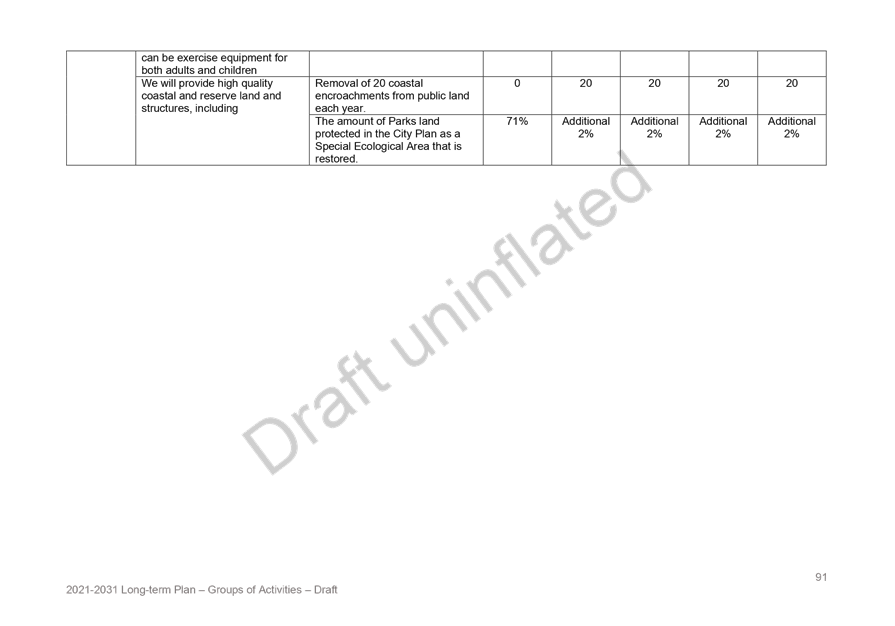





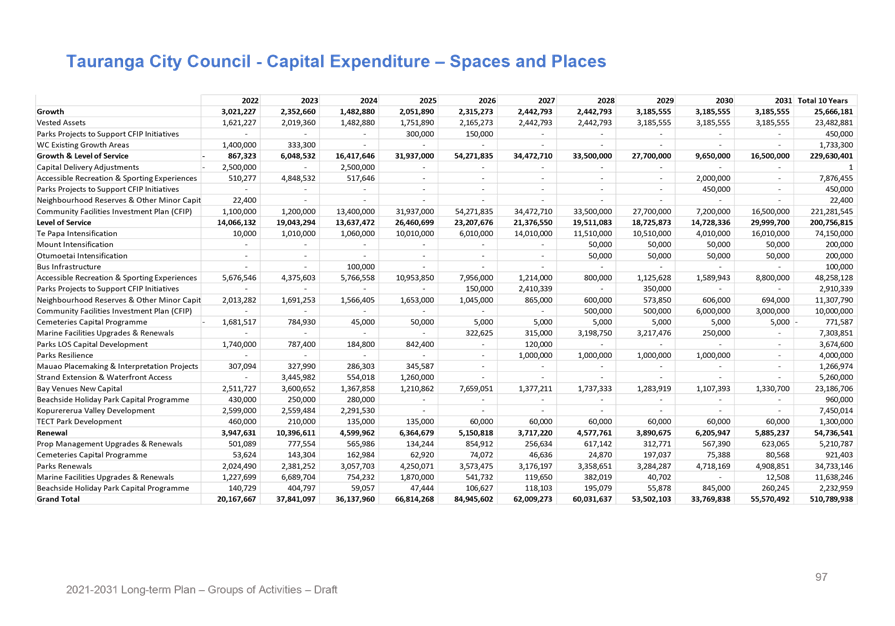


|
Ordinary Council Meeting Agenda
|
29 March 2021
|







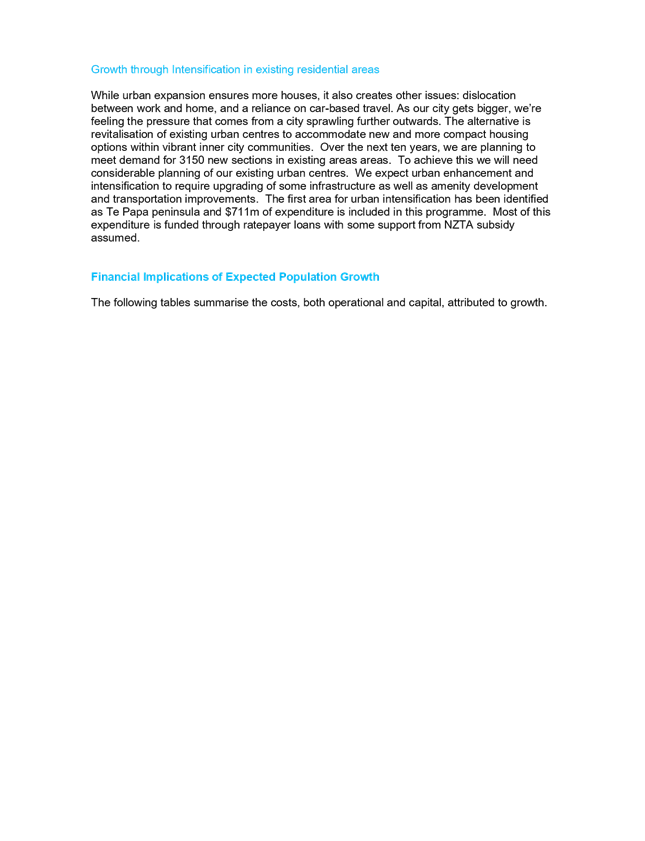
|
Ordinary Council Meeting Agenda
|
29 March 2021
|


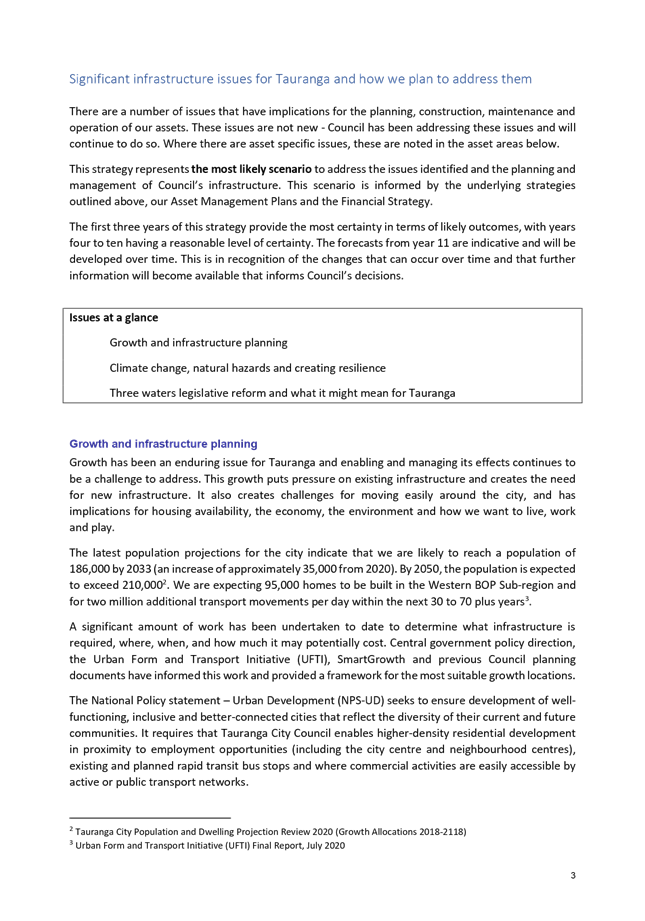
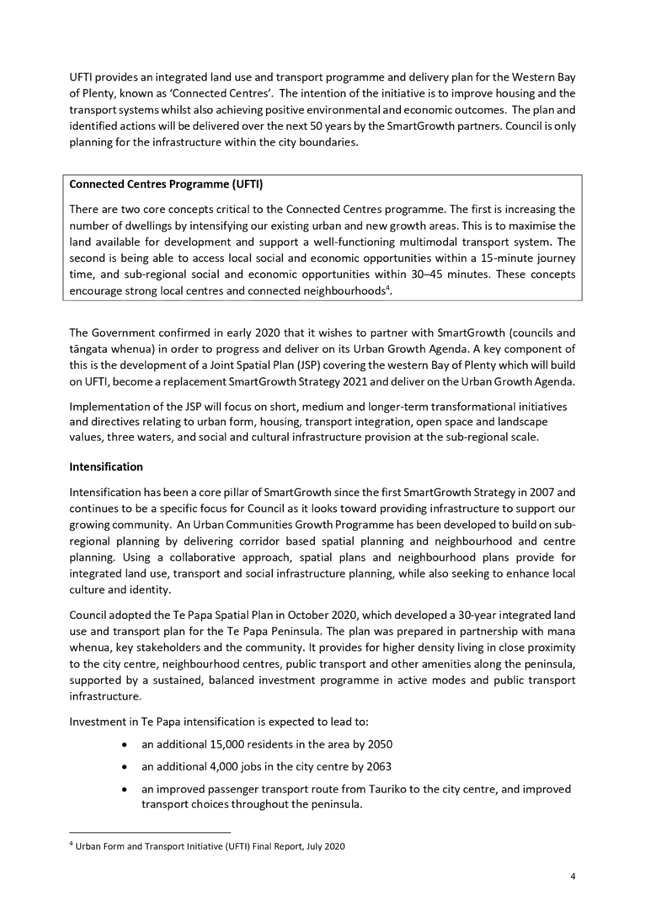
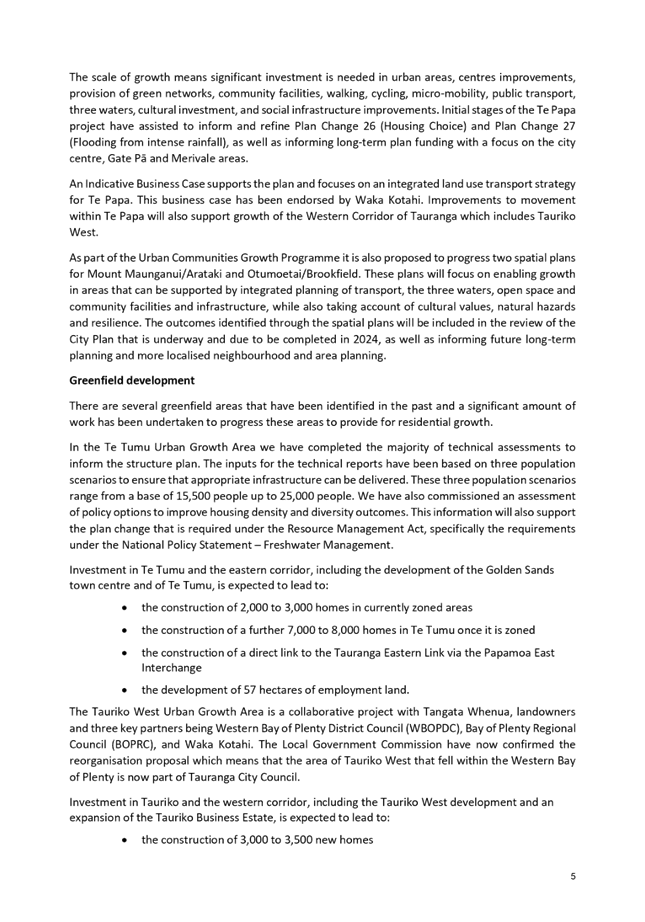
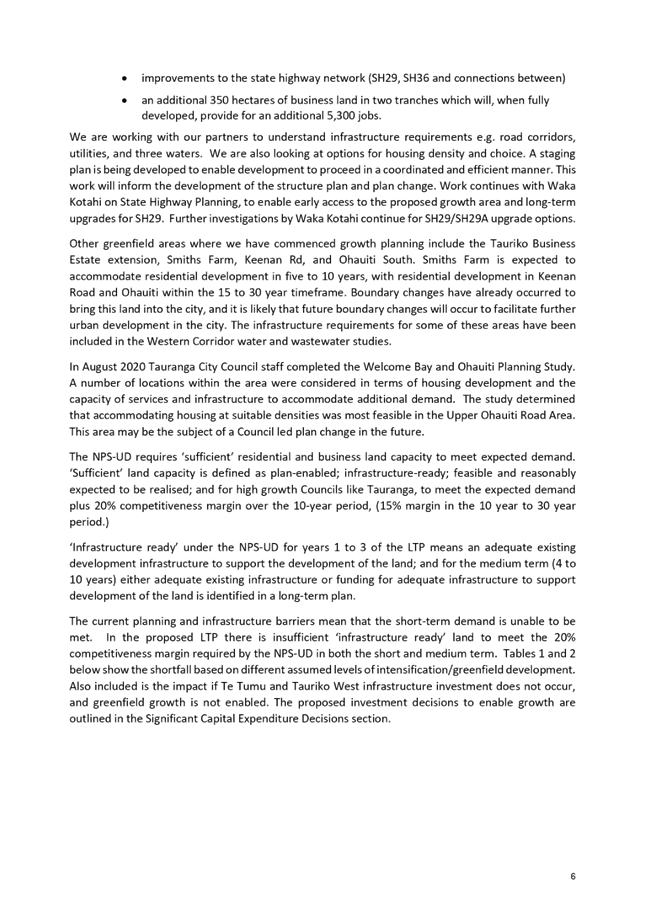

|
Ordinary Council Meeting Agenda
|
29 March 2021
|







|
Ordinary Council Meeting Agenda
|
29 March 2021
|

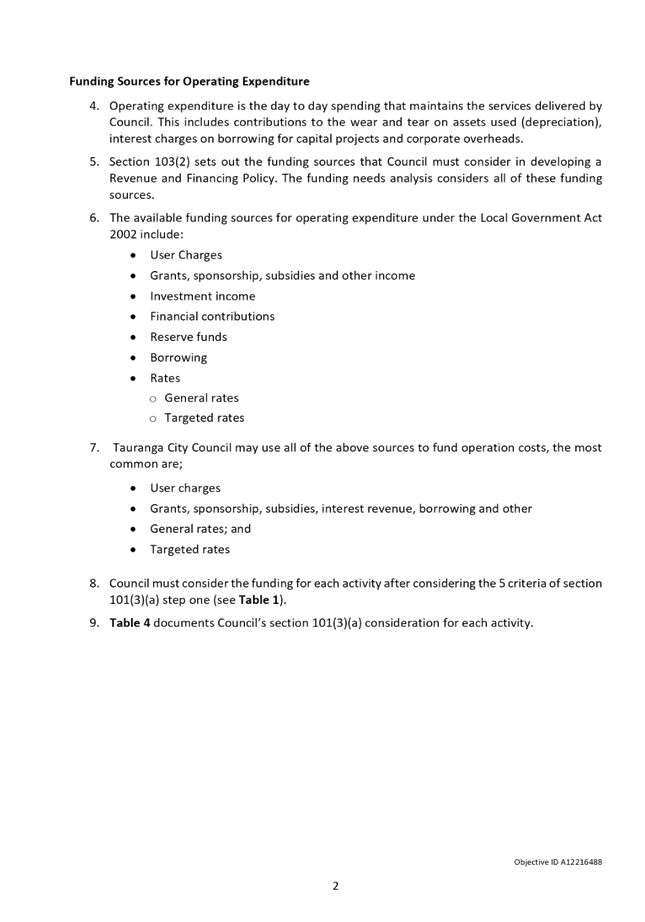



11.3 Expected
increases to the development contribution fees in 2022 financial year
File
Number: A12259278
Author: Ana
Blackwood, Development Contributions Policy Analyst
Authoriser: Christine
Jones, General Manager: Strategy & Growth
Purpose of the Report
1. To highlight to the
Council the expected changes to the 2021/22 Development Contributions Policy
compared to the operative policy.
|
Recommendations
That the Council:
(a) Notes the contents of the
report and that a draft 2021/22 Development Contributions Policy which
includes the fees discussed in the report will be brought to the Council to
consider for adoption in May 2021.
|
Executive Summary
2. Tauranga
City Council uses Development Contributions to fund growth related capital
expenditure. Development contributions are set on a cost recovery basis
in line with the expected cost of infrastructure, hence as infrastructure costs
rise so do development contribution charges. A new Development
Contributions Policy (DCP) is adopted each financial year to ensure that the
fees charged are reflective of adopted capital expenditure budgets.
3. The
Local Government Act 2002 (LGA) requires that a draft version of the DCP is
circulated for public consultation prior to being adopted. A draft 2021/22 DCP
will be brought to Council to adopt in May this year and will then be
circulated for public consultation alongside the Long-Term Plan alongside
targeted engagement on the DCP with the development and building community.
4. There
will be several relatively minor changes to the content of the draft 2021/22
DCP compared to the operative DCP. These changes will be outlined within the
Statement of Proposal prepared for consultation but should not have any
significant affects to the overall implementation.
5. The
only significant changes to the DCP relate to the development contribution
fees.
6. Attachment
A shows a comparison of the fees in the operative 2020/21 DCP compared to the
expected fees for the 2021/22 DCP. Most of the fees will fluctuate within a
margin of 0 and 2% however there is a significant increase in the Citywide
development contributions and in local development contributions for both the
Pyes Pa West and the Wairakei catchments.
7. The
causes for the increases in the Wairakei and Pyes Pa West fees are essentially
increased capital expenditure costs for a few specific capital projects
remaining to be delivered in those catchments. Specific details regarding which
projects have increased and by how much will be detailed within the Statement
of Proposal which will be issued alongside the Draft DCP. The developers in
those catchments who will be impacted by the changes will have the opportunity
to review these costs and can submit through consultation process if they wish
to do so. However, it is noted that most development in these catchments
is completed, underway or already consented and therefore not subject to any
increase in charges.
8. The
rest of this report focuses on the increase in the citywide development
contributions.
9. TCC
have been signalling an expected increase in the citywide development
contributions payable of building consents for several years. The operative DCP
indicates that the increase was expected to be between $5,000 and $9,000 per
residential dwelling compared to the 2020/21 citywide development contribution
fee. However, based on latest costs the quantum of the increase is now in the
ballpark of $14,000 per dwelling (plus GST).
10. The
primary cause of this increased citywide contribution is that we will start
collecting for the Waiari Water Supply Scheme (WWSS) as the capacity of the
existing water treatment plants has now been reached. The total capital cost
related to the WWSS which is funded by development contributions is over $254 million. At the time of putting together
last year’s DCP is was around $100m less.
11. $50 million of this relates to increased
costs of construction and $50 million is because the scope of works being
funded via development contributions has expanded to include a large water main
required to feed water into Mount Maunganui to complete the scheme. This water
main was previously costed much lower and was scheduled to be constructed
outside of the 10-year plan period and was to be funded via contributions
introduced at a later point. The works are now being completed in this
long-term plan period and it is appropriate to fund them as part of the same
package of works.
12. The increased capital costs and change in
scope triggered staff to review the funding methodology to ensure that the
principals adopted were still appropriate.
13. Section
197AB (B) of the LGA states that…”development contributions
should be determined in a manner that is generally consistent with the capacity
life of the assets for which they are intended to be used and in a way that
avoids over-recovery of costs allocated to development contribution funding:”
14. It
is difficult to determine an exact capacity life for the works as it will
depend on several factors including average water demand, future growth
projections, household occupation levels, and potential future limits on water
take. Assumptions on these issues can be varied but all models show that the
expected capacity life of the full package of works will be between 30 and 50
years.
15. Table
2 below shows a comparison of the citywide contribution charge per household
using 30-year capacity life, 40 years and 50 years. Essentially, extending the
capacity life will decrease the base charge paid per household but this is
offset by an increase in interest costs associated with extending the debt
repayment period.
16. The
longer capacity life also increases balance sheet risks associated with the
debt, increases interest rate risk and the risk that some of the costs will not
be paid for by the growth community (i.e. if the project has reached capacity
before the 50-year period then could not continue to collect costs from the
growth community).
17. For
these reasons the fee that is proposed to be used in the 2021/22 DCP is based on
the fee shown in Option 1.
Table 2.
Models on Waiari Water Supply Funding – 100% growth funding
|
|
Capacity life/funding
period
|
Growth
(HUEs)
|
Base cost per HUE
|
Total costs of
capital, inflation & low demand costs
|
$ per household
|
|
Option 1
|
30 years
(2022-2052)
|
30,685
|
$10,902
|
$5,582
|
$16,484
|
|
Option 2
|
40 years
(2022-2062
|
35,437
|
$ 9,796
|
$5,951
|
$15,747
|
|
Option 3
|
50 years
(2022-2072
|
40,000
|
$ 8,981
|
$6,411
|
$15,392
|
18. Staff
also looked at models for the costs if the project was not entirely funded by
development contributions. In the table below the same assumptions have
been used as above but only funding 90% of the costs with development
contributions. This model would assume that 10% of the costs are funded
via other sources – most likely to be borne by rates.
Table 3.
Models on Waiari Water Supply Funding – 90% costs funded via growth
|
|
Capacity life
|
Growth
(HUEs)
|
Base cost
|
Total costs of
capital, inflation & low demand costs
|
$ per household -
with 90% growth funding
|
|
Option 4
|
30 years
(2022-2052)
|
30,685
|
$10,077
|
$5,059
|
$15,136
|
|
Option 5
|
40 years
(2022-2062
|
35,437
|
$ 9,081
|
$5,391
|
$14,472
|
|
Option 6
|
50 years
(2022-2072
|
40,000
|
$ 8,347
|
$5,786
|
$14,133
|
19. This
option of non-growth funding has not previously been explored by the Council as
it is not in line with the growth pays for growth principal The need for
the WWSS is driven entirely by the growth community and if no further growth
was to occur then it is unlikely these works would be required unless
significant reductions were made to existing water take consents through
upcoming reconsenting processes. However consideration will be given to whether
the wider community will receive some benefits from the WWSS for example
through better resilience and security of supply.
20. Given
the significance of the increase and the likely opposition from the building
community, staff have sought external consultant advice regarding the funding
and cost allocation of the project – in particularly to consider the
concept of using a portion of non-growth funding. We are awaiting advice and
recommendations on this matter but expect that there will remain a solid
rationale for at least the vast majority of project costs to be funded via
development contributions.
Increase
in the wastewater charge
21. It
should be noted that there has also been an increase of nearly $1,000 for the
citywide wastewater charge. This increase is due to increased capital
expenditure budgets related to the Te Maunga Wastewater Treatment Plant and
starting the collection of contributions for a third clarifier required to
provide for further growth.
Significance
22. The
Local Government Act 2002 requires an assessment of the significance of matters,
issues, proposals and decisions in this report against Council’s
Significance and Engagement Policy. Council acknowledges that in some
instances a matter, issue, proposal or decision may have a high degree of
importance to individuals, groups, or agencies affected by the report.
23. In
making this assessment, consideration has been given to the likely impact, and
likely consequences for:
(a) the current
and future social, economic, environmental, or cultural well-being of the
district or region
(b) any persons who are likely to be
particularly affected by, or interested in, the issue, proposal, decision, or
matter
(c) the capacity of the local authority to
perform its role, and the financial and other costs of doing so.
24. In
accordance with the considerations above, criteria and thresholds in the
policy, it is considered that the issue is of medium significance. This is
because the matter will form part of the draft DCP which will be consulted on
Next Steps
25. The fees stated within this
report will be included within the Draft Development Contributions Policy which
will be brought to Council to adopt early May 2021. The draft policy will be
circulated for public consultation with the key message being the increase in the
citywide development contribution.
26. It would be expected that this
increase will receive significant attention as the quantum of the increase far
exceeds any figure that has been signalled in past years. Some in the building
community offer fixed priced housing developments meaning that any unexpected
cost increases will be borne by the building contractors.
27. The development community will
have the opportunity to submit on the matter through the consultation process
and the Council can consider if it wants to make any potential changes to the
funding methodology following the consultation process.
Attachments
1. Council
Report - March 2021 - Increased citywide DC fees - A12356516 ⇩ 
|
Ordinary Council
Meeting Agenda
|
29 March 2021
|
|
|
|
2020/21 DC Fees
|
Proposed 2021/22 Fees
|
Percentage increase
|
|
Citywide
|
$ per
household
|
$10,616
|
$24,485
|
131%
|
|
Bethlehem
|
$ per
lot / household
|
$12,551
|
$12,344
|
2%
|
|
Ohauiti
|
$ per
lot / household
|
$11,185
|
$11,242
|
0.5%
|
|
Papamoa
|
$ per
lot / household
|
$8,729
|
$8,574
|
-1.8%
|
|
Pyes Pa
|
$ per
lot / household
|
$6,798
|
$6,798
|
0%
|
|
Pyes Pa West
|
$ per
lot / household
|
$29,972
|
$33,143
|
10.6%
|
|
Tauranga Infill
|
$ per
lot / household
|
$3,614
|
$3,676
|
1.7%
|
|
Tauriko
|
$ per
hectare
|
$387,117
|
$381,175
|
-1.5%
|
|
Wairakei:
Sub catchment A
Sub catchment B
Sub catchment C
|
$ per
hectare
|
$505,329
$353,705
$655,020
|
$578,547
$425,849
$622,142
|
14.5%
20.4%
-5.0%
|
|
Welcome Bay
|
$ per
lot / household
|
$8,498
|
$8,514
|
0.2%
|
|
West Bethlehem
|
$ per
hectare
|
$372,880
|
$381,632
|
2.3%
|
Table 1.
Comparison of proposed development contribution fees to operative 2020/21 fees
11.4 Adoption
of the Procurement Policy 2021
File Number: A12090560
Author: Angela Murray, Team Leader: Procurement
Emma Joyce,
Policy Analyst
Authoriser: Paul Davidson, General Manager: Corporate Services
Purpose of the Report
1. To
adopt the draft Procurement Policy 2021 (the draft policy) (attachment one).
|
Recommendations
That the Council:
(a) Adopts the
draft Procurement Policy 2021.
(b) Delegates
authority to staff to undertake minor editorial changes for the purposes of
correction or clarification.
|
Executive Summary
2. Council’s current Procurement Policy is ten years old
and required review to ensure it remained fit for purpose and reflected
contemporary procurement practices. The Policy Committee (the Committee) agreed
preferred options in response to issues with the current policy at its December
2020 meeting. The preferred options have been incorporated into the attached draft
policy for adoption.
3. The draft policy also includes a clause
requiring staff to have regard to including Māori, Pasifika and social
enterprises in contract opportunities. As this issue was not addressed in the
December 2020 report, this report includes commentary in this regard and recommends
that this matter be included in the draft policy for adoption.
Background
4. The current policy was adopted in 2011 and
reflects the “value for money” approach to procurement of the time.
At its December 2020 meeting, the Committee agreed to update the policy to
better reflect public value, including a broader outcomes approach to
procurement preferred by the Government and other local authorities.
5. A
copy of the resolutions is provided below (PO13/20/7);
That the Policy Committee:
(a) Agree
that a draft Procurement Policy be reported back to the committee reflecting
the following amendments;
(i) a revised
policy purpose recognising the role of sustainable procurement activity in
supporting broader social, cultural, economic and environmental outcomes
(ii) including strategic
objectives for procurement as recommended by staff and to include “Recognise
suppliers that pay a living wage”
(Staff recommendations are:
· Encourage procurement that demonstrates a positive environmental
impact
· Encourage procurement that supports goal of the Waste Management and
Minimisation Plan (WMMP)
· Encourage procurement that supports transition to low carbon economy
and building resilience to impacts of climate change
· Procurement that creates high quality, local employment
opportunities
· Encourage procurement that creates opportunities to increase access
to local training and education programmes that benefit local industry
· Encourage procurement that demonstrates positive local economic
outcomes)
In Favour: Crs Larry Baldock, Bill Grainger, Heidi Hughes, John
Robson and Deputy Mayor Tina Salisbury
Against: Crs Steve Morris, Dawn Kiddie, Kelvin Clout and Andrew
Hollis
CARRIED 5/4
(iii) revised general
procurement principles to achieve public value, act in a fair and transparent
manner, be sustainable and work together
(iv) increased thresholds
allowing direct procurement up to $250,000 and delegating authority to the
Chief Executive to exempt certain procurement with a total value of no more
than $500,000 from the open competition requirement
(v) increasing the
threshold for closed competition to $250,000
(vi) requirement for variations
to only be approved where there is no change in project deliverable and there
are demonstrated significant logistical, economic, or timing benefits to
varying a contract.
(b) Agree
to remove the business process guidance included in the current procurement
manual to a separate procurement manual.
CARRIED
6. These
options have been incorporated into the draft policy to be adopted.
7. The
Government introduced a new target for Māori procurement in December 2020
after the issues and options report had been drafted and considered by the
Committee. This target emphasises the need for public sector agencies to
consider Rule 17 of the Government Procurement Rules (the Rules) to support
Māori and Pasifika businesses and social enterprises when undertaking
procurement processes. While the December 2020 Committee resolutions to include
broader outcomes in the policy suggest alignment with this rule, it is
recommended that Council consider making an explicit provision in the draft
policy supporting Māori and Pasifika businesses and social enterprises.
This is discussed at option one below.
8. An
external peer review of the draft policy recommended including a statement in
the policy requiring procurement plans to be prepared for high risk and high
value procurements. The addition of this provision (clause 6.7.4 of the draft
policy) recognises that the proposed new financial thresholds require increased
accountability and transparency.
9. Similarly,
feedback from a peer review of the draft policy by staff at the Ministry for
Business, Innovation and Employment highlighted the need for robust policy
direction to satisfy audit requirements. In response to that advice, option two
discusses whether to amend the draft policy provisions on variations.
10. While
no other changes to the draft policy were made as a result of the two external
peer reviews, feedback on handling risk and conflicts of interest will be
captured in the procurement manual.
Options Analysis
11. The
draft policy includes a statement noting that procurement should have regard to
opportunities for social enterprises and Māori and Pasifika businesses as
per rule 17 of the Rules. This ensures that council’s approach to
procurement is consistent with the Rules and the overall policy purpose to
deliver public value (incorporating the broader outcomes).
12. Local
authorities are not required to adhere to the Rules. However, the draft policy
is generally consistent with the Rules as they represent good procurement
practice.
Issue 1 – Including provision
requiring staff to have regard to opportunities for Māori and Pasifika
businesses and social enterprises
|
Option
|
Advantages
|
Disadvantages
|
|
1
|
Include explicit provision requiring having regard for Māori
and Pasifika businesses and social enterprises
(recommended)
|
· Consistent with recommendation to include broader outcomes in the
policy
· Consistent with other councils and the Government Procurement
Rules
|
· May be seen to privilege certain suppliers
|
|
2
|
Do not include explicit provision requiring having regard for
Māori and Pasifika businesses and social enterprises
|
· Nil
|
· Inconsistent with broader outcomes approach in the draft policy.
· Inconsistent with other councils and the Government Procurement
Rules
|
Issue
2 - Variations
13. The
Committee resolved to only allow variations where there was no change in scope.
However, the draft policy has now been amended to provide for variations where
there is a “justifiable change in scope” and demonstrated
significant logistical or economic advantages. This is in response to staff
concerns that only allowing a variation where there is no change in scope would
be impractical, particularly an engineer’s variation under a New Zealand
Standard (NZS) 3910 contract for building and civil engineering construction.
Variations first require the approval of the procurement team before approval
from the Chief Executive or their delegate.
14. While
the external peer reviews gave no specific feedback on variations, both reviews
emphasised the importance of robust policy direction and documenting all parts
of the procurement process. Providing for variations subject to conditions is
consistent with this recommendation.
|
Option
|
Advantages
|
Disadvantages
|
|
1
|
Allow variations where there is a “justifiable change in
scope” (as in draft policy) (recommended)
|
· Recognises that variations are sometimes required in response to
the on the ground activity
|
· Potential to receive variation requests where there is significant
change in scope
|
|
2
|
Allow variations where there is no change in scope (as agreed in
December 2020)
|
· Limiting variations and requiring new procurement process may
support transparent procurement
|
· May not provide for engineer’s variation under a NZS 3910
contract, necessitating new procurement process.
|
Issue
3 – Policy adoption
15. Council
could choose to
· adopt the policy,
· adopt the policy subject to amendments agreed at this meeting,
· adopt the policy subject to public consultation, or
· not adopt the policy.
16. The
advantages and disadvantages of each option are outlined in the table below.
|
Option
|
Advantages
|
Disadvantages
|
|
1
|
Adopt the draft policy as appended at attachment one
(recommended)
|
· Ensures council procurement activity supports broader outcomes
· Consistent with procurement approach by government and other
councils to seek public value from procurement activity
· Supports good procurement practice
· Policy limits procedural detail
· Consistent with decisions made at December 2020 Policy Committee
meeting
|
· Nil
|
|
2
|
Adopt the draft policy subject to any amendments made at this meeting.
|
|
3
|
Adopt the draft policy subject to public consultation
|
· Provides opportunity for public to give feedback on draft policy
|
· Decision to adopt policy is of low significance
· Potential delays in taking smaller value projects to market that
would be subject to the revised thresholds in the draft policy.
|
|
4
|
Do not adopt the policy (retain current policy)
|
Nil
|
· Inconsistent with current procurement approach
· Policy retains a focus on value for money and limited attention to
broader outcomes
· Limited separation of policy considerations from procedural
(operational guidance)
· Inconsistent with decisions made at December 2020 Policy
Committee.
|
Other issues
17. The
Committee agreed in December 2020 that the Chief Executive be delegated
authority to exempt procurement from the open competition requirement up to
$500,000. In order to be consistent, the draft policy also delegates this
authority for closed competition procurement.
Strategic / Statutory Context
18. The
draft policy helps ensure council meets its legislative obligation to undertake
“commercial transactions in accordance with sound business
practices” and “ensure prudent stewardship and the efficient and effective
use of its resources”. The incorporation of the broader outcomes into the
policy also recognises the re-introduction of the four well-beings to the Local
Government Act 2002.
Financial Considerations
19. Including consideration of broader
outcomes through the addition of extra non-financial weighted attributes in
procurement plans may increase the overall cost of the product or service.
While good procurement outcomes are not necessarily about the lowest price, it
is important to note that good procurement outcomes require balanced judgement
of financial and non-financial factors related to the procurement. A public
value approach to procurement recognises this need to balance price and fit for
purpose products and services with achieving broader outcomes.
Legal Implications / Risks
20. The
draft policy requires staff to seek approval from the NZTA to use the
provisions of this policy when undertaking transport-related procurement. As an
approved organisation under the Land Transport Management Act 2003 (LTMA 03),
council must meet the provisions of that Act to achieve best value for money
and uphold competitive supplier markets. The NZTA Procurement Manual ensures
approved organisations meets those provisions. However, approved organisations
can use other procurement methodologies with the approval of the NZTA and
assurance that they meet the LTMA 03 provisions.
21. The
recommendation to adopt the draft policy does not increase council’s
exposure to climate change risk. However, the policy includes strategic
objectives encouraging procurement that supports low carbon outcomes.
Consultation / Engagement
22. Feedback
from the social, environmental and economic sectors was incorporated into the
December 2020 issues and options report. In particular, the draft policy has a
larger recognition that procurement can support broader social and
environmental outcomes such as job creation and low carbon procurement.
23. The
December 2020 issues and options report was informed by discussions with staff
from across the council organisation. Staff supported increasing the thresholds
for open and closed competition noting that these thresholds set in 2009 were
relatively low given the scale of current council procurement.
24. No additional
consultation or engagement is recommended.
Significance
25. The
recommendations are of low significance, do not affect the wider public and are
a logical extension of previous decisions.
Next Steps
26. The
draft policy will come into effect on 3 May 2021. This provides procurement
staff with sufficient time to make consequential amendments to existing staff
guidance and the procurement manual arising from the policy adoption.
Attachments
1. Draft Procurement Policy 2021
for adoption - A12362143 ⇩

|
Ordinary Council
Meeting Agenda
|
29 March 2021
|
 Draft
Procurement Policy 2021
Draft
Procurement Policy 2021
|
Policy
type
|
City
|
|
Authorised
by
|
Council
|
|
First
adopted
|
15
June 2011
|
Minute
reference
|
M11/39.01
|
|
Revisions/amendments
|
10
April 2012
9 October 2012
9 November 2015
28 July 2016
x x 2021
|
Minute
references
|
M12/17.2
M12/65.3
M15/79.7
M16/49.4
|
|
Review
date
|
This
policy will be reviewed every three years or earlier if required.
|
1. Purpose
1.1 To
support Council to achieve public value through consideration of broader
outcomes and ensuring value for money and fit for purpose products, services,
or works.
1.2 To establish a clear
framework of good procurement practice, accountability, and sustainability that
supports a consistent approach to procurement across the council organisation.
2. Scope
2.1 The
policy applies to all procurement of any value for products, services, or
works, undertaken by or on behalf of Tauranga City Council.
2.2 The
policy does not apply to the following activities:
· Employment (excluding the engagement
of contractors and consultants to supply services)
· The acquisition, disposal or lease
of land or buildings (except the design, construction or refurbishment of
buildings)
· Disposals and sales of Council
assets
· Investments, loans, guarantees, or
other financial instruments
· Gifts, donations and grants
· Acquisition of art and similar
unique items of interest
· Licenses and agreements regarding
commercial operations carried out by third parties (traders) on Council
property
· Non-contractual agreements between
public sector agencies, such as memorandums of understanding
· Statutory or ministerial
appointments.
2.3 Council
may depart from this policy to undertake urgent procurement required to provide
emergency assistance and welfare relief. In the context of this policy
an emergency is defined as an event which results in one or more of the
following;
· Employees,
public, supplier, property or equipment being placed in immediate risk
· Standards
of health, welfare or safety having to be re-established without delay
· The
significant impairment of the Council’s delivery if the Council failed to
respond promptly
· Emergency
works authorised under section 330 of the Resource Management Act 1991
· A
declared or undeclared response to an emergency as defined in the Civil Defence
and Emergency Management Act 2002.
2.4 Any
departure from this policy due to an emergency must be fully justified and
documented during or after the event. A lack of planning does not constitute an
emergency for the purposes of this policy.
3. Definitions
|
Term
|
Definition
|
|
All of Government (AOG) Deal
|
a
supply arrangement established by the Crown for selected common products and
services purchased across Government.
|
|
Broader
outcomes
|
the
secondary benefits that are generated from the procurement activity. They can
be environmental, social, economic or cultural benefits.
|
|
Closed competition
|
where
a limited number of known suppliers are invited to respond to a contract
opportunity. The invitation is not openly advertised.
|
|
Council
|
Tauranga City Council - the
elected member body representing Tauranga City
|
|
Direct Procurement
|
where
a single supplier is approached and engaged to provide products, services or
works. The contract opportunity is not advertised.
|
|
Framework Agreement
|
an umbrella agreement which
governs the relationship between TCC and the supplier(s). It sets out the
terms and conditions which the parties agree to contract on in the event that
the supplier is allocated a contract for supplying the covered goods,
services or works.
|
|
Market Engagement Approach
|
a formal process of inviting
potential suppliers to make a submission to supply Council with products,
services or works. Submissions sought from suppliers are typically in the
form of tenders, quotes, proposals or registrations of interest. The process
used in the market engagement involves Open Competition, Closed Competition
or Direct Procurement.
|
|
Open Competition
|
a
competitive procurement process where all potential suppliers in a market are
offered an opportunity to respond to a supply opportunity.
|
|
Panel
|
a list
of suppliers which AOG or council has pre-approved, via an open competitive
process to supply particular goods, services or works.
|
|
Procurement
|
all
aspects of acquiring and delivering products, services and works.
|
|
Public Value
|
public
value means the best available result for the money spent. It includes using
resources effectively, economically, and responsibly, and taking into account
the purpose of local government and the total costs and benefits of a
procurement (total cost of ownership). The principle of public value when
procuring goods, services or works does not mean selecting solely based on
lowest price but rather the best possible outcome for the total cost of
ownership (over the whole-of-life of the goods, services or works).
|
|
Supply Arrangement
|
an
arrangement between Council and a supplier for the provision of products,
services or works.
|
|
Sustainable Procurement
|
securing
products, services, or works in a way which recognises the whole of life
costs, benefits of the goods or service and delivers broader outcomes for the
local Tauranga and the wider Bay of Plenty community, economy and
environment.
|
|
Total Value
|
the
value of the Supply Arrangement over its entire term, including all renewal
periods (where applicable). Where the Supply
Arrangement is governed by separate contracts, the total value of the supply
arrangement is the combined value of all the contracts.
|
4. Strategic
Procurement Objectives
4.1 Council
has adopted strategic procurement objectives to support achievement of public
value:
· Encouraging
procurement that demonstrates a positive local economic outcome
· Procurement that
creates high quality, local employment opportunities
· Encourage
procurement that creates opportunities to increase access to local training and
education programmes that benefit local industry
· Encouraging
procurement that demonstrates a positive environmental impact
· Encourage
procurement that supports the goal of the Waste Management and Minimisation
Plan (WMMP)
· Encourage
procurement that supports transition to low carbon economy and building resilience
to impacts of climate change
· Recognition of
suppliers that pay a living wage.
These
objectives will be supported by the following general procurement principles.
5. Principles
5.1 The following
principles underpin procurement at Tauranga City Council
· Achieve public value
· Be sustainable
· Work together
· Act in a fair and transparent manner
6. Policy
Statement
6.1 Achieve
public value
6.1.1 Public
value is achieved by considering the contribution the goods, services or works
make to achieving Council’s community outcomes, strategic direction, and
the strategic objectives for procurement included in this policy.
6.1.2 Achieving
public value requires Council to promote open and effective competition between
capable suppliers.
6.1.3 Broader
outcomes to be achieved through the procurement activity are identified early
in the project and procurement planning stages. Procurement assessments will not
always default to the cheapest solution at the cost of promoting social,
economic, environmental, or cultural outcomes.
6.1.4 Delivering broader outcomes
requires consideration of how to effectively involve small to medium-sized
businesses, Māori and Pacific businesses and social enterprises in
procurement opportunities.
6.1.5 Achieving public value also
requires consideration of the costs and benefits over the lifetime of the
goods, services or works, being open to new and innovative solutions and seeking
opportunities to promote local outcomes.
6.2. Be Sustainable
6.2.1 All procurement decisions must
consider how the procurement will positively impact the economic,
environmental, social and cultural well-being of Tauranga.
6.2.2
Sustainable procurement principles will be considered when
planning and undertaking all procurement, including when undertaking
cost-benefit analyses or weighted attributes assessments of potential goods and
service suppliers.
6.2.3 Council
encourages suppliers it works with to have a sustainability policy.
6.3 Work Together
6.3.1 Council values effective and
honest relationships with suppliers and other stakeholders involved in
procurement activities. Developing long term and mutually beneficial
relationships with potential suppliers will support Council in achieving public
value.
6.3.2 Council acknowledges that
procurement processes can be time-consuming and costly for suppliers. Council
will endeavour to design its market engagement approaches and processes so that
it is easy to do business with.
6.3.3 Council will consider
collaboration with other similar organisations and its council-controlled
organisations when planning procurement.
6.3.4 Council
actively seeks and supports innovative, agile, and collaborative supply
arrangements from the supply market.
6.3.6 Council recognises its role in
supporting suppliers (particularly new or local suppliers) to become familiar
with its procurement processes to ensure ongoing competition in the market and
to support local broader outcomes.
6.4 Act
in a fair and transparent manner
6.4.1 Council remains impartial and
actively identifies and manages any actual or perceived conflicts of interest.
All employees, consultants, and contractors involved in procurement processes
must register any actual, potential, or perceived conflicts of interest.
6.4.2 Council
will meet its legislative requirements under the Health and Safety at Work Act
2015. All suppliers who undertake contract works that present a health and
safety risk must be pre-qualified under council’s approved health and
safety requirements.
6.4.3 Council
will not intentionally avoid applying the open competition requirement by
dividing a planned procurement into separate components.
6.5 Financial
thresholds and exemptions
|
Procurement Value (excluding GST)
|
Procurement Method
|
Conditions and exemptions
|
|
$0 to $250,000 (excluding GST)
|
Staff may use direct procurement, closed competition or open
competition.
|
For the avoidance of doubt open competition is still possible at
these amounts, and the higher the value, the more consideration should be
given to open competition (in accordance with the principles of this policy).
Staff should also consider workload and impact on the supplier market
when considering use of open competition processes for lower value
procurements.
|
|
$250,000 to $500,000
(excluding GST)
|
Open competition is required unless exemption approved by the Chief
Executive.
|
The use of direct procurement or closed competition must meet one or
more of the valid exceptions to open competition listed in schedule one to
this policy.
|
|
Total value greater than $500,000 (excluding GST)
|
Open competition is required unless exemption approved by Council.
|
Council (or a subordinate Council decision-making body delegated
authority for approving financial expenditure) may determine the use of
direct procurement or closed competition.
The use of direct or closed procurement must meet one or more of the
valid exceptions to open competition listed in schedule one to this
policy.
|
6.6 Variations
6.6.1 All
variations to agreed supply arrangements must meet the criteria outlined at
schedule two of this policy and follow the process outlined in the Procurement
Manual.
6.7 Other
matters
6.7.1 Where
the procurement is part-funded by Waka Kotahi New Zealand Transport Agency,
agreement from the agency is required before applying this policy, including
the financial thresholds for direct appointment and closed competition.
6.7.2 The
participation in and use of all of government (AOG) deals or syndicated deals (where
a group of organisations with common needs have aggregated their requirements
under a single contract) satisfies the requirement for open competition where
the applicable deal was established as a result of an open competitive
procurement process.
6.7.3 The
use of an AOG or council panel of suppliers or framework agreement satisfies
the requirement for open competition where it was established as a result of an
open competitive process.
6.7.4 All
procurements over $100,000 (excluding GST), or determined to be high risk and
high complexity, must have a documented procurement plan authorised by the
Procurement team, the person with delegated financial authority for the
contract and relevant senior manager.
Note:
Please refer to the Procurement Manual for guidance on what may be a
high risk procurement.
6.7.5 Throughout the procurement process,
risk must be identified and managed in accordance with the Risk Management
Policy.
7. Relevant
Delegations
7.1 The Chief
Executive or their sub-delegate is delegated authority to implement this
policy.
8. References and
Relevant Legislation
· Local
Government Act 2002
· Land
Transport Management Act 2003
· Health
and Safety at Work Act 2015
· Civil
Defence and Emergency Management Act 2002
· Government
Policy Statement on Transport
· The
Ministry of Business, Innovation and Employment’s (MBIE) Government
Procurement Rules: rules for sustainable and inclusive procurement and the
Principles of Government Procurement
· The
Office of the Auditor-General’s (OAG) Procurement Guidance for Public
Entities 2008
· The
NZTA Procurement Manual for activities funded through the National Land
Transport Programme
· NZS
3910:2013 – Conditions of contract for building and civil engineering
construction.
· Construction
Sector Accord.
9. Associated
Policies/Procedures
· Procurement
Manual
· Risk
Management Policy
· Sensitive
Expenditure Policy
· Significance
and Engagement Policy
· Staff
Financial Delegations
· Tauranga
City Council Corporate Conflicts of Interest Policy
· Waste
Management and Minimisation Plan
10. Schedules
Schedule one: Valid reasons for
exemption to open competition
|
Valid reasons for exemption to open competition
|
|
If only one supplier, or certain suppliers are able
to meet highly specialised or technical requirements and it can be verified
that there are no reasonable alternatives.
|
|
If only one supplier, or certain suppliers are in a
unique position to minimise cost or risks and it can be verified that there
are no other reasonable alternatives to minimise cost or risk.
|
|
If a certain supplier or suppliers are in a unique position to assist
Council achieve a strategic objective and it can be verified that there are
no reasonable alternatives.
|
|
If no acceptable responses were received through
open competition for the same core requirements, carried out within the last
12 months.
|
|
If the products, services or works are an addition
to, and necessary for the complete delivery of an existing supply
arrangement, provided that; the original supply arrangement was openly
advertised; and a change of supplier cannot be made for economic, technical
or practical reasons.
|
|
If the purchase is for a prototype for research,
experiment, study or original development.
|
|
Products purchased on a commodity market.
|
|
Procurement in exceptionally advantageous conditions
that only exist for the very short term.
|
|
The contract is awarded to the winner of a design
contest.
|
Schedule two: Valid reasons to
approve a variation
11.5 Adoption
of the draft Community Funding Policy 2021 for consultation
File Number: A12167244
Author: Emma Joyce, Policy Analyst
Ariell King,
Team Leader: Policy
Anne
Blakeway, Manager: Community Partnerships
Authoriser: Gareth Wallis, General Manager: Community Services
Purpose of the
Report
1. To
adopt the draft Community Funding Policy 2021 (attachment one) for community
consultation as part of the draft Long-term Plan 2021-31 process.
|
Recommendations
That the Council:
(a) Adopts the
draft Community Funding Policy 2021 for consultation as part of the draft
Long-term Plan 2021-31 process.
|
Executive Summary
2. The
draft Long-term Plan 2021-31 (LTP) includes a draft budget to establish a
community grant fund to enable Council to better support community
organisations. In developing the proposed fund, staff sought approval to
develop a new Community Funding Policy to guide administration of council
funding provided to community groups or iwi and hapū organisations.
3. The
value of the proposed fund is $1.81 million based on the Policy Committee
recommendation from 20 October 2020.
4. This
report requests that the draft policy be adopted for community consultation.
Consultation is planned to be undertaken alongside the consultation for the LTP.
Background
5. At
its 20 October 2020 meeting, the Policy Committee agreed to set aside $1.81
million in the draft LTP (subject to the prioritisation process) to establish a
contestable grant fund (PO12/20/4). This fund would provide support to
community organisations that aligned with council’s strategic vision and
outcomes.
6. A
paper to Council in December 2020, sought approval to proceed with the
development of a Community Funding Policy to support administration of the
proposed grant fund.
7. The
unconfirmed minutes from the December 2020 Council meeting are set out below:
That the Council:
(a)
Supports the draft Community Funding Policy (Attachment 2).
(b)
Agrees to the following:
(i)
The scope of the policy is limited to the Contestable Grant Fund, the Community
Development Match Fund and partnership agreements
(ii)
The minimum grant amount for the Contestable Grant Fund be $10,001
(iii)
The maximum grant amount for the Contestable Grant Fund be $50,000
(iv)
Support the definition of community organisations
(v)
The general criteria to be used for assessing applications for community grant
funding (set out in Schedule One of the draft policy)
(vi)
The exclusions from community grant funding (set out in Schedule Two of the
draft policy)
(vii)
Council is a complementary funder and does not provide seed funding
(viii)
If the fund is underspent in one year, the balance will be rolled over to
subsequent years.
Clout/Robson unanimous
Changes since December 2020 draft report
8. Following
an external peer review of the draft policy, additional clauses have been added
to better clarify how council will prioritise organisations for potential
partnership agreements and what may be considered when Council assesses
applications for these agreements.
9. Other
changes to the draft policy include:
(a) Allowing no
more than 60% of the fund to be allocated in the first round of funding
(increased from 50%). This recognised that there may be a larger number of
applications for the first funding round than the second. It also ensures that
there is funding available for further rounds
(b) Changes to
the proposed assessment panel to include a representative appointed by Te
Rangapū and senior Council staff, and the removal of Councillor
representatives.
10. This report
provides an opportunity to approve the draft policy for consultation alongside
the LTP. Any consideration of the proposed value of the grant fund itself will
be through the draft LTP development process.
Strategic / Statutory Context
11. The draft Community Funding Policy is intended
to support Council and the community to achieve strategic priorities and
community outcomes.
Options Analysis
12. Council could
choose to adopt the draft policy or not adopt for consultation. The advantages
and disadvantages of each option are outlined below.
|
|
Options
|
Advantages
|
Disadvantages
|
|
1
|
Adopt
the draft policy for consultation.
(Recommended)
|
Opportunity
to receive community feedback on the policy, at the same time as consulting
on the proposed grant fund.
Consistent
with previous decisions.
|
Nil.
|
|
2
|
Do not
adopt the policy for consultation.
|
Nil.
|
Inconsistent
with previous decisions.
|
Financial Considerations
13. The
development of the draft policy supports administration of the proposed $1.81
million contestable grant fund and $150,000 community development match fund
included in the draft LTP.
14. This level of
funding has been included in the draft budget and is subject to the LTP
prioritisation process (not this report).
15. Funding has
been set aside to provide for the continuation of existing service level
agreements based on the individual requirements of each. In the future, some of
these agreements may transition to partnership agreements. Council could
consider including additional budget in the draft LTP to provide for new
partnership agreements that may eventuate over the next three years.
Legal Implications / Risks
16. As noted
previously, there are no immediate issues which may arise for Council as the
recommendations do not require changes to current funding arrangements.
Consultation / Engagement
17. Community
consultation on the draft policy will be undertaken in conjunction with the
LTP, noting that the policy depends on approval of the grant fund included in
the draft LTP.
18. Staff held
two informal meetings with representatives of local environmental and
sustainability organisations. Feedback was that Council funding for
environmental groups was comparatively low and they would be interested in
pursuing formal partnership agreements. Staff noted this feedback and suggested
that it also be provided through the submission process.
19. Representatives
of Te Rangapū gave general support for the policy and grant fund prior to
the December 2020 report. Staff introduced the draft policy to Te Rangapū
at their March 2021 meeting. Support was received for including a
representative from Te Rangapū on the on the application assessment panel
(as noted above).
Significance
20. The Local
Government Act 2002 requires an assessment of the significance of matters,
issues, proposals and decisions in this report against Council’s
Significance and Engagement Policy. Council acknowledges that in some instances
a matter, issue, proposal or decision may have a high degree of importance to
individuals, groups, or agencies affected by the report.
21. In making
this assessment, consideration has been given to the likely impact, and likely
consequences for:
(a) the current
and future social, economic, environmental, or cultural well-being of the
district or region;
(b) any persons who are likely to be particularly
affected by, or interested in, the issue, proposal, decision, or matter; and
(c) the capacity of the local authority to perform its
role, and the financial and other costs of doing so.
22. In accordance with the considerations above, criteria and thresholds
in the policy, it is considered that the decision is of low significance as the intention is to ensure commissioners are
satisfied with the content of the draft policy before it goes out for wider
public consultation.
Next Steps
23. Consultation
on the draft policy will be undertaken alongside the LTP.
Attachments
1. Draft Community Funding
Policy 2021 for consultation - A12169096 ⇩

|
Ordinary Council
Meeting Agenda
|
29 March 2021
|
 Draft Community
Funding Policy
Draft Community
Funding Policy
|
Policy
type
|
City
|
|
Authorised
by
|
Council
|
|
First
adopted
|
XXX
|
Minute
reference
|
XXX
|
|
Revisions/amendments
|
NA
|
Minute
references
|
NA
|
|
Review
date
|
This
policy will be reviewed every three years to align with the long-term plan.
|
1. PURPOSE
1.1 To
ensure a structured, transparent, and fiscally prudent approach to the fair
distribution of funding assistance to eligible entities for the contestable
grants fund, the community development match fund, and partnership agreements.
2. SCOPE
2.1 This
policy applies to community grant funding allocated by Tauranga City Council
through the following methods:
· Contestable
Grants Fund
· Community
Development Match Fund
· Partnership
Agreements
2.2 Events
funding and the Stewart and Carruthers Funds are outside the scope of this
policy.
2.3 All monies
provided by central government for council to distribute (for example, Creative
Communities) are outside the scope of this policy.
3.
DEFINITIONS
|
Term
|
Definition
|
|
Community Development Match Fund
|
A sub-set of community grant funding and specifically
refers to two funding windows of up to $1,000 (small grants) and up to
$10,000 (medium grants) that aim to support community initiatives that
promote social, cultural and environmental wellbeing. The match fund
requires that the applicant match the funds provided by council with funds,
volunteer contribution or in-kind contribution of at least equal value to
the funds provided by council.
|
|
Community grant funding
|
Financial contribution to a community organisation,
group or sector of the community to achieve a specified outcome. This
includes the Contestable Grant Fund, the Community Development Match Fund
and Partnership Agreements.
|
|
Community organisation
|
A voluntary or not-for-profit organisation that
serves a public benefit; and that relies on volunteers for at least its
governance; and has values, purpose and objectives independent of government
or commercial institutions. It must be a registered trust or incorporated
society with Charities Commission charitable status. Unless there are clearly
justified reasons, membership or participation in its activities should be
available to everyone who wishes to join.
|
|
Contestable grant funding
|
Refers to the following:
· Funding
to support the delivery of a clearly defined activity, project or initiative
· Monies
awarded through a publicly contestable process
· An
assessment panel assesses funding applications and allocates limited funds
as fairly and strategically as possible
· Applications
are invited through scheduled funding round(s), which are publicly
advertised and have an opening and closing date
· Eligible
applicants have an equal opportunity to be considered for a grant
· A
clearly defined assessment process is applied to all applicants in a
transparent manner
· Financial
allocation is discoverable and public
|
|
Partnership Agreement
|
Refers to non-contestable, multi-year agreements
with select community organisations, with generally long-standing
relationships with Council to deliver actions and programmes that align with
community outcomes and council’s strategic priorities.
|
4 PRINCIPLES
4.1 The following
policy principles will guide council’s decision-making process, and
inform the design and implementation of council’s community grant funding
programme:
· Transparency
· Equity
· Accountability;
and
· Recognition
of our partnership relationship with iwi and hapū from Tauranga Moana.
5. POLICY
STATEMENT
5.1 General
5.1.1 Community
organisations support council to promote the social, economic, cultural and
environmental wellbeing of Tauranga residents.
5.1.2 Community
grant funding will build upon and support community-led initiatives, which
create positive change in the community, enhance the community’s ability
to meet its own needs, and develop local community leadership.
5.1.3 Tauranga
City Council allocates community grant funding from a limited pool of money.
5.1.4 Council is
not a primary funder of community organisations. All grants will recognise
council’s role as a complementary funder through prioritising those
organisations that have actively sought other funding before approaching
Council.
5.1.5 Grants will
be targeted to achieve council’s strategic priorities, community
outcomes, principles of support, and be appropriate to the purpose and role of
a local authority.
5.1.6 The total
financial assistance provided through the Contestable Grants Fund, Community
Match Fund, and Partnership Agreements is agreed every three years through the
Long-term Plan.
5.1.7 All
requests for community grant funding received as a submission to the Annual
Plan or Long-term Plan will be referred to the Contestable Grants Fund,
Community Development Match Fund, or for discussion regarding a Partnership
Agreement.
5.1.8 Council
does not fund limited liability companies or incorporated societies that are
not registered charities. The only exceptions to this are iwi or hapū
organisations requesting funding to deliver kaupapa Māori outcomes.
5.1.9 An
organisation yet to register as a trust with Charities Commission charitable
status or an incorporated society with Charities Commission charitable status,
may use an umbrella organisation to receive funds where there is clear evidence
that the organisation intends to register as a trust or incorporated society
with charitable status. This excludes small grants received through the
Community Development Match Funds, which may be directly given to unregistered groups.
5.1.10 In general community
funding will not be provided where delivery of the project is outside the
Tauranga City Council area.
5.1.11 Any monies in the
community grant funding budget not allocated at the end of the council
financial year will not be carried forward.
5.2 General
funding criteria
5.2.1 The general
funding criteria are outlined in schedule one. These criteria will be considered
when assessing applications to determine their relative merit and assist
decision-makers to prioritise between applications of similar merit. Applicants
must also have regard to the specific fund requirements in the schedules.
5.2.2 All
applications for community grant funding must demonstrate how the activity
promotes one or more of the well-beings (social, economic, environmental,
cultural) of the local community, and the community outcomes included in the
Long-term Plan applicable at the time of the application. Preference will be
given to those organisations that demonstrate that funding will promote more
than one of the well-beings and community outcomes.
5.2.3 Funding
will not be provided for any of the goods, services or activities listed at
schedule two to this policy. Council may specify additional exclusions for
funding.
5.2.4 Council (or
committee of Council with delegated authority) may amend the schedules at any
time via resolution.
5.3 Contestable
Grants Fund
5.3.1 The
Contestable Grants Fund is open to applications from community organisations.
Organisations, including iwi and hapū organisations, delivering kaupapa
Māori outcomes may also apply to the fund.
5.3.2 The minimum
funding amount for the Contestable Grants Fund is $10,001 and the maximum
amount is $50,000.
5.3.3 Applications
for amounts less than $10,000 will be referred to the Community Development
Match Fund.
5.3.4 The
Contestable Grants Fund will be distributed through two funding rounds, spread
equally throughout the year. No more than 60% will be allocated in the first
funding round to ensure sufficient funds are available for future rounds.
5.3.5 All decisions on applications for
the Contestable Grant Fund will be made by an assessment panel consisting of at
least two senior Council staff, a representative appointed by Te Rangapū
Mana Whenua o Tauranga Moana and an independent representative from one of the
community philanthropic funding organisations, based upon recommendations from
technical experts on Council staff.
Note: Refer to
schedule three of this policy for principles of support to be considered.
5.4 Community
Development Match Fund
5.4.1 The Community Development Match
Fund is open to applications from community organisations, not for profit
groups, communities of interest, iwi and hapū organisations, informal and
grass root neighbourhood groups.
5.4.2 Groups with no formal legal
structure may apply for grant funding when an umbrella organisation that meets
this policy’s definition of a community organisation has been nominated
and agreed to receive and administer the funds.
5.4.3 Community Development Match Fund
medium grants of between $1,000 and $10,000 are distributed through at least
two funding rounds per year.
5.4.4 Applicants need to provide a match
of at least 50% of the total value of the project of in-kind support, volunteer
time or money.
5.4.5 Small grants of up to $1,000 are distributed
throughout the year. Decisions on applications for small grants are made by the
Community Partnerships Team.
5.4.6 Decisions
on applications for the Community Development Match Fund will be made by an
assessment panel of an independent representative from one of the community
philanthropic funding organisations and at least two senior members of staff
from Council.
Note: Refer to Schedule four for
specific requirements.
5.5 Partnership agreements
5.5.1 Council will pursue partnership
agreements with organisations that have a track record of delivering actions
and programmes that align with community outcomes and Council’s strategic
priorities. Other characteristics these organisations will have are:
· Key
capacity building organisations
· Cornerstone
providers within their sector
· Robust
strategic and business plans are already in place.
5.5.2 In most cases, partnership
agreements will be for a minimum of three years and are designed to provide
financial certainty and a longer time horizon for the recipient
organisation’s planning and programming. We aim to support recipients to
increase their capacity and expand their activities with the goal of achieving
financial sustainability.
5.5.3 The parties will enter into a
formal funding agreement that articulates clear performance objectives. Funding
will be paid on a six monthly basis subject to performance (i.e. achievement of
agreed outcomes).
5.5.4 Any funding provided to support a
partnership agreement may not be used for any of the activities included at
schedule two of this policy.
5.5.5 All partnership agreements will
meet the general criteria and eligibility for funding outlined in this policy.
5.6 Decisions on funding applications
5.6.1 The extent of the due diligence
undertaken by Council staff and the amount of information requested from
applicants will be relative to the amount of community grant funding being
requested.
5.6.2 In a competitive funding
environment, the following will be a lower priority for funding:
· Travel
and accommodation outside Tauranga or the western Bay of Plenty sub-region,
unless Council is convinced there will be a tangible benefit for Tauranga
communities
· Retrospective
costs (where the activity has already taken place), unless this is necessary as
a condition of the grant or Council is satisfied there are other mitigating
circumstances
5.6.3 Preference will be given to
community-led or iwi/ hapū led organisations that demonstrate genuine
engagement with local communities or tangata whenua and encourage participation
across diverse communities.
5.7 Transparency
and accountability
5.7.1 Council will ensure that all
administrative and decision-making processes about community grant funding are
presented in such a way that they can be easily understood by the community.
5.7.2 The extent of the due diligence
undertaken by Council staff and the amount of information requested from
applicants will be relative to the amount of community grant funding received.
5.7.3 Any form of community grant
funding will be described in a funding agreement commensurate with the level of
funding provided. The agreement will contain the roles and responsibilities
that both the Council and the organisation receiving funding agree upon, and
the project, activity or service that the organisation will provide to the
community. The agreement may vary depending on the amount of support provided
and the type of support.
5.7.4 Council is reminded of its
requirement to be financially prudent and undertake transactions with good
business practice. This applies to the distribution of community grant funding
under this policy. Council upholds its statutory responsibility to ensure the
lawful, transparent and prudent expenditure of public funds.
5.7.5 Community grant funding recipients
are required to acknowledge publicly (at a scale commensurate with the level of
funding received) the receipt of Tauranga City Council community grant funding
by the appropriate methods outlined in the recipient’s individual
funding/partnership agreement.
5.7.6 Acknowledgment in the
organisation’s annual report is mandatory (where an organisation prepares
one).
5.7.7 All recipients of community grant
funding must ensure that the funded activity remains compliant with all
relevant legislation, regulations and terms and conditions, including health
and safety legislation.
5.7.8 A failure to meet all relevant
terms and conditions associated with Council community grant funding may result
in all or one of the following:
· termination
of funding
· decline
of future funding
· repayment
of part or all of the allocated funding.
5.7.9 All recipients of community grant
funding are required to complete an accountability report (at a scale
commensurate with the amount of funding provided) and provide any other funding
expenditure or evaluation documentation requested by Council. These must be
completed either as soon as the funds are spent, or within one calendar year of
receipt of grants funding, whether allocated funds were spent or not.
5.7.10 A failure to return required funding
accountability or evaluation documentation may result in a denial of funding in
future grants applications.
5.7.11 Any unspent funds must be returned to Council
within one year of receipt unless there is prior agreement with the Council to carry
over such funds.
5.7.12 Any discrepancies in funding (e.g. funds
spent on activities other than those specified in the approved grants funding
application) may result in an audit of the recipient’s accounts and the
funded activity, and the potential return to the Council of grants funding
received.
5.7.13 Funding allocation may be reviewed on a
case-by-case basis, in order to evaluate project outcomes, assess the extent to
which the funding achieved Council’s strategic objectives, and ensure the
grants programme continues to reflect community needs.
5.7.14 Conflicts of interest will be identified and
appropriately managed.
5.7.15 Adequate records are kept at each stage of
the funding lifecycle to support internal and external audit requirements and evaluate
the impact of the grants programme.
5.7.16 Methods of monitoring will be proportional to
the amount of funding and the funding recipient and not impose an unnecessary
burden on recipients.
6.
DELEGATIONS
6.1 The
implementation of this policy is delegated to the Chief Executive and their
sub-delegates.
7.
REFERENCES AND RELEVANT LEGISLATION
7.1 Local
Government Act 2002
8.
ASSOCIATED POLICIES/PROCEDURES
· Procurement
Policy
· Stewart
Trust and Carruthers Trust Funds Policy
· Events
Funding Framework
· Active
Reserves Level of Service Policy
9.
SCHEDULES
Schedule
one: General criteria to be considered in assessing applications for the
Contestable Grants Fund, Community Development Match Fund, and Partnership
Agreements
|
Has the application…….
|
|
Made a compelling case for how the proposal aligns to the funding
priorities established?
|
|
Clearly defined the purpose, expected community outcomes, and
expected achievement of social, economic, environmental and cultural wellbeing
of the local community of the project, activity, or service, for example the
need they are meeting and why this is important?
|
|
Clearly described the project, activity or service, what will be
delivered, and satisfied council that it is viable?
|
|
Demonstrated the capability, capacity and experience to deliver the
project, activity or service to an appropriate standard, evidenced by a
relevant track record of successful delivery?
|
|
Presented a realistic, evidenced-based budget for the project, activity
or service, and identified exactly how the council grant would be spent?
|
|
Given thought to how the community organisation will show the grant
has benefited the community (or for larger grants, identifying how the
organisation will evaluate the success of the project, activity or service)?
|
|
Identified who the project, activity or service will benefit and
where in Tauranga City Council area these people are likely to come from?
|
|
Provided evidence of community support for, and/ or involvement in,
the project, activity or service, and/or evidence of support from the
recognised regional or national body (where relevant)?
|
|
Shown that the project, activity or service will support multiple
funding priorities (this is not required, but may affect the relative merit
of the project)?
|
|
Disclosed all council funding (financial or otherwise) e.g. current
council funding, rental subsidies, previous grants, leases, licenses to
occupy?
|
Schedule
two: Activities that will not be funded through community grant funding
|
Commercial activity
|
|
Debt servicing or repayment
|
|
Legal expenses (for example, to defend an organisation in Court or to
challenge a decision in the Environment Court)
|
|
To employ individual persons
|
|
Building consent fees and resource consent fees
|
|
Activities that promote religious ministry, or political purposes and
causes
|
|
Medical expenses
|
|
Public services that are the
responsibility of central government (e.g. core education, healthcare, social
work, whanau ora services) except where Council has identified it as a
strategic outcome e.g. homelessness, or it addresses a need in a priority community.
|
|
Physical works where relevant consent or permit has not yet been
issued. Council may agree to a grant subject to consents or permits being
granted. The funding would be released on receipt of the required consents or
permits.
|
|
Purchase of tobacco, alcohol, vape supplies or other psychoactive
substances
|
|
Development of clubrooms on active reserves (based on requirements in
the Active Reserves Level of Service Policy)
|
Schedule
three: Principles of support to be considered when applying to the Contestable
Grant Fund
|
Communities of need and
social equity
We want to our city to be a
great place to live for everyone. We are committed to ensuring that
those who need support most receive it by providing financial and other
support for initiatives focused on areas of high deprivation and priority
communities of interest.
|
|
Encourage Kaupapa Māori
Outcomes
We value the importance of
strengthening and supporting Kaupapa Māori outcomes and acknowledge the
need for nurturing strong relationships founded on Māori values,
principles and practices.
|
|
Community pride and belonging
Celebrating identity,
heritage and cultural diversity, and feeling of a sense of belonging and inclusion.
We are committed to celebrating our diverse cultural identities and fostering
the creative arts to enhance the wellbeing of our community.
|
|
Wellbeing and participation
So that Tauranga is an
inclusive and accessible city that enables healthy living and recreation to
support improved wellbeing. Note that this includes healthy and active
communities - supporting healthy living and physical activity and having
access to health services for all ages, cultures, and disabilities.
|
|
Safe and resilient communities
People are safe and feel safe
in their homes, neighbourhoods and public places.
|
|
Environmental sustainability
Environmental restoration,
helping minimise our impact on the environment and promoting sustainability
of our resources in Tauranga Moana.
|
Schedule four: Community Development Match Fund
What can get funded?
• All
Match Fund applications must demonstrate a contribution to at least
one of the Principles of Support.
• Preference
will be given to applications that benefit Priority Communities.
How much and when?
|
|
Small grants
|
Medium grants
|
|
Funds available
|
Applications – up to $1,000
|
Applications – up to $10,000
|
|
When you can apply
|
Anytime
|
Twice a year – see TCC website for details
|
|
When you will get a decision
|
Within three weeks of receipt of application
|
Within two weeks of the Match Fund Panel meeting
|
Who can apply?
The Community Development Match Fund is
open to applications from community organisations, not for profit groups,
communities of interest, tangata whenua organisations, informal and grass root
neighbourhood groups.
Council will administer funds directly
to unregistered groups for small grants. For medium grants, unregistered
group applicants are required to identify a legally constituted organisation
such as a charity, incorporated society or Trust to act as an “umbrella
organisation” willing to receive and monitor funds on your behalf. You
will need to obtain the umbrella organisation’s approval for this and
provide details of the umbrella organisation in your application form.
Match
Fund Principles of Support
The below Principles of Support
demonstrate how Tauranga City Council understands and approaches community
wellbeing. Any project must demonstrate that it contributes to at least one of
the Principles of Support. The more and better that a project application
aligns with Council’s Principles of Support, the more likely the project
will be supported by the Match Fund.
1. Communities
of need and social equity: We want to our city to be a great place to live
for everyone. We are committed to ensuring that those who need support
most receive it by providing financial and other support for initiatives
focused on areas of high deprivation and priority communities of interest.
2. Encourage
Kaupapa Māori Outcomes: We value the importance of strengthening and
supporting Kaupapa Māori outcomes and acknowledge the need for nurturing
strong relationships founded on Māori values, principles and practices.
3. Community
pride and belonging: Celebrating identity, heritage and cultural diversity,
and feeling of a sense of belonging and inclusion. We are committed to
celebrating our diverse cultural identities and fostering the creative arts to
enhance the wellbeing of our community.
4. Wellbeing
and participation: So that Tauranga is an inclusive and accessible city
that enables healthy living and recreation to support improved wellbeing. Note
that this includes the principle of Healthy and active communities:
Supporting healthy living and physical activity and having access to health
services for all ages, cultures, and disabilities.
5. Safe
and resilient communities: People are safe and feel safe in their homes,
neighbourhoods and public places.
7. Environmental
sustainability: Environmental restoration, helping minimise our impact on
the environment and promoting sustainability of our resources in Tauranga
Moana.
Priority
Communities
The Match Fund recognises that, from a
social wellbeing and equity perspective, some communities face higher need than
others, require more support, and are less likely to access council or other
support. We have identified the areas of interest that we recognise need
priority support and funding – Priority Communities.
Note: Importantly, the Match Fund
decision panel will not exclude any communities (not otherwise excluded
– see below). However, in deciding to allocate limited funds, it will
prioritise the below Priority Communities to be as effective as possible.
Match Fund decisions will be weighted
towards these areas of interest and we recommend that all applicants take the
time to meaningfully address the relevant areas in their application.
• Support
in areas of high deprivation (those communities with a deprivation index of
7-10 or are otherwise identified as the communities of highest deprivation in
Tauranga).
• Increase
access to community facilities and services.
• Reduce
homelessness.
• Decrease
inequity by providing opportunities for everyone to participate and be included
in programmes, services, events and initiatives.
• Welcome
newcomers and embrace and celebrate cultural diversity.
• Encourage
social connectiveness in order to reduce social isolation.
• Ensure
our community has access to the history and stories of Tauranga.
• Provide
infrastructure and services that support healthy and active living for all ages
and abilities.
• Increase
community resilience and preparedness.
• Improve
safety – either family, home or community.
• Improve
the level of engagement amongst community organisations operating for a similar
purpose and their collective impact on the community.
• Tauranga
values strong partnerships with community organisations which are sustainable
and supporters of our community wellbeing outcomes. We encourage collaboration
with and between organisations.
• Promote
and improve youth engagement and advocacy.
• Improve
tools and resources for community organisations to provide a better experience
for our communities.
• Help
minimise our impact on the environment and promote sustainability of our
resources in Tauranga.
What we don’t
fund
Support is not available to:
• Individuals
• Political
parties
• Commercial
entities
• Projects
or programmes with any religious proselytization.
• Maintaining
ongoing programmes, events or services
• Operating
expenses of organisations including funding permanent staff
• Maintenance
or deferred maintenance
• Purchase
or improvement of privately-owned facilities
• Funding
activities that involve any alcohol, tobacco, substances and gaming
• Professional
fundraising services
• Activities/projects
already completed
• Projects
that have already been funded or part-funded by Council
• Projects,
initiatives or programmes which could be deemed anti-competitive
• Internal
applicants from Council
• Council-controlled
organisations (CCOs)
• Other
local authorities, government agencies or public sector entities
• Projects
or programmes which are to be delivered ostensibly outside the geographic area
of Tauranga City
Support will also not be granted to applicants that:
• are
not aligned to Council’s Principles of Support
• require
debt servicing assistance or have outstanding debt with Tauranga City Council
• whose
activities or behaviour could be deemed discriminatory, racist or illegal
• have
breached previous support agreements with Tauranga City Council, including
post-event reporting requirements and where no commitment has been made to
rectify this situation
Types
of things we fund include:
• Professional
Services such as consents; professional consultants (landscape architect,
graphic designer, web designer, educators); artists (DJ, performing artists);
services (translation, interpretation, printing, advertising, filming);
insurance for project if required.
• Supplies
and Materials such as landscape materials; tools; paint; books, appropriate
manuals; facility rental; playgroup equipment; marketing material; equipment
hireage; food; event and volunteer costs.
• Construction/Capital
such as demolition, grading and other activities related to site preparation;
utilities work (water retention, sewer connection); electrical work (site
lighting, electrical service, transformer) concrete work (sidewalks, ramp, seat
walls); irrigation (connections, piping, spray sprinklers).
Community
contributions – the match
You need to provide at least 50% of the
value of the project in in-kind support or volunteer time or money as your
match.
• materials
and supplies: valued at their retail or rental prices. Donors must
document this value of the match.
• cash
donations: from fundraising or donations with evidence such as a bank
statement.
• professional
services: valued at a maximum of $100 per hour. Donors must document on
letterhead the value of the services being donated.
• volunteer
labour: valued at 15% above the minimum wage per hour for participants over
16-years of age.
Match
Fund – other information
• Events:
Projects that are events must provide “free or low cost (i.e. $10 or
under) admission to the public”
• Opportunity
to Pitch: Applicants are welcome to pitch their projects to Panel
representatives, please contact the Community Development Advisor for the Match
Fund
• The
Match Fund Panel has the discretion to fund projects that are ongoing
programmes, events or services, however, this is only available for
applications from unregistered organisations.
• An
applicant is only eligible for one small grant and one medium grant in the same
financial year (July to June).
11.6 Submission
to Western Bay of Plenty District Council's Long Term Plan
File
Number: A12325060
Author: Sarah
Searle, Strategic Advisor
Authoriser: Christine
Jones, General Manager: Strategy & Growth
Purpose of the Report
1. To seek Council
direction on the TCC submission to the Western Bay of Plenty District Council
(‘Western Bay”) draft Long Term Plan.
|
Recommendations
That the Council:
(a) Approves the submission to
the Western Bay of Plenty District Council Draft Long Term Plan with the
following amendments / additions …………
|
Background
2. The
Western Bay Draft Long Term Plan is in the public consultation stage with
submissions invited. TCC staff are preparing a submission and direction
is sought from Council prior to the submission being lodged.
3. The
submission period closes on 09 April. To allow more time to finalise the
submission internally it will be tabled at the 29 March TCC Council meeting.
Significance
4. The
Local Government Act 2002 requires an assessment of the significance of
matters, issues, proposals and decisions in this report against Council’s
Significance and Engagement Policy. Council acknowledges that in some
instances a matter, issue, proposal or decision may have a high degree of
importance to individuals, groups, or agencies affected by the report.
5. In
making this assessment, consideration has been given to the likely impact, and
likely consequences for:
(a) the current
and future social, economic, environmental, or cultural well-being of the
district or region
(b) any persons who are likely to be
particularly affected by, or interested in, the issue, proposal, decision, or
matter
(c) the capacity of the local authority to
perform its role, and the financial and other costs of doing so.
6. In
accordance with the considerations above, criteria and thresholds in the
policy, it is considered that the issue is of medium significance.
ENGAGEMENT
7. Taking into consideration
the above assessment, that the issue is of medium significance and there is a
limited time period available, officers are of the opinion that no further
engagement is required prior to Council making a decision.
Click here to view the TCC
Significance and Engagement Policy
Next Steps
8. Once direction has
been received from Council the submission will be finalised and
submitted.
Attachments
Nil
11.7 Dive
Crescent - Ownership of Reclaimed Land
File
Number: A12178765
Author: Brigid
McDonald, Manager: Strategic Investment & Commercial Facilitation
Gert van Staden, Senior
Strategic Advisor
Authoriser: Christine
Jones, General Manager: Strategy & Growth
Purpose of the Report
1. To seek approval to
transfer a 50% share in the reclaimed land at 9 Dive Crescent to Otamataha
Trust, in line with the existing Memorandum of Understanding between Tauranga
City Council and Otamataha Trust.
|
Recommendations
That the Council:
(a) Agrees to transfer a 50%
interest in the reclaimed land at 9 Dive Crescent, identified as Lot 1
Deposited Plan 450624, to the Otamataha Trust.
|
Executive Summary
2. The property at 9
Dive Crescent (‘Property’) is located within the city centre, on
the eastern waterfront. It was originally reclaimed by the Government’s
Public Works Department. There is no record of title.
3. In recognition of
Ngai Tamarawaho and Ngati Tapu, and their mana whenua in respect of the area,
Council entered into a Memorandum of Understanding with Otamataha Trust in May
2010 (M10/24.22) (‘MOU’), which sets out protocols regarding joint
management of the reclaimed land and the intention of the parties to jointly
own the Property, in two equal shares.
4. The Otamataha Trust
represents the interests of both Ngai Tamarawaho and Ngati Tapu. The MOU has
been executed by the Trust and Council.
5. An investigation by
Land Information New Zealand (‘LINZ’) confirmed that there is no
impediment to Council applying for the title as provided for in the MOU.
6. To honour the
intent and terms of the MOU, it is recommended that Council resolve to transfer
50% of its interest in the Property to Otamataha Trust, contemporaneously with
obtaining the record of title.
Background
Reclamation
7. From 1917 and
through the 1920’s, the Tauranga Harbour Board and Public Works
Department reclaimed land for the purposes of supporting the Main East Coast
Trunk Railway through Tauranga.
8. The road corridor
within the reclamation would become known as Dive Crescent and was a
collaboration between the Tauranga Harbour Board and the Public Works
Department. The reclamation was authorised by Order in Council (NZ Gazette 7
January 1925, page 59). The reclamation included a wharf, railway line and
road, which would later become Dive Crescent.
9. A cultural report,
provided on behalf of Otamataha Trust in 2020, advises that some of the fill
required for the reclamation was cut from the northern end of the former
Otamataha Pa site and from the Cliff Road land, below the Monmouth Redoubt, a
lot of which was undertaken by hand. The report states that fill was also
sourced from dredging the Tauranga Harbour, which was required to complete the
reclamation.
10. Ngai Tamarawaho and Ngati Tapu
whanau were involved in the project (and others) supplying labour and
transporting soil and rocks for the construction of the reclamation.
11. The activity on the
reclamation over the years was largely managed by the Tauranga Harbour Board,
including the construction of the Cargo Shed and wharf. It is understood that
at the time the land between the road and rail corridors was legalised (and
title issued to the Harbour Board) an area of land was not legalised, as it was
not required for subdivision or leasing. This area of land is the area the
subject of this report – the Property.
12. The reclamation has an area of
3,442m2 and has been surveyed for reclamation purposes and created
parcel Lot 1 Deposited Plan 450624, see Attachment A.
Memorandum of
Understanding between Council and Otamataha Trust
13. In recognition of Ngai
Tamarawaho and Ngati Tapu, and their status as tangata whenua of the area,
Council entered into the MOU, which sets out protocols regarding joint
management and the intention of the parties to jointly own the Property, in two
equal shares.
14. According to the terms of the
MOU, cost and profit sharing, management and development of the Property will
be overseen by the Dive Crescent Governance Group. This governance group
consists of two members of the Trust and two members of Council.
Application to
LINZ for legalisation
15. On 10 April 2012, the Crown
Property Manager for LINZ acknowledged receipt of Council’s application
for a grant of interest in the Property under section 35(10) of the Marine and
Coastal Area Act 2011.
16. What followed was a discussion
surrounding the value of the Property, and Council’s position that the
Property would be transferred at nil consideration, taking into account the
tangata whenua partnership and potential public benefit of developing the
waterfront area.
17. On 22 December 2020, the
investigation by the Crown Property Group was finalised, it was determined that
the Council, as the successor to the Tauranga Harbour Board, owns the Property
with no consideration payable to the Crown. An excerpt reads: “…reclaimed
land never became subject to the Foreshore and Endowment Revesting Act 1991
whereby it revested in the Crown. In other words, the reclaimed land is
not land of the Crown under the Marine and Coastal Area (Takutai Moana) Act
2011…”
18. Subject to Council approval,
to formalise the findings of the investigation and the MOU, Council will apply
for title to the Property and will contemporaneously transfer 50% of its
interest in the Property to Otamataha Trust.
Strategic Context
19. Due to the Property being
without title, Council and has not formally planned for the site’s
redevelopment, for example, master planning, significant investment in
geotechnical investigations etc.
20. It is anticipated that the
wider Dive Crescent area will form part of discussions and planning for further
waterfront and city centre master planning and strategic investment decisions.
All planning and development option discussions regarding the Property and Dive
Crescent area will occur in partnership with Otamataha Trust.
Options Analysis
21. Upon the application to order
a new record of title, Council can:
(a) Transfer a half share of the
whenua to Otamataha Trust as tenants-in-common in equal shares, as recommended;
or
(b) Retain ownership of the land
in Council’s name.
22. The recommended option is to
transfer a 50% share in the whenua to the Otamataha Trust, as was originally
contemplated by the parties to the MOU and has been the focus of the work of
the Dive Crescent Governance Group and Council staff over recent years.
Financial Considerations
23. There are no significant
financial considerations regarding the issuing of title and transfer of
ownership of the Property, as no consideration is payable to the Crown.
Administrative costs regarding the application for title will be paid out of
existing budget.
24. Any further work on the land
and/or buildings on the Property will require additional financial resources,
for example, upgrades to the Cargo Shed building and underlying land. This will
be the subject to further reporting to the Executive and/or Council if such
work is recommended as unbudgeted expenditure.
Legal Implications / Risks
25. Council may resolve to retain
a 100% of its interest in the Property, however, there would be reputational
and relational consequences as this would be a significant change from the
existing understandings between the parties. Additionally, the hapu could elect
to have their (currently paused) claims to the whenua adjudicated by the
Waitangi Tribunal, which would further delay planning for and development of
the land, to the detriment of the city and ongoing relationships with the
Trust.
26. It is recommended that the
title be issued with council transferring 50% of its interest to Otamataha
Trust.
27. Cost and profit-sharing
arrangements are still to be finalised by the Dive Crescent Governance Group.
Significance
28. The transfer of a 50% interest
in the Property is rated as having low to medium significance with reference to
Council’s Significance and Engagement Policy matrix, the following being
relevant considerations:
a) The
title will be issued for nil consideration, consequently there is no impact on
existing budget;
b) The
proposed transfer of a 50% interest in the land to the Trust has been
Council’s intention from date of execution of the MOU and in the years
since;
c) Targeted
engagement, with tangata whenua, as represented by Otamataha Trust, has been
ongoing;
d) The
transfer is likely to be of moderate public interest due to interest in the use
and development of this area of the city;
e) The
transfer would be difficult to reverse.
29. At this point in time, there
is no requirement for consultation or engagement. Community engagement will
form part of future planning for this area. Engagement will take place in
seeking to understand community aspirations for this area and the city
waterfront (and connections with the city centre), to inform planning
processes.
Next Steps
30. Instruct Council’s
solicitors to apply for title to the Property, with a contemporaneous transfer
of a 50% interest in the Property to Otamataha Trust.
Attachments
1. FINAL
Survey Plan - S & L Consultants Ltd - Reclamation Survey - LT 450624 - Dive
Crescent - Otamataha Trust - A12372069 ⇩ 
|
Ordinary Council
Meeting Agenda
|
29 March 2021
|
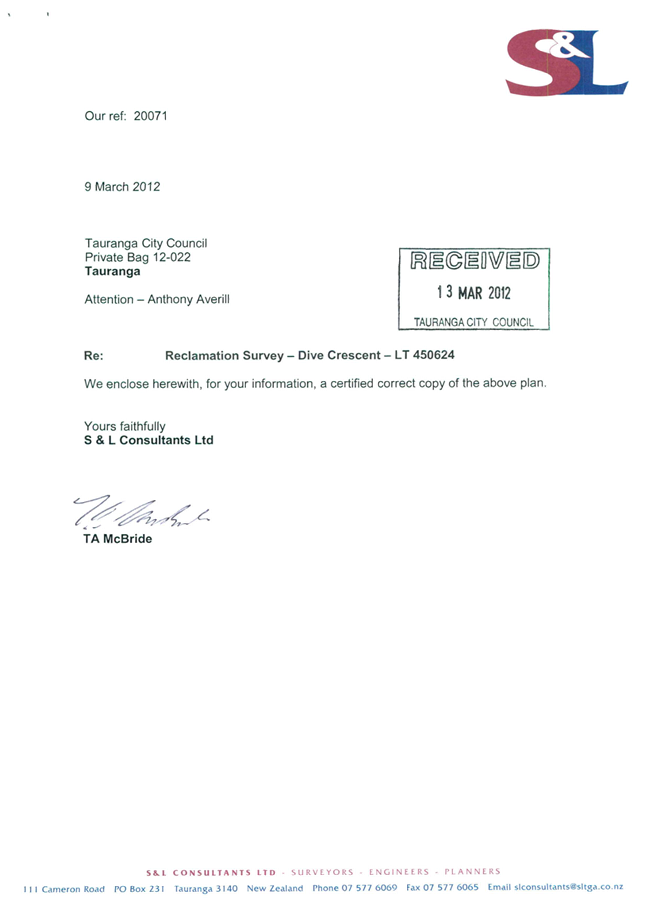
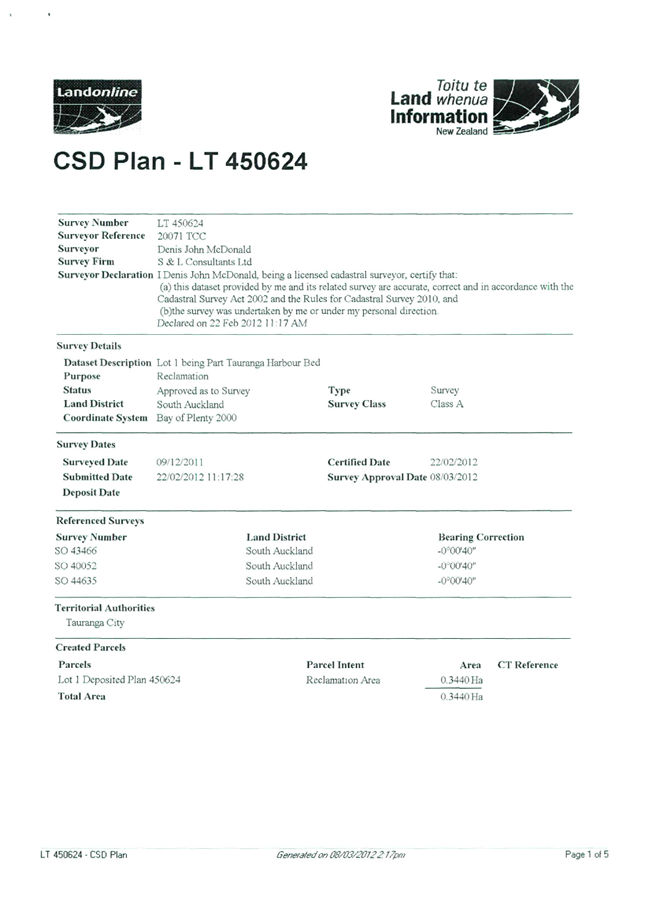
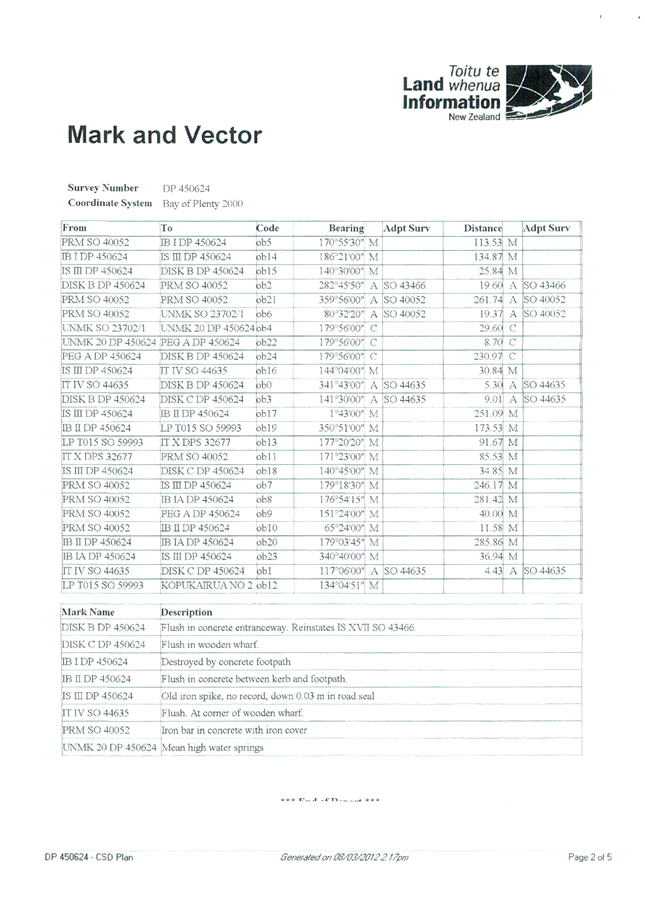

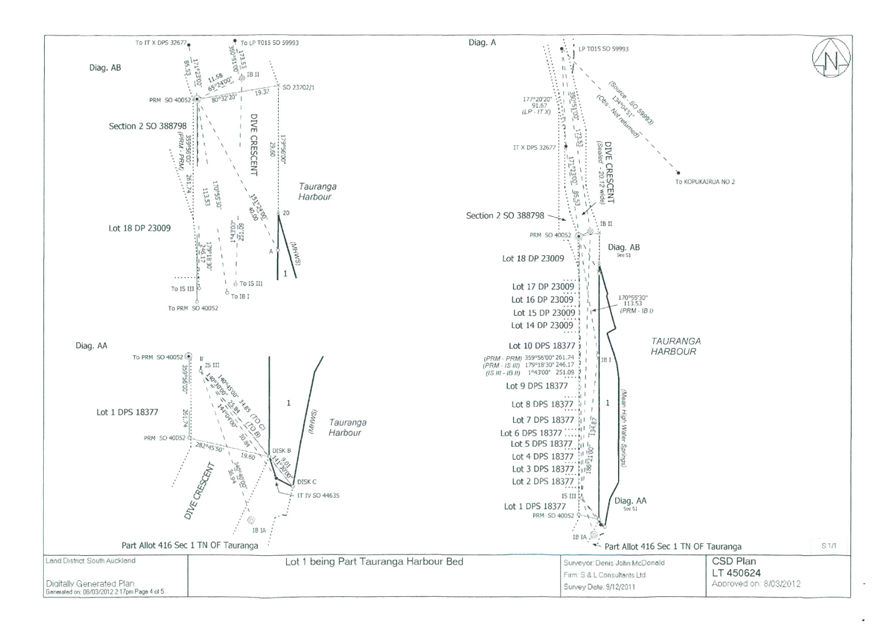

11.8 Governance
Structure - establish a Regulatory Hearings Panel and make appointments to
governance groups, funding panels and organisations
File
Number: A12243636
Author: Coral
Hair, Manager: Democracy Services
Cindy Gillman-Bate, Corporate
Solicitor
Authoriser: Susan
Jamieson, General Manager: People & Engagement
Purpose of
the Report
1. The purpose of this
report is to establish a Regulatory Hearings Panel and make appointments to
governance groups, funding panels and organisations.
|
Recommendations
That the Council:
(a) Receives the report
“Governance Structure – establish a Regulatory Hearings Panel and
make appointments to governance groups, funding panels and
organisations.”
(b) Pursuant to clause 30(1)(a)
Schedule 7 of the Local Government Act 2002, establishes a Regulatory
Hearings Panel as a subordinate decision-making body (that is neither a
committee nor subcommittee) of the Council.
(c) Adopts the Terms of
Reference for the Regulatory Hearings Panel in Attachment 1 and delegates to
it the role, scope and powers specified therein (pursuant to clause 32 Schedule
7 of the Local Government Act 2002).
(d) Appoints three members to
the Regulatory Hearings Panel, after considering the candidates in the public
excluded part of the agenda and releases those names into the public arena
once the members have been advised of their appointment. The members
appointed will be external independent persons with the skills, attributes or
knowledge that will assist the work of the panel.
(e) Appoints the following persons
as the Tauranga City Council representatives/members to these governance
groups, funding panels and external organisations instead of the Tauranga
City Council elected members who were discharged from these
groups/organisations on 22 February 2021. The staff appointees to the Event
Funding Panel and Community Development Match Fund Panel are delegated the
authority specified.
|
Group/organisation
|
Membership on behalf of Tauranga City Council
|
|
Dive Crescent Governance Group
|
Commissioner Shadrach Rolleston
Commissioner Bill Wasley
|
|
Omanawa Project Governance Group
|
Director of Spaces and Places
Manager: Strategic Māori Engagement
|
|
Tauranga Western Bay Safer Communities
|
General Manager: Community Services
(assumes Chairperson role)
Alternate: Team Leader: Community
Development
|
|
Event Funding Panel
|
General Manager: Community Services
(assumes Chairperson role)
Manager: Venues and Events
Council subject matter expert(s)
dependent on genre/type/nature of event.
(The two Council representatives/members appointed above
are delegated authority to appoint, by consensus, an appropriate expert or
experts to the Panel on a per event basis).
|
|
Community Development Match Fund Panel
|
Manager: Community Partnerships
Team Leader: Community Development
The three existing external appointees
(one each from TECT, Bay Trust and Acorn Foundation) are reconfirmed.
The Manager: Community Partnerships is
delegated authority to approve small grants of up to $1,000 with the number
of grants approved not to exceed the total amount budgeted annually for
small grants.
|
|
Tauranga Creative Communities Scheme Funding Panel
|
Manager: Arts and Culture
|
(f) In respect of each of
the Tauranga City Council staff appointees specified in resolution (e), if
their position title changes or their position is disestablished, a staff
member who performs or exercises the same or substantially similar role or
function to that position will, upon confirmation by the Chief Executive, be
deemed to be the Council’s appointee to the group/panel/organisation
without further resolution of the Council being required.
(g) Adopts the amended Terms of
Reference for the Event Funding Panel and the Community Development Match
Fund Panel as set out in Attachment 3, and delegates to them the role, scope
and powers specified therein (pursuant to clause 32 Schedule 7 of the Local
Government Act 2002).
(h) Removes the Event Funding
Panel and the Community Development Match Fund Panel from the Governance
Structure Terms of Reference and includes information on these panels on the
relevant pages of the Tauranga City Council’s website.
(i) Approves the amended
Terms of Reference for the Dive Crescent Governance Group as marked-up in
Attachment 4, and recommends these amendments be referred to the
Group’s next meeting for agreement along with a recommendation that the
Group consider meeting quarterly or as required.
|
Executive Summary
2. This
is a follow-up report to the Governance Structure report presented on 22
February 2021.
3. A
Regulatory Hearings Panel is recommended to be established to hear all
regulatory matters that can be delegated to it, apart from RMA and sale of
alcohol hearings.
4. It
is recommended that Commissioners be appointed to the Dive Crescent Governance
Group and that staff members are appointed to the other groups and funding
panels.
5. Some
minor amendments to the Terms of Reference for the Dive Crescent Governance
Group, the Event Funding Panel and the Community Development Match Fund Panel
are also recommended.
Strategic / Statutory Context
Regulatory Hearings Panel
6. The Council
resolved on 22 February 2021 to discharge the Regulatory Hearings
Committee. The proposed Regulatory Hearings Panel is the recommended
replacement for that committee.
7. The recommendation
to establish a Regulatory Hearings Panel that is neither a committee nor
subcommittee of the Council is based on the following considerations.
8. Committees and
subcommittees of the Council are a subset of the term
“subordinate-decision making body”. Clause 30 (1) (a) of Schedule 7
of the Local Government Act 2002 (LGA) empowers the Council to establish other
types of subordinate decision-making bodies that are neither committees nor
subcommittees of the Council.
9. The Schedule 7 LGA
requirements relating to committees and subcommittees do not apply to these
other types of subordinate decision-making bodies. As such, a Commissioner will
not need to be appointed to the proposed Regulatory Hearings Panel (as would be
the case if it was to be established as a committee of the Council by clause
31(4) (a)). The constraint against the appointment of an employee of Council
contained in clause 31 (4) (b) of Schedule 7 is also not applicable.
10. Pursuant to clause 32 (1) of
Schedule 7 of the LGA, the Council may (unless expressly provided otherwise in
the LGA or any other Act) delegate to these other types of subordinate
decision-making bodies any of its responsibilities, duties or powers except for
certain specified exceptions. Subordinate decision-making bodies that are
delegated authority to conduct hearings are often called hearings panels.
11. We have received legal advice
that it is appropriate to delegate the hearings and decision-making role for
regulatory matters (excluding Resource Management Act 1991 and sale of alcohol
matters) (that were previously delegated to the Regulatory Committee) to the
Regulatory Hearings Panel as set out in its recommended terms of reference in
Attachment 1.
12. The Terms of Reference also
grant the Panel the ability to make recommendations to the Council if it
considers it is appropriate to do so.
13. The Council’s Standing
Orders, as adopted, will apply to the Regulatory Hearings Panel because it will
have the power to make decisions on behalf of Council. It is noted that
if a standing order is specific to a committee or a subcommittee, it will not
apply to the panel.
14. Standing Order 3.6 also allows
meeting procedures to be amended for quasi-judicial proceedings and will apply
to regulatory hearings of the panel. The panel’s proposed Terms of
Reference delegate authority to the panel to establish and amend hearings
protocols in accordance with the applicable legislation and the principles of
administrative law and natural justice. Hearings protocols will be
developed and recommended to the panel for adoption at its first hearing.
15. The position description for
the Panel Members is set out in Attachment 2. The Chief Executive approached
suitable candidates who met the position description attributes and is recommending
the appointment of three members. Information on the proposed panel members is
set out in the public excluded part of the agenda and once the decision has
been made to appoint the panel members, and they have accepted the appointment,
their names will be released publicly.
16. It is recommended that the
Chief Executive be given delegated authority to determine the contractual terms
and conditions of appointment and the remuneration of the Panel members.
GOVERNANCE GROUPS
Dive Crescent Governance Group
(DCGG)
17. On 20 May 2010, Tauranga City
Council (TCC) signed a Memorandum of Understanding (MOU) with the
Otamataha Trust (the Trust) confirming the aspiration to apply for joint
ownership and management of a portion of reclaimed land along Dive Crescent,
approximately 3440 m2 as shown in Figure 1 in the Terms of Reference
(TOR) in Attachment 4.
18. The
MOU between TCC and the Trust provides that a formal governance group will be
established for the purpose of dealing with the management and development of
the land. The Trust stakeholders include Ngāti Tapu and Ngai Tamarawaho.
19. The
reclamation land does not yet have a certificate of title. This is discussed in
a separate report on this agenda.
20. The
DCGG has been working towards the development of a joint management agreement
between the Trust and TCC to progress development of the land once title is
issued that includes civic, commercial and cultural objectives.
21. Once the joint management
agreement is in place, the DCGG may decide to disestablish in lieu of forming a
management group as dictated by the joint management agreement, or the DCGG may
continue if it decides that the structure is sufficient for future management.
This is stipulated in the current Terms of Reference (TOR).
22. An amended version of the TOR
was approved by Council’s City Transformation Committee and subsequently
adopted by the DCGG at its meeting on 31 July 2017. However, prior to
adopting the TOR, the DCGG agreed to appoint an independent chairperson rather
than the co-chairing arrangement detailed in the draft TOR that was presented
to them for adoption. At the same meeting, Alan Tate was nominated and
appointed as the independent chairperson. To the knowledge of staff, an
updated version of the TOR was not created to reflect this change.
23. It is noted
that the version of the DCGG TOR in the Tauranga City Council Governance
Structure Terms of Reference and Delegations Manual that was presented to
Council on 22 February 2021 was the previous version that was superseded by the
current version adopted by the DCGG on 31 July 2017.
24. The marked-up changes to the
DCGG TOR in Attachment 4 indicate the suggested amendments to the current (31
July 2017) version. The recommended changes are:
a) Changes
to clauses 8 and 16 to reflect the DCGG’s 31 July 2017 decision to
appoint an independent chair, instead of a co-chairing arrangement.
b) Including
the standard table at the start of the TOR detailing the chairperson, members,
quorum and meeting frequency. The quorum specified in the table is
consistent with clause 13. The Otamataha Trust members and the independent
chair are those already appointed to the DCGG, with the Council members updated
as recommended in this report. This table includes the recommendation (to be
discussed with the DCGG) that the DCGG meet quarterly or as required.
c) Replacing
the reference in clause 23 to the disestablished City Transformation Committee,
with “the Council (governing body) or a relevant Standing Committee or
Subcommittee”.
25. If approved
by the Council, these amendments will be recommended to the next meeting of the
DCGG for agreement. As per clause 25, the DCGG can agree to amend the TOR
at any of its meetings.
26. Previously
two councillors were appointed to the DCGG and the TOR state that two elected
members (with experience in the areas of economic development and investment,
strategic planning and urban design), must be appointed to represent TCC
(clause 10 and 11).
27. It is
therefore recommended that Commissioners Shadrach Rolleston and Bill Wasley be
appointed to the DCGG to represent TCC to progress the development of the joint
management agreement and obtaining joint title of the land.
28. Reporting
on the Dive Crescent land will come through to the Council.
Omanawa Project Governance Group
29. The Omanawa Falls area falls
within the rohe of the hapu of Ngāti Hangarau and iwi of Ngāti
Ranginui and is part of an area with significant historic, ecological and
cultural features, located in the lower Kaimai area within the Western Bay of
Plenty District Council area. Tauranga City Council owns 6.6154 hectares
of land at 1031 and 1041 Omanawa Falls Road and it is managed in association
with McLaren Falls Park. The Falls and Omanawa River are administered by the
Bay of Plenty Regional Council.
30. There is currently no safe
access to the site and public access is currently restricted. Despite this, the
public still access the reserve, the pool and the waterfall (at peak periods up
to 300 people per day have been estimated to visit the Falls). A number of
serious injuries and two fatalities have occurred. Since December 2020, in
conjunction with TCC, Ngāti Hangarau have provided a physical kaitiaki
presence at the site to educate and deter people from visiting the Falls.
31. In
response to the situation, the Omanawa Project Governance
Group (OPGG) was established with partners Ngāti Hangarau and
Tourism Bay of Plenty, working together to deliver culturally and physically
safe access to the site. OPGG is also considering Ngāti Hangarau’s
aspiration for the return of the land.
32. The
OPGG membership includes two members from Ngāti Hangarau, one from Tourism
BOP, previously two councillors from TCC, and two staff from TCC, the General
Manager: Community Services and Manager: Strategic Maori Engagement.
33. It is
recommended that TCC representatives on the OPGG are the Manager: Strategic Māori Engagement and the
Director of Spaces and Places. Ngāti Hangarau and Tourism BOP have
been consulted on this change in TCC representation and agree that two staff
members from TCC is sufficient TCC representation on the OPGG.
34. Reporting
on the Omanawa project will come through to the Council or relevant standing
committee.
SAFER COMMUNITIES
Tauranga Western Bay Safer
Communities
35. Tauranga
Western Bay Safer Communities (TWBSC) is a joint Tauranga City and Western Bay
district programme that advocates and enables safety, injury and violence
prevention initiatives at community level. In 2008, Tauranga received formal
designation as an International Safe Community; administered by the Safe
Communities Foundation NZ. Western Bay of Plenty District Council joined the
programme in 2014.
36. One
elected member represented Tauranga City Council on the TWBSC with that
representative appointed as the Chair under the TOR. Membership of the TWBSC
includes the following:
· Tauranga
City Council
· Western
Bay of Plenty District Council
· Bay of Plenty
District Health Board
· New Zealand Police
· Fire and Emergency
New Zealand
· Bay of Plenty
Regional Council
· Emergency
Management
· Department of
Corrections
· Family Works
(TMAPS)
· Te
Rūnanga o Ngāi Te Rangi Iwi Trust
37. The
TWBSC met on 5 March 2021 and members advised that they were comfortable with
TCC staff representation on the TWBSC.
38. TWBSC’s Terms of
Reference specify additional roles, responsibilities and decision-making
tasks that TCC agreed to take on, which include acting as Chair of the
group. It is recommended that the General Manager: Community Services be
appointed as the TCC representative on the TWBSC and will continue to chair the
meetings. It is also recommended that the Team Leader: Community Development be appointed as the alternate
TCC representative.
39. Reporting on the TWBSC will
come through either the Chief Executive’s report or as a separate report
to Council or relevant standing committee.
FUNDING PANELS
Events Funding Panel
40. On 19 July 2018, Council
adopted an Event Funding Framework (EFF) – a strategic model to guide
Council’s investment in events and provide financial support to events
that champion Council’s event funding values and priorities. The EFF was
designed to be a responsive and customer-focused funding model, capable of
adapting over time as the needs and priorities of the city inevitably evolve.
41. Two decision-making panels
were established to consider applications submitted under four funds as
follows:
|
Fund
|
Maximum Grant (excl. GST)
|
Decision-making Panel
|
|
Community Event Fund
|
$4,000 per event
|
Council EFF Officers*
|
|
Event Support Fund
|
$15,000 per event
|
|
Legacy Event Fund
|
$100,000 per event
|
Event Funding Panel^
|
|
Major Event Fund
|
$100,000** per event
|
*
Manager: Venues and Events, Event Development Manager and Event Facilitation
Manager, or similar roles.
^
Four Elected Members and Chief Executive representative.
**
In exceptional circumstances this can be increased at the discretion of the
Event Funding Panel.
42. Subject to confirmation
through the LTP, an amount of $1.075 million is proposed to be reinstated and
available to support events across the city with approximately 60% going to the
Legacy and Major Event Funds.
43. Previously there were five
members appointed to the Event Funding Panel (EFP) consisting of four elected
members (with an alternate member) and the Chief Executive Representative.
44. As the EFP is a subordinate
decision-making body of the Council that is neither a committee or
subcommittee, no elected member (Commissioner) appointments to the panel are
required, and staff appointments may be made (for the same reasons outlined in
the Regulatory Hearings Panel section of this report).
45. In order to more appropriately
reflect the nature and scale of the financial decisions being made, empower
staff and facilitate some process efficiencies, it is recommended that the
current EFP membership be replaced with three staff members:
· General Manager:
Community Services (assumes Chairperson role)
· Manager: Venues
and Events
· Council subject
matter expert or experts dependent on genre/type/nature of event. This person would be chosen by the other two members
depending on the event e.g. if it’s an arts event being considered then
the Manager: Arts and Culture would be invited to join the EFP to assess that
particular application. If it’s a sporting event, the appropriate person
from the Spaces & Places division would be invited, and if there is a
complex and significant application there may be more than one expert
appointed.
46. The standard conflict of
interest rules would apply to any members of the EFP. It would meet six monthly
or as required to take advantage of any unforeseen event opportunities and also
expediate time-sensitive decisions, if necessary.
47. The current terms of reference
(TOR) for the EFP were approved by the Council on 22 February 2021. Some minor
changes are proposed in Attachment 3 to reflect the new Panel. It is
recommended the EFP be removed from the Governance Structure. Information and
the TOR will be included on the EFP page of the TCC website.
48. Reporting on the EFP will come
through either the Chief Executive’s report or as a separate report to
Council or relevant standing committee.
Community Development Match Fund Panel
49. This
fund was established in 2014 for the Council to provide Match Fund grants to
community projects that improve social, cultural and environmental wellbeing as
expressed through the Principles of Support and Priority Communities. Refer to
the website for further details. https://www.tauranga.govt.nz/Portals/0/data/community/community_dev_match_fund/files/match-fund-guidelines.pdf
50. There
are small and medium grants available:
· Small grants of up
to $1,000 (community groups can apply any time) are considered by the Community
Development Team and currently these are signed off by the General Manager:
Community Services. It is recommended that these be approved by the
Manager: Community Partnerships.
· Medium grants of
up to $10,000 are considered by an assessment panel with applications due in by
31 May and 10 November.
51. There is $20,000 provided each
financial year for the small grants fund and $80,000 for medium grants. The
Panel used to report annually to the now disestablished Projects, Services and
Operations Committee and it is recommended the Panel report annually to the
Council or relevant standing committee.
52. As the Panel is a subordinate
decision-making body of the Council that is neither a committee or
subcommittee, no elected member (Commissioner) appointments to the panel are
required, and staff and external appointments may be made (for the same reasons
outlined in the Regulatory Hearings Panel section of this report).
53. Panel members previously
included two elected members along with one staff member from TECT, Bay Trust
and Acorn Foundation. Having other funding bodies present has provided useful
insights and made connections to refer some applicants to other funding options
and it is recommended that these external members continue.
54. In order to more appropriately
reflect the nature and scale of the financial decisions being made, empower
staff and facilitate some process efficiencies, it is recommended that:
(a) the Manager: Community
Partnerships approve small grants of up to $1,000
(b) that the following two staff
members be appointed to replace the two TCC elected members on the assessment
panel to assess medium grants of up to $10,000:
· Manager: Community
Partnerships
· Team Leader:
Community Development
55. The current terms of reference
(TOR) for the Community Development Match Fund Panel were approved by the
Council on 22 February 2021. Some minor changes are proposed in Attachment 3 to
reflect the new Panel. It is recommended the Community Development Match Fund
Panel be removed from the Governance Structure. Information and TOR will be
included on the Panel’s page on the TCC website.
Tauranga Creative Communities Scheme Funding Panel
56. Creative New Zealand spends over $3.2 million each year supporting
around 1,800 projects nation-wide through the Creative Communities Scheme
(CCS). Creative Bay of Plenty, on behalf of Tauranga City Council (TCC) and
Western Bay of Plenty District Council, administers the CCS for our districts.
The scheme aims to increase participation from the local community in the arts
sector, support the diversity of local cultural traditions and encourage and
engage young people to participate in local arts. The term ‘arts’
is broadly defined to mean all forms of creative and interpretative expression.
57. The Council enters into a
funding agreement with Creative New Zealand to receive the CCS funding (the
current agreement expires on 30 June 2022). The funding agreement permits
Council to sub-contract to a third-party (Creative Bay of Plenty) to administer
the Scheme on Council’s behalf, including forming an assessment committee
(i.e. the Tauranga CCS Funding Panel) for the allocation of CCS funds. Council
has a separate funding agreement with Creative Bay of Plenty covering this
sub-contracting arrangement (expiring on 30 June 2021). Under
Council’s agreement with Creative NZ, Council remains responsible for the
acts or omissions of its sub-contractor, Creative Bay of Plenty, in relation to
administration of the CCS Scheme.
58. Two rounds of CCS funding are
allocated each year. Once applications for a funding round close, the
Tauranga CCS Funding Panel assesses the applications received for projects that
fall within Tauranga City Council’s limits and decides which projects
will receive funding, and how much money will be granted. There is a
separate Western Bay CCS Funding Panel (with different members) that assesses
applications for projects that fall within the Western BOP District
Council’s limits.
59. The Council previously
appointed two councillors, and one TCC staff member, to represent TCC on the
Tauranga CCS Funding Panel. The councillors ceased to act as members of
the Panel when the Commission was appointed. The current TCC staff
appointee is the Manager: Arts & Culture (who is also the Deputy
Chairperson of the Panel). There are also currently four independent persons
appointed from the community who have the skills, attributes or knowledge to
assist the work of the Panel. The Governance Structure for TCC does not
include the terms of reference for this Panel.
60. Although the Council’s
funding agreement with Creative New Zealand specifies some requirements
relating to the assessment committee, there is no requirement for elected
member representation on it. The agreement requires that the assessment
committee is reflective of the diversity of the local communities that the
Council represents (irrespective of age, gender, ethnic affiliations, physical
or other disability, sexual orientation or religion) and includes at least one
person of Māori descent,
with knowledge of the local Māori
arts activity and knowledge of local Māori
communities.
61. Creative Bay of Plenty report
to the Council on a regular basis. The Manager: Arts and Culture currently sits
on the Panel and provides the linkage and relationship with TCC.
62. Given that there is one
funding round that is remaining under the existing agreement with Creative Bay
of Plenty before this is reviewed, and that TCC currently has representation on
the Panel, it is recommended that no new appointments be made to the Panel on
behalf of TCC at this stage.
63. Creative Bay of Plenty may, at
its option, choose to co-opt two community members to replace the two
councillors for the one remaining funding round (if they decide seven members
are necessary) or proceed with the remaining five members. If they
choose to co-opt two other members, this will require agreement of a quorum of
the Tauranga CCS Panel.
Financial Considerations
64. There are no financial impacts
on the changes to the Governance Structure. Any remuneration would come from
existing budgets and has been budgeted for.
Legal Implications / Risks
65. Legal advice has been sought
in relation to the establishment of the Regulatory Hearings Panel.
Significance
66. The Local Government Act 2002
requires an assessment of the significance of matters, issues, proposals and
decisions in this report against Council’s Significance and Engagement
Policy. Council acknowledges that in some instances a matter, issue, proposal
or decision may have a high degree of importance to individuals, groups, or
agencies affected by the report.
67. In making this assessment,
consideration has been given to the likely impact, and likely consequences for:
(a) the current and future social,
economic, environmental, or cultural well-being of the district or region
(b) any
persons who are likely to be particularly affected by, or interested in, the
issue, proposal, decision, or matter
(c) the
capacity of the local authority to perform its role, and the financial and
other costs of doing so.
68. In accordance with the
considerations above, criteria and thresholds in the policy, it is considered
that the decision is of low significance.
ENGAGEMENT
69. Taking into consideration the
above assessment, that the decision is of low significance, officers are of the
opinion that no further engagement is required prior to Council making a
decision.
70. Members, groups and
organisations impacted by this decision have been consulted.
Click here to
view the TCC
Significance and Engagement Policy
Next Steps
71. Advise appointees to the
Regulatory Hearings Panel, and Chief Executive to agree with them the
contractual terms, conditions and remuneration of their appointment.
72. Inform the affected groups and
organisations.
73. Update Governance Structure
Terms of Reference.
74. Update TCC website.
Attachments
1. Regulatory
Hearings Panel Terms of Reference - A12297167 ⇩ 
2. Regulatory
Hearings Panel Position Description - A12289777 ⇩ 
3. Event Funding
Panel and Community Development Match Fund Panel Terms of Reference - A12313383
⇩ 
4. Dive Crescent Governance
Group Terms of Reference - A12326375 ⇩ 
|
Ordinary Council
Meeting Agenda
|
29 March 2021
|
|
Regulatory Hearings Panel
|
Membership
|
Chairperson
|
To
be appointed
|
|
Members
|
To
be appointed
|
|
Quorum
|
At least 2 members
|
|
Meeting
frequency
|
As required
|
Role
· To conduct hearings and make decisions
of a quasi-judicial nature on regulatory matters through specific hearings and
decision making.
Scope
Regulatory
matters
· To conduct hearings and make decisions
of a quasi-judicial nature on behalf of the Council on any regulatory matter
that the Council is legally:
o empowered
or obligated to hear and determine;
o permitted
to delegate to a subordinate decision-making body of Council under the Local
Government Act 2002, or any other Act.
· To exercise this function in
accordance with:
o the
applicable legislation;
o the
Council’s corporate strategies, policies, plans and bylaws; and
o the
principles of administrative law and natural justice.
· Regulatory matters include (but are
not limited to):
o dog control matters;
o matters arising from the exercise of
Council’s enforcement functions; and
o regulatory matters that require a
hearing under Council’s policies (including, without limitation,
Council’s Gambling Venues Policy) and bylaws.
Matters
excluded from scope
· The following are excluded from the
scope of the Regulatory Hearings Panel:
o matters relating to the sale and
supply of alcohol;
o matters under the Resource Management
Act 1991; and
o matters the Council is precluded from
delegating to a subordinate decision-making body by the Local Government Act
2002, or any other Act.
Power to Act
Regulatory
matters
· All powers, duties and discretions necessary
to conduct hearings and make decisions of a quasi-judicial nature on behalf of
the Council on any regulatory matter that the Council is legally empowered or
obligated to hear and determine, including (but not limited to):
o All
powers, duties and discretions necessary to hear and make decisions on behalf
of the Council in respect of any matter that the Council is empowered or
obligated to hear and determine under the Dog Control Act 1996, the Local
Government Act 2002, the Local Government Act 1974 and any regulatory matters
that require a hearing under Council’s policies and bylaws.
· For the avoidance of doubt, the above
delegation includes authority to hear and make decisions on appeals under
Council’s Gambling Venues Policy, including to decline an application to
appeal.
· The power to establish and amend
hearings protocols relating to the general conduct of hearings and hearings
related matters in accordance with the applicable legislation and the
principles of administrative law and natural justice.
· The power to co-opt expert advice on
an as required basis.
Matters
excluded from power to act
· For the avoidance of doubt, the
Regulatory Hearings Panel does not have the power to hear:
o matters relating to the sale and
supply of alcohol;
o matters under the Resource Management
Act 1991; or
o matters that the Council is precluded
from delegating to a subordinate decision-making body by the Local Government
Act 2002, or any other Act.
Power to Recommend
· The Regulatory Hearings Panel is
unlikely to need to make recommendations to the Council as it has the power to
conduct hearings and make decisions of a quasi-judicial nature on behalf of
Council as per its powers to act. However, the Panel may make
recommendations to the Council if, in the circumstances of a matter, it
considers it appropriate to do so.
Note: The
Regulatory Hearings Panel is established as a subordinate decision-making body
of Council and delegated the powers specified in its Terms of Reference under
clauses 30 and 32 of Schedule 7 Local Government Act 2002 respectively.
It is not a committee or subcommittee of Council.
|
Ordinary Council Meeting Agenda
|
29 March 2021
|
Position
outline: Regulatory Hearings Panel Member
|
1.1 Title
|
2.1
Regulatory Hearings Panel
Member
|
|
3.1 Date
|
4.1 02/03/2021
|
Regulatory
Hearings Panel
Role
· To
conduct hearings and make decisions of a quasi-judicial nature on regulatory
matters through specific hearings and decision making.
Scope
Regulatory
matters
· To
conduct hearings and make decisions of a quasi-judicial nature on behalf of the
Council on any regulatory matter that the Council is legally:
o empowered
or obligated to hear and determine;
o permitted
to delegate to a subordinate decision-making body of Council under the Local
Government Act 2002, or any other Act.
· To
exercise this function in accordance with:
o the
applicable legislation;
o the
Council’s corporate strategies, policies, plans and bylaws; and
o the
principles of administrative law and natural justice.
· Regulatory
matters include (but are not limited to):
o dog
control matters;
o matters
arising from the exercise of Council’s enforcement functions; and
o regulatory
matters that require a hearing under Council’s policies (including,
without limitation, Council’s Gambling Venues Policy) and bylaws.
Matters
excluded from scope
· The
following are excluded from the scope of the Regulatory Hearings Panel:
o matters
relating to the sale and supply of alcohol;
o matters
under the Resource Management Act 1991; and
o matters
the Council is precluded from delegating to a subordinate decision-making body
by the Local Government Act 2002, or any other Act.
Power to Act
Regulatory
matters
· All
powers, duties and discretions necessary to conduct hearings and make decisions
of a quasi-judicial nature on behalf of the Council on any regulatory matter
that the Council is legally empowered or obligated to hear and determine,
including (but not limited to):
o All
powers, duties and discretions necessary to hear and make decisions on behalf
of the Council in respect of any matter that the Council is empowered or
obligated to hear and determine under the Dog Control Act 1996, the Local
Government Act 2002, the Local Government Act 1974 and any regulatory matters
that require a hearing under Council’s policies and bylaws.
· For
the avoidance of doubt, the above delegation includes authority to hear and
make decisions on appeals under Council’s Gambling Venues Policy,
including to decline an application to appeal.
· The
power to establish and amend hearings protocols relating to the general conduct
of hearings and hearings related matters in accordance with the applicable
legislation and the principles of administrative law and natural justice.
· The
power to co-opt expert advice on an as required basis.
Matters
excluded from power to act
· For
the avoidance of doubt, the Regulatory Hearings Panel does not have the power
to hear:
o matters
relating to the sale and supply of alcohol;
o matters
under the Resource Management Act 1991; or
o matters
that the Council is precluded from delegating to a subordinate decision-making
body by the Local Government Act 2002, or any other Act.
Power to Recommend
· The
Regulatory Hearings Panel is unlikely to need to make recommendations to the
Council as it has the power to conduct hearings and make decisions of a
quasi-judicial nature on behalf of Council as per its powers to act.
However, the Panel may make recommendations to the Council if, in the
circumstances of a matter, it considers it appropriate to do so.
Note: The Regulatory Hearings Panel is
established as a subordinate decision-making body of Council and delegated the
powers specified in its Terms of Reference under clauses 30 and 32 of Schedule
7 Local Government Act 2002 respectively. It is not a committee or
subcommittee of Council.
Frequency of meetings
· The
Regulatory Hearings Panel will meet as required. It is estimated that
there would be four hearings per annum.
Experience,
knowledge, qualifications
|
5.1 General Requirements
|
6.1 Description
|
|
7.1 Governance Experience
|
· Strong track record and/or understanding of
local government obligations and regulatory roles
· Previous experience in hearings processes
· Understands the regulatory framework in which
hearings are undertaken
· Maintains a reasonable working knowledge of
Council services, management processes, powers, duties and constraints
· Familiar with and complies with the statutory
requirements of a member including appropriate recordkeeping in accordance
with the Public Records Act 2005 and the requirements of the Local Government
Official Information and Meetings Act 1987
· Mediation and negotiation experience
|
|
8.1 Te Tiriti o Waitangi
|
· Understanding of, or a commitment to develop
capability, with respect to Te Tiriti o Waitangi
9.1
|
|
10.1 Relevant Technical Experience
|
· Knowledge and understanding of the local
government regulatory processes
· Proven experience in reviewing and analysing
reports and evidence
· The ability to ask relevant and pertinent
questions, and evaluate the answers
· Writing decisions
11.1
|
|
12.1 Legal
|
· Broad legal knowledge and relevant experience
of regulatory and hearings processes
13.1
|
Personal
Attributes
|
14.1 Personal Attributes
|
15.1 Description
|
|
16.1 Integrity
|
· High organisational and personal ethics
· Accepts collective responsibility and
confidentiality
· Identifies and declares any potential personal
conflicts of interest, whether of a pecuniary or non-pecuniary nature
17.1
|
|
18.1 Communication
|
· Listens actively and accurately, encourages
input from others and facilitates decision making in a reasoned and calm way
· Ability to communicate information and
decision making rationale in an articulate, fair and well considered manner
19.1
|
|
20.1 Decision Making
|
· Sophisticated, analytically based decision
making, intellectual rigour
· Broad perspective - both short and long term,
fully considers options
21.1
|
|
22.1 Teamwork/ Collaboration
|
· Works productively and openly with colleagues
· An appreciation of the public entity’s
culture, values and principles of openness and transparency and natural
justice, and a determination to uphold these
|
|
23.1 Geographic Considerations
|
· Prefer someone based in Tauranga/ Bay of
Plenty/Waikato/Auckland
|
|
Ordinary Council Meeting Agenda
|
29 March 2021
|
Event
Funding Panel and
Community Development Match Fund Panel
Terms of Reference - March 2021
Membership
|
Chairperson
|
General
Manager: Community Services*
|
|
Members
|
Manager:
Venues & Events*
Council
subject matter expert (s), dependent on genre/type/nature of event **
|
|
Quorum
|
Two members
|
|
Meeting
frequency
|
Six-monthly
with the ability to call meetings as required, to take advantage of any
unforeseen event opportunities and also expediate time-sensitive decisions,
as necessary.
|
*If this role
title changes or the position is disestablished, the staff member who performs
or exercises the same or substantially similar role or function to that
position will, after the Chief Executive has confirmed this, be deemed to be
the Council’s appointee to this panel without further resolution of the
Council being required.
**The General
Manager: Community Services and the Manager: Venues & Events are delegated
authority to appoint, by consensus, an appropriate expert or experts to the
Panel on a per event basis depending on the genre/type/nature of event e.g. if it’s an arts event being
considered then the Manager: Arts and Culture would be invited to join the EFP
to assess that particular application. If it’s a sporting event, the
appropriate person from the Spaces & Places division would be invited, and if there is a complex and significant application there
may be more than one expert appointed.
Role
· To assess applications for funding
made to Council’s Legacy Event Fund and Major Event Fund.
Scope
· Consider and decide on applications
for event funding made to Council’s Legacy Event Fund and Major Event
Fund.
· Undertake decisions in accordance with
Council’s Event Funding Framework (the Framework) and Council’s
event values and priorities.
· Follow the Framework’s
assessment processes and any fund-specific application criteria.
Power to Act
· Under Council’s Event Funding
Framework, the Event Funding Panel (the Panel) can make funding decisions for
the Legacy Event Funds and Major Event Fund.
· Decision making will be by consensus
with the Chairperson having a casting vote if a consensus cannot be reached.
· The Framework was adopted, and the
Panel was established by Council resolution M18/61.6 at the Council meeting
held on 19 July 2018. The Panel TOR and membership was updated by Council
resolution on 29 March 2021 (to be confirmed).
· The standard conflict of interest
rules apply to any members of the EFP.
Conflicts of Interest
· To guarantee that decision making by
the assessment panel is transparent and impartial, conflicts of interest must
be declared and handled appropriately.
· There are three types of conflict of
interest that might arise:
1. Direct conflict of interest;
2. Indirect conflict of Interest; and/or
3. Perceived conflict of Interest.
· The process for dealing with a conflict
of interest is, the panel member must:
o Declare
the conflict of interest as soon as he or she becomes aware of it;
o Not
assess the application; and
o Not
take part in the decision making process, leaving the room whilst the
deliberations and assessments take place.
The
administration of the fund is managed by Tauranga City Council and reports
annually to the Council.
The Panel TOR
and membership was updated by Council resolution on 29 March 2021 (to be
confirmed).
|
Community Development Match
Fund Panel
|
Membership
|
Members
|
Manager:
Community Partnerships (TCC)*
Team Leader:
Community Development (TCC)*
Margot
McCool (Acorn Foundation)
Sam Cummins
(Bay Trust)
Paula Hudson
(TECT)
|
|
Meeting
frequency
|
Six monthly
(June and December)
|
*If this role
title changes or the position is disestablished, the staff member who performs
or exercises the same or substantially similar role or function to that
position will, after the Chief Executive has confirmed this, be deemed to be
the Council’s appointee to this panel without further resolution of the
Council being required.
Background
1. The
Community Development Match Fund was established in 2014 for the Council
to provide Match Fund grants to community projects that improve social,
cultural and environmental wellbeing as expressed through the Principles of
Support and Priority Communities.
2. There
are small and medium grants available:
· Small grants of up to $1,000
(community groups can apply any time) are considered by the Community
Development Team and approved by the Manager: Community Partnerships.
· Medium grants of up to $10,000 are
considered by the Community Development Match Fund Panel (assessment
panel) with applications due in by 31 May and 10 November.
Role
· The main role of the assessment panel
is to assess applications and allocate funding in line with the key funding
criteria for the fund.
Scope
· The assessment panel will take into
consideration the criteria for each proposed project and determine if the
project meets one or more criteria, before allocating funds. The criteria are:
o Empowering
and building community capacity to enhance and strengthen neighbourhoods;
o Connecting
communities through working, playing and talking together;
o Renewing
and revitalisation of places and spaces within neighbourhoods; and
o Improving
the quality of life in a specific community or neighbourhood.
Process
· The Assessment Panel must read each
application, individually assess and mark each one using the Marking Sheet, prior
to the assessment meeting taking place. The applicant must meet all of
the following eligibility requirements:
o Provide
a public benefit
o Free
and open to members of the public;
o Initiated, planned and
implemented by members of the community who will benefit;
o Demonstrate community
match; and
o Occur within the Tauranga
City boundaries.
· The total mark for each application
will be totalled at the assessment committee meeting and divided by the number
of committee members who assessed the application in order to give an average
mark. This will allow for any conflicts of interest.
· Discussion of individual applications
will form an important part of the assessment process. The committee will focus
its discussions upon:
o What level of support there is among
committee members for those applications that scored highly on the assessment
scale.
o Which ‘middle ground’
applications (those with a mark between 11 and 15) should be given priority.
Conflicts of Interest
· To guarantee that decision making by
the assessment panel is transparent and impartial, conflicts of interest must
be declared and handled appropriately.
· There are three types of conflict of
interest that might arise:
1. Direct conflict of interest;
2. Indirect conflict of Interest; and/or
3. Perceived conflict of Interest.
· The process for dealing with a
conflict of interest is, the panel member must:
o Declare
the conflict of interest as soon as he or she becomes aware of it;
o Not
assess the application; and
o Not
take part in the decision making process, leaving the room whilst the
deliberations and assessments take place.
The
administration of the fund is managed by Tauranga City Council and reports
annually to the Council.
The Panel TOR
and membership was updated by Council resolution on 29 March 2021 (to be
confirmed).
|
Ordinary Council Meeting Agenda
|
29 March 2021
|
Dive
Crescent Governance Group Terms of Reference
March 2021
|
Dive Crescent Governance
Group (DCGG)
|
|
Chairperson
|
Alan Tate (Independent)
|
|
Members
|
Puhirake
Ihaka (Otamataha Trust)
Peri
Kohu (Otamataha Trust)
Commissioner
Shadrach Rolleston (TCC)
Commissioner
Bill Wasley (TCC)
|
|
Quorum
|
A
minimum of two members is required for quorum. However, this must comprise of
one member from the Trust and one member from TCC.
|
|
Meeting
frequency
|
Quarterly
or as required
|
Background
1. On
20 May 2010 Tauranga City Council (TCC) signed a Memorandum of Understanding
(MOU) with the Otamataha Trust (the Trust) confirming the aspiration to apply
for joint ownership and management of a portion of land along Dive Crescent
(the Land).
The
MOU between TCC and the Trust provides that a formal governance group will be
established for the purpose of dealing with the management and development of
the Land.
Objective
2. The
objective of the DCGG is to work towards establishing a joint management agreement
(the Agreement), which would be legally binding and would set out:
i The
guiding principles for long-term ownership
ii A
cost/profit sharing arrangement that reflects the joint land ownership and
existing future investment in the Land by either party
iii The
nature of development and permitted uses to occur on the Land
iv The
ownership and future management of the buildings on the Land
v The
agreed position, in terms of inclusion, with respect to the development of the
wider Dive Crescent area.
3. Once
the joint management agreement is in place, the DCGG may decide to disestablish
in lieu of forming a management group as dictated by the joint management
agreement, or the DCGG may continue if it decides that the structure is
sufficient for future management.
Scope
4. The
geographical scope is the seaward land at Dive Crescent depicted in Figure 1
below.


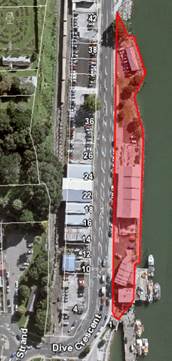
Figure 1 – The Land at Dive
Crescent
This
landward side of Dive Crescent (numbers 4-50) along with the Land has been
identified as a future development area via the City Centre Strategy 2012 and
the operative Tauranga City Plan.
5. The
technical scope of the DCGG is on the development of the Agreement between TCC
and the Trust. This Agreement shall allow TCC and the Trust to carry out the technical
assessment of all potential developments upon the land and their future
management. This will:
i. Enable
TCC and the Trust to jointly plan for, assess, and progress with developments
upon the land.
ii. Ensure
that any development of the land is aligned with TCC strategies and the
Trust’s strategies.
Structure
6. The
DCGG shall
represent the partnership between TCC and Trust and will therefore, in terms of
structure, be independent from any groups, committees or boards that exist
within TCC or the Trust.
7. There will be four
membership positions, two from the Trust and two from TCC. These four members
shall hold sufficient authority to progress the development of the Agreement.
8. The DCGG shall appoint an
independent chairperson to facilitate the meetings.
9. There is no restriction upon the
number of supporting staff and representatives that will support the four
members as part of the DCGG.
Dive Crescent Governance Group
10. The
two TCC membership positions will be allocated to two Elected Members who will
be able to develop a joint management agreement between the Trust and Council,
which will allow for strategic development and transformation of the Land. The
two allocated Elected Members shall be chosen by TCC and will be reviewed every
three years (in line with local elections).
11. The
two Elected Members will have experience in the following areas:
i. Economic
Development and Investment
ii. Strategic
Planning
iii. Urban
Design
12. The
two Trust membership positions shall be allocated to the representatives of
Ngāti Tapu and of Ngai Tamarawaho and shall be assigned and managed by the
Trust.
Attendance at DCGG
13. A minimum of two members is
required for quorum. However, this must comprise of one member from the Trust
and one member from TCC. Members may attend in person or by teleconference.
14. DCGG meetings will also
include attendance by supporting staff from TCC and the Trust when necessary
and required.
Process
15. DCGG
will meet at TCC offices or Trust offices on a bi-monthly basis. TCC will
provide a meeting schedule and notice of meetings as soon as practically
possible to members of the DCGG. Ad-hoc or more frequent meetings can be called
by the DCGG when required and appropriate.
16. The
independent chairperson is responsible
for running the meeting and composing and gaining approval for the DCGG
recommendations.
17. TCC staff will assist with setting the
agenda in consultation with the DCGG members for all DCGG meetings.
18. In advance of each meeting, the DCGG
members will be provided sufficient information on each agenda item, to enable
robust consideration and recommendations. Where the process includes relation
to a specific design brief, the DCGG will be provided with copies of that
brief. The information provided at meetings will be supplied by supporting
staff from the Trust or from TCC or via a collaboration between both.
19. All DCGG advice and
decisions will be formalised by meeting notes or minutes or, where decisions
are made on major matters, by a report. These minutes/reports are
confirmed by all DCGG members present at the meeting. Some decisions may need
to be escalated in terms of TCC’s level of delegation (see para 24).
20. TCC supporting staff will
coordinate and register required actions as a result of DCGG meetings into a
master schedule which will be shared with the Trust.
Managing potential conflicts of interest
21. Where a member of the DCGG has a private or
other interest in any potential development being considered for the Land that
may create a perceived conflict of interest, the potential conflict will be
declared and the DCGG member will step aside from any involvement in DCGG
discussion and recommendations on that project.
Interdependencies
22. The
landward side of Dive Crescent (numbers 4-50) along with the Land identified in
Figure 1 has been identified as a future development area via the City Centre
Strategy 2012 and the operative Tauranga City Plan.
23. TCC
plans to develop this area of the waterfront and will share any strategies,
masterplans and/or aspirations for the area to ensure the DCGG is aware of
TCC’s objectives and to facilitate discussion regarding development of
the Land whilst being cognisant of the wider context.
TCC specific processes
24. Whilst
the two TCC members will hold sufficient authority to progress Dive Crescent
matters, TCC must adhere to legislation when managing Council owned land
(whether that is land owned wholly or partially by TCC). This may require the
two TCC members to escalate decisions regarding the management and use of the
Land to a meeting of the Council(the governing body) or a relevant Standing
Committee or Subcommittee in order to proceed.
General
25.
The DCGG can agree to amend these Terms of Reference during any meeting
provided there is a quorum as defined at para 13.
13 Public
Excluded Session
RESOLUTION TO
EXCLUDE THE PUBLIC
|
Recommendations
That the public be excluded from the following parts of
the proceedings of this meeting.
The general subject matter of each matter to be considered
while the public is excluded, the reason for passing this resolution in
relation to each matter, and the specific grounds under section 48 of the
Local Government Official Information and Meetings Act 1987 for the passing
of this resolution are as follows:
|
General subject of each matter to be
considered
|
Reason for passing this resolution in
relation to each matter
|
Ground(s) under section 48 for the
passing of this resolution
|
|
13.1 - Public Excluded Minutes of the
Council Meeting held on 8 March 2021
|
s7(2)(a) - the withholding of the information is
necessary to protect the privacy of natural persons, including that of
deceased natural persons
s7(2)(g) - the withholding of the information is
necessary to maintain legal professional privilege
s7(2)(h) - the withholding of the information is
necessary to enable Council to carry out, without prejudice or
disadvantage, commercial activities
s7(2)(i) - the withholding of the information is
necessary to enable Council to carry on, without prejudice or disadvantage,
negotiations (including commercial and industrial negotiations)
s7(2)(j) - the withholding of the information is
necessary to prevent the disclosure or use of official information for
improper gain or improper advantage
|
s48(1)(a) - the public conduct of the relevant
part of the proceedings of the meeting would be likely to result in the
disclosure of information for which good reason for withholding would exist
under section 6 or section 7
|
|
13.2 - Public Excluded Minutes of the
Council Meeting held on 15 March 2021
|
s7(2)(i) - the withholding of the information is
necessary to enable Council to carry on, without prejudice or disadvantage,
negotiations (including commercial and industrial negotiations)
|
s48(1)(a) - the public conduct of the relevant
part of the proceedings of the meeting would be likely to result in the
disclosure of information for which good reason for withholding would exist
under section 6 or section 7
|
|
13.3 - Regulatory Hearings Panel
Members Appointment
|
s7(2)(a) - the withholding of the information is
necessary to protect the privacy of natural persons, including that of
deceased natural persons
|
s48(1)(a) - the public conduct of the relevant
part of the proceedings of the meeting would be likely to result in the
disclosure of information for which good reason for withholding would exist
under section 6 or section 7
|
|



































































































































































































